Introduction to Serverless PHP
A presentation at PHP Shropshire, April 2019 in in Telford, UK by Rob Allen

Introduction to Serverless PHP Rob Allen April 2019

Platform options Rob Allen ~ @akrabat

Platform options Rob Allen ~ @akrabat

Platform options Rob Allen ~ @akrabat

Platform options Rob Allen ~ @akrabat
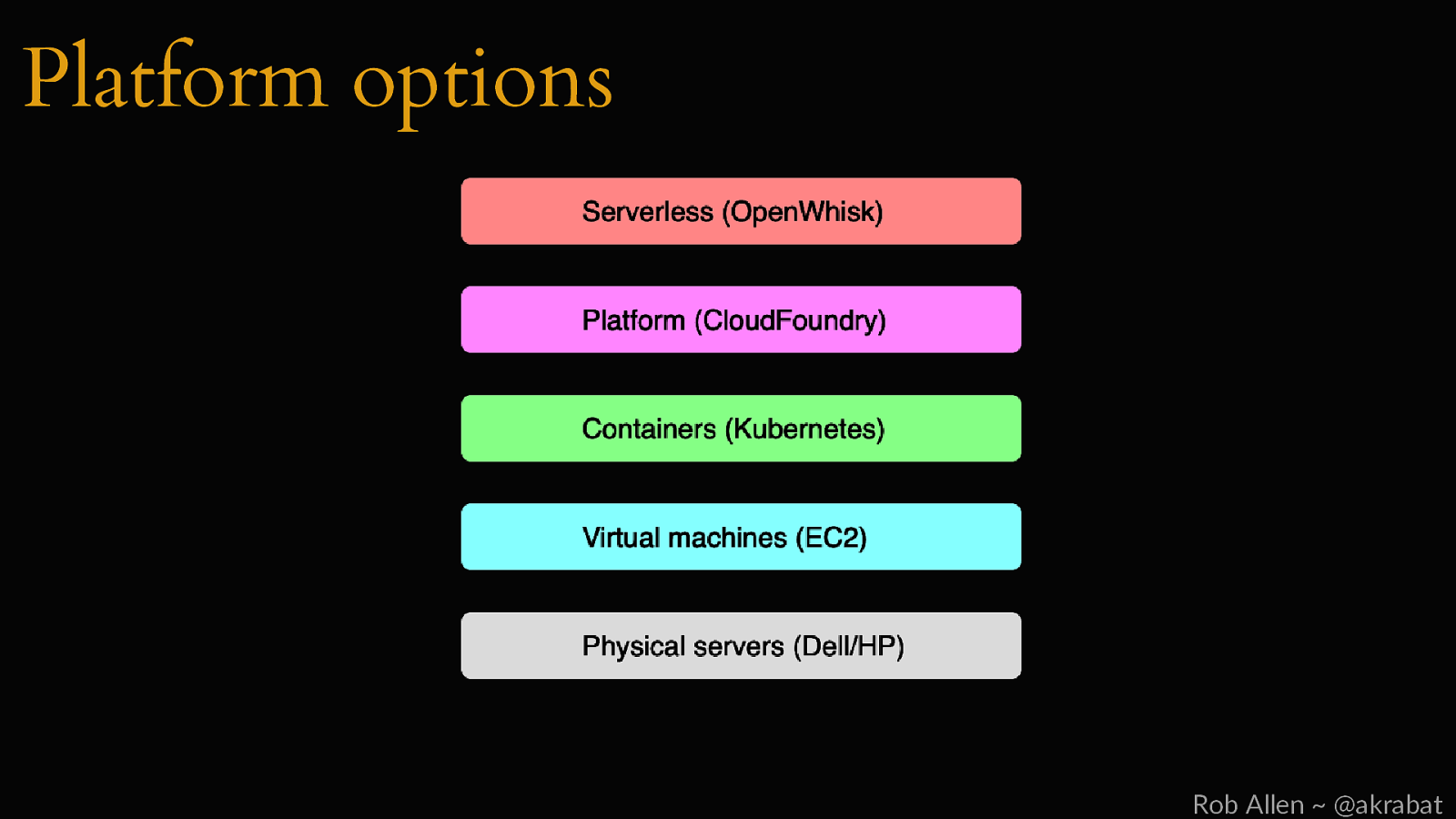
Platform options Rob Allen ~ @akrabat

Platform options Rob Allen ~ @akrabat

Platform options Rob Allen ~ @akrabat
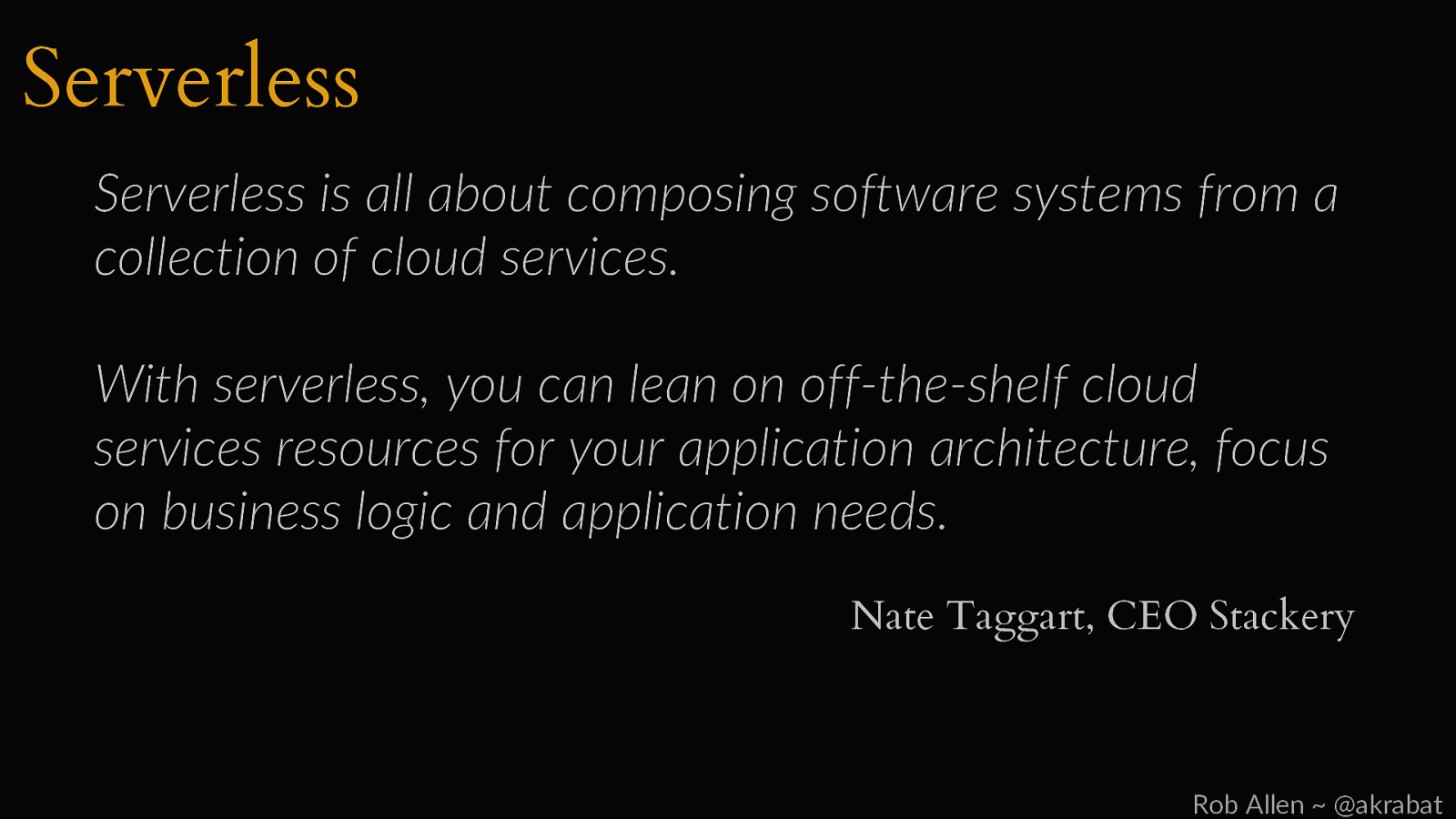
Serverless Serverless is all about composing software systems from a collection of cloud services. With serverless, you can lean on off-the-shelf cloud services resources for your application architecture, focus on business logic and application needs. Nate Taggart, CEO Stackery Rob Allen ~ @akrabat
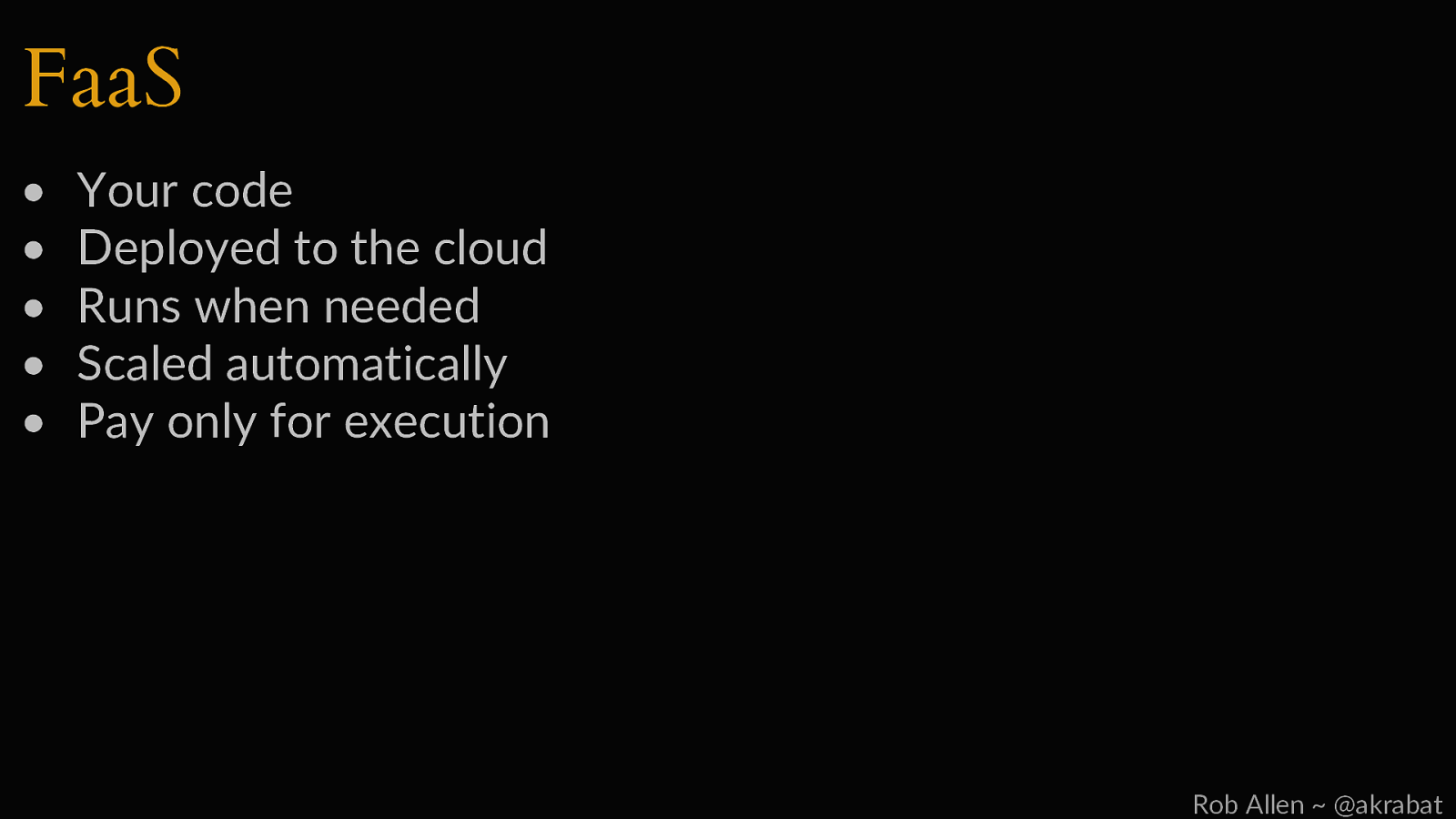
FaaS • • • • • Your code Deployed to the cloud Runs when needed Scaled automatically Pay only for execution Rob Allen ~ @akrabat
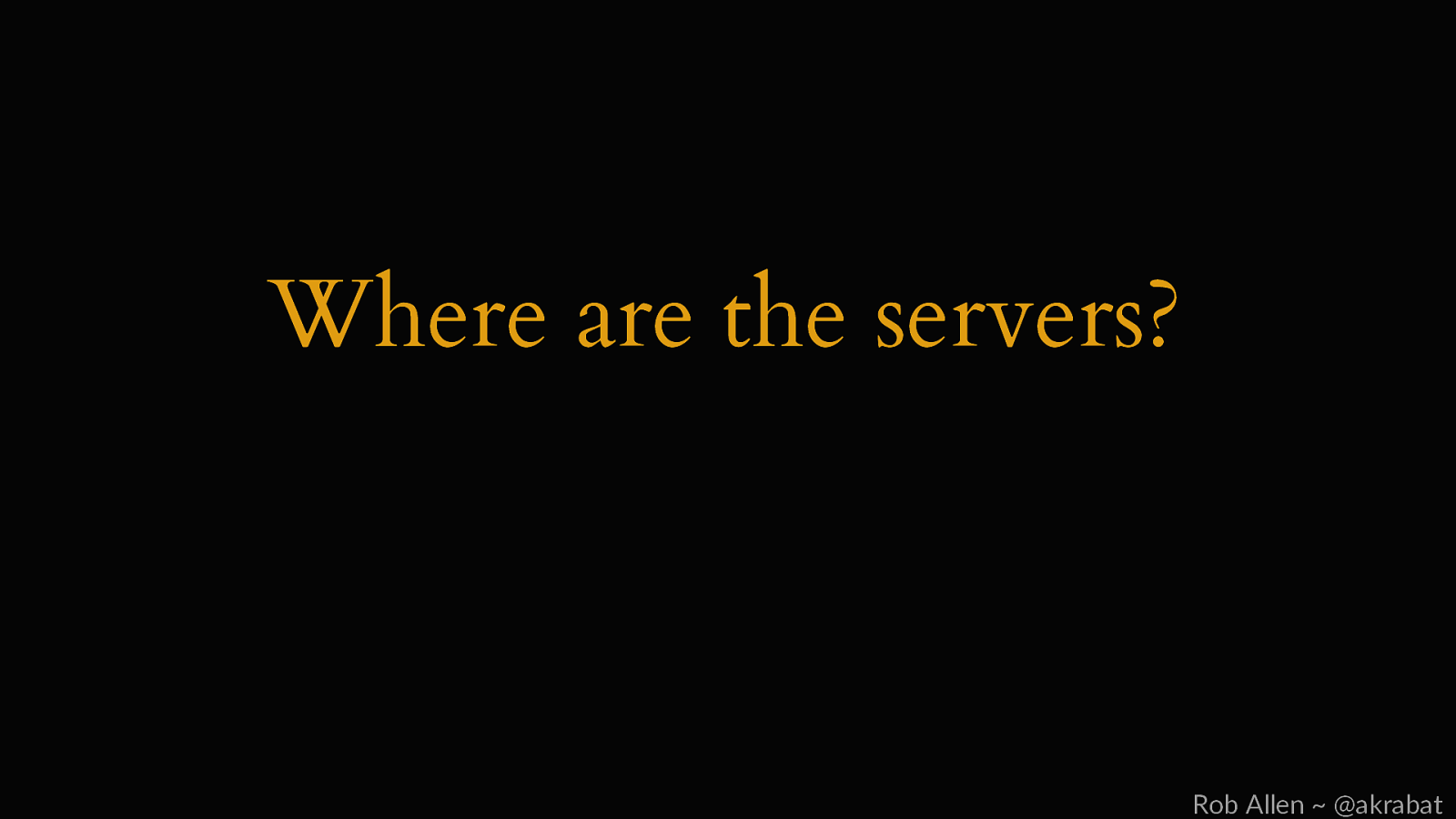
Where are the servers? Rob Allen ~ @akrabat

Rob Allen ~ @akrabat

Rob Allen ~ @akrabat
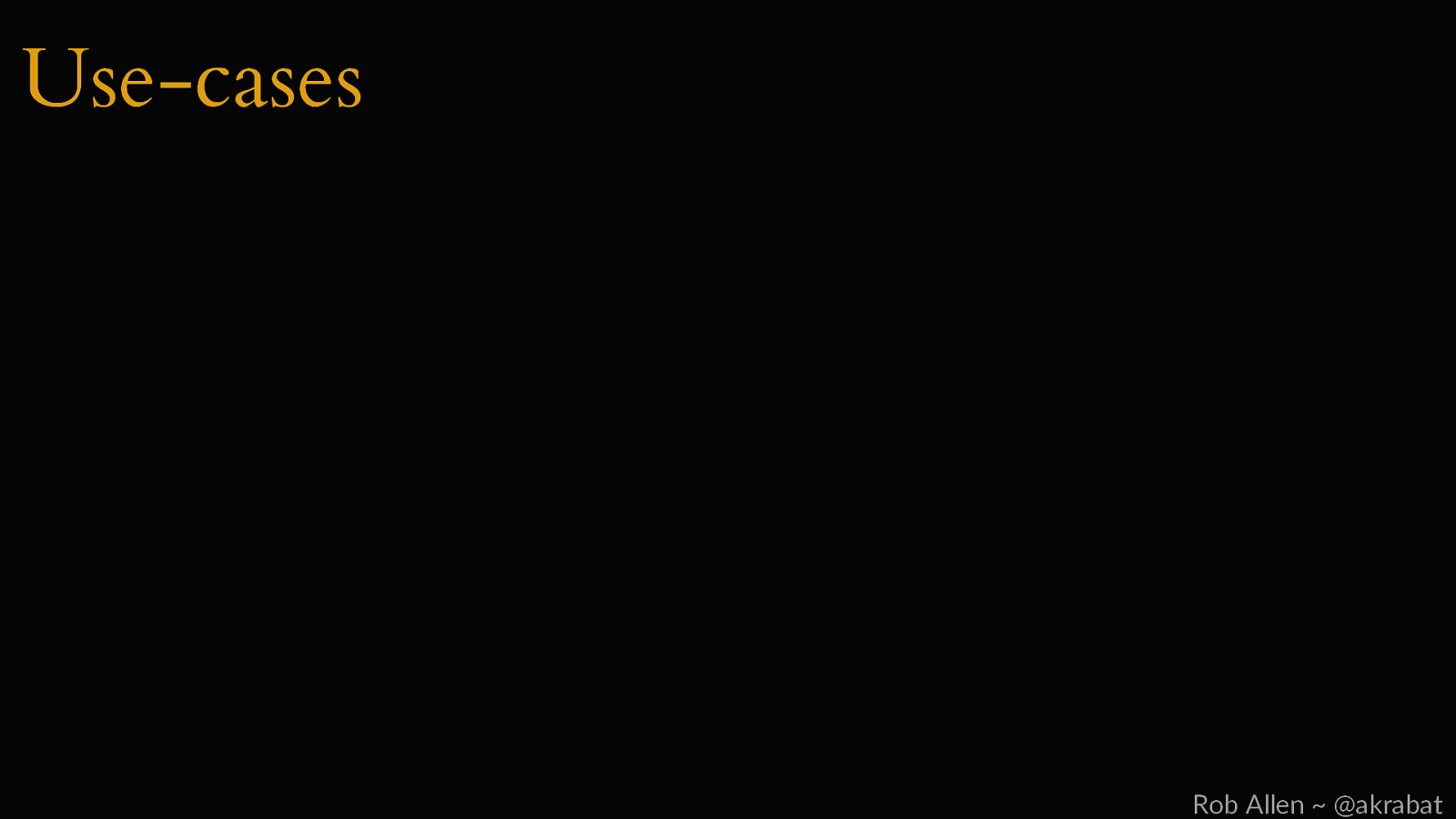
Use-cases Rob Allen ~ @akrabat

Use-cases Synchronous Service is invoked and provides immediate response (HTTP requests: APIs, chat bots) Rob Allen ~ @akrabat
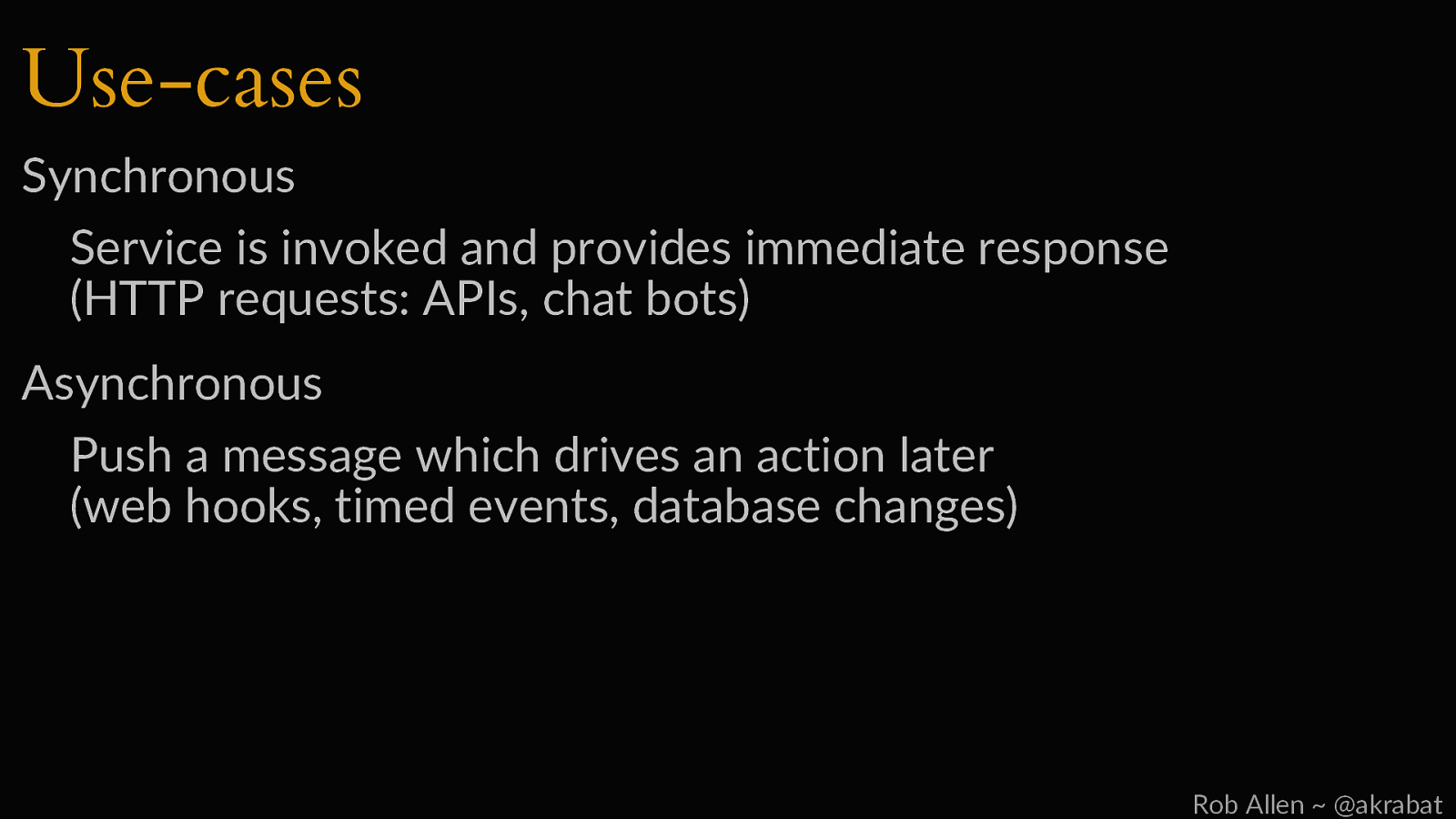
Use-cases Synchronous Service is invoked and provides immediate response (HTTP requests: APIs, chat bots) Asynchronous Push a message which drives an action later (web hooks, timed events, database changes) Rob Allen ~ @akrabat

Benefits Rob Allen ~ @akrabat
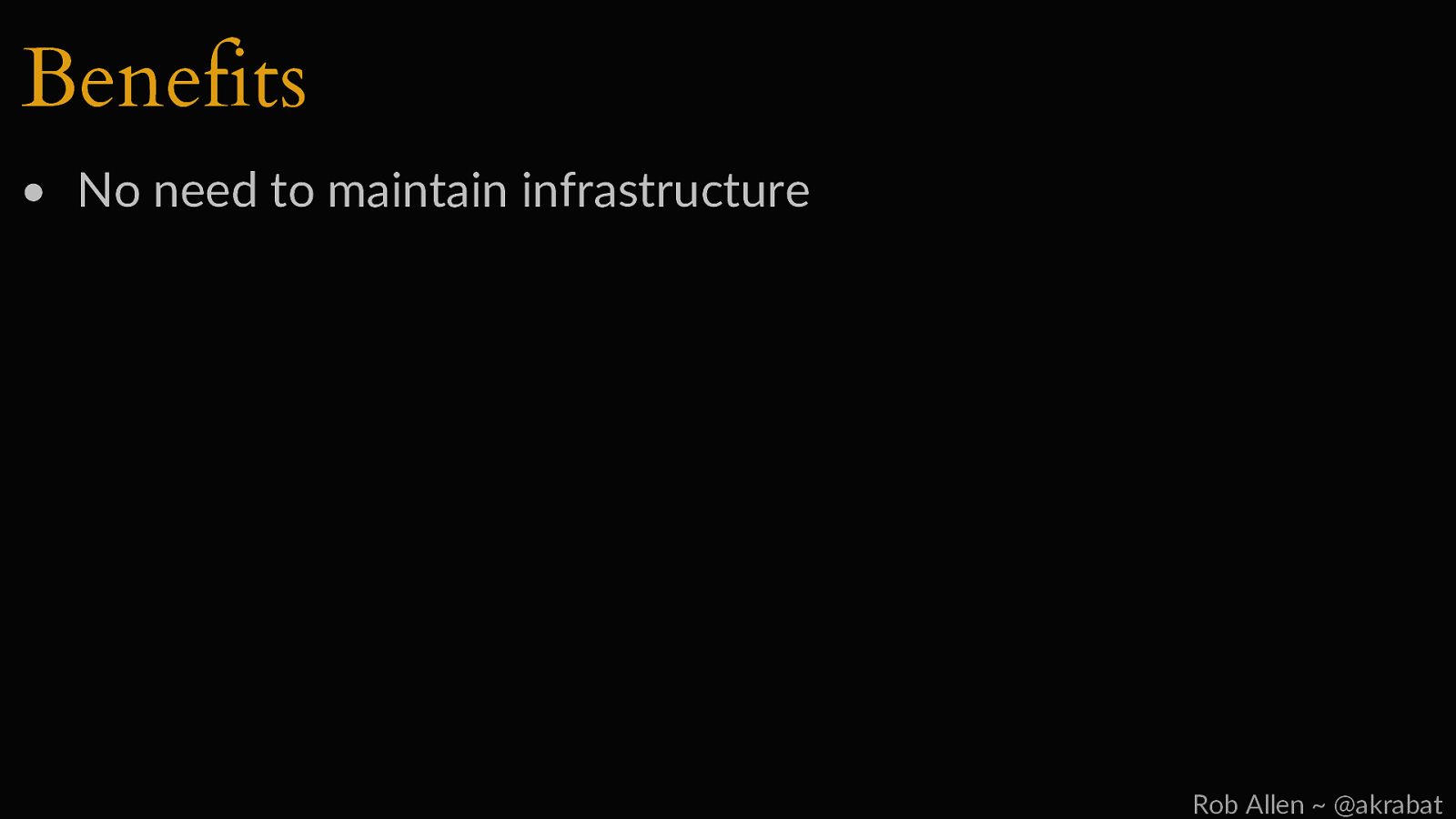
Benefits • No need to maintain infrastructure Rob Allen ~ @akrabat
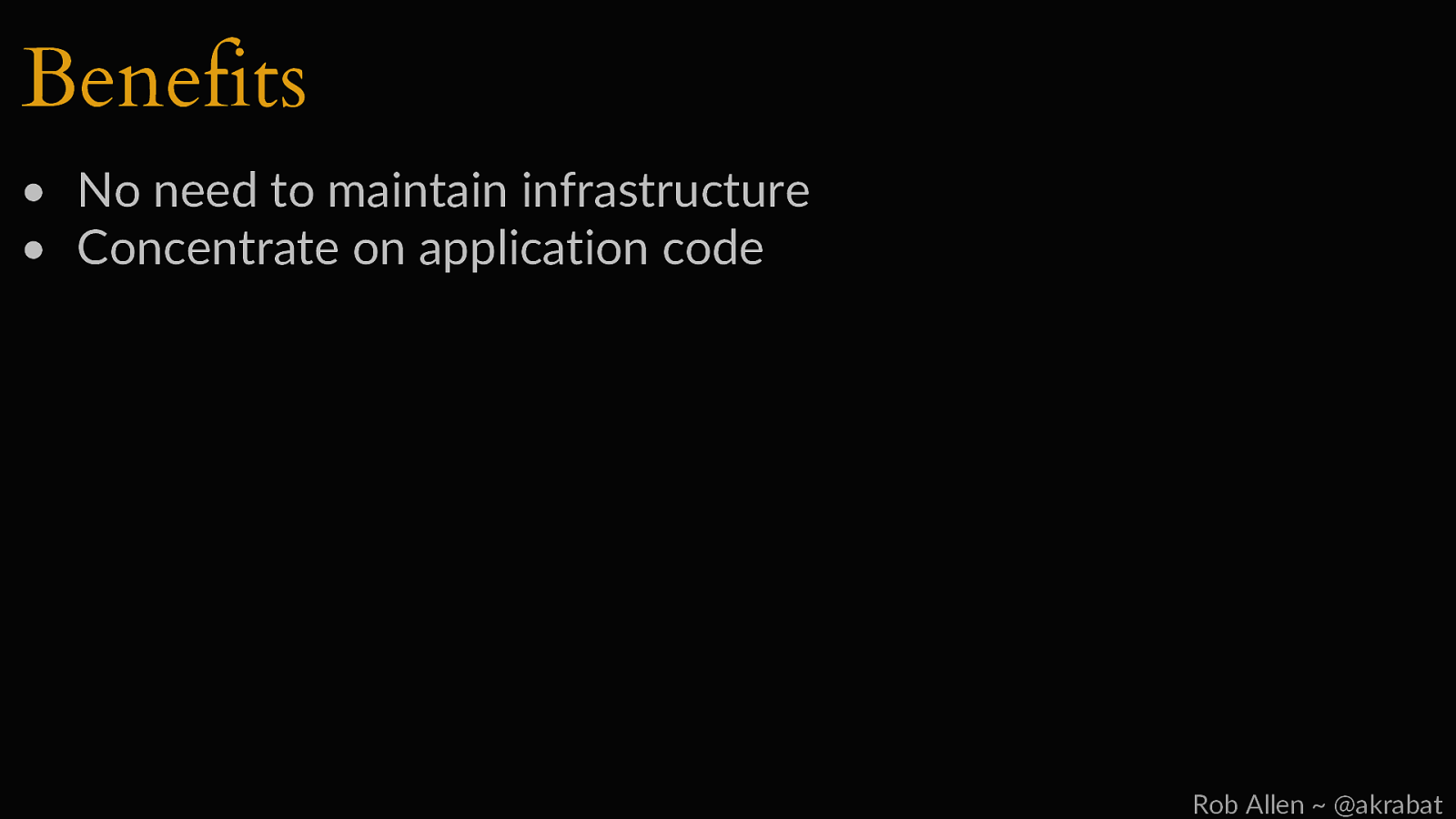
Benefits • No need to maintain infrastructure • Concentrate on application code Rob Allen ~ @akrabat
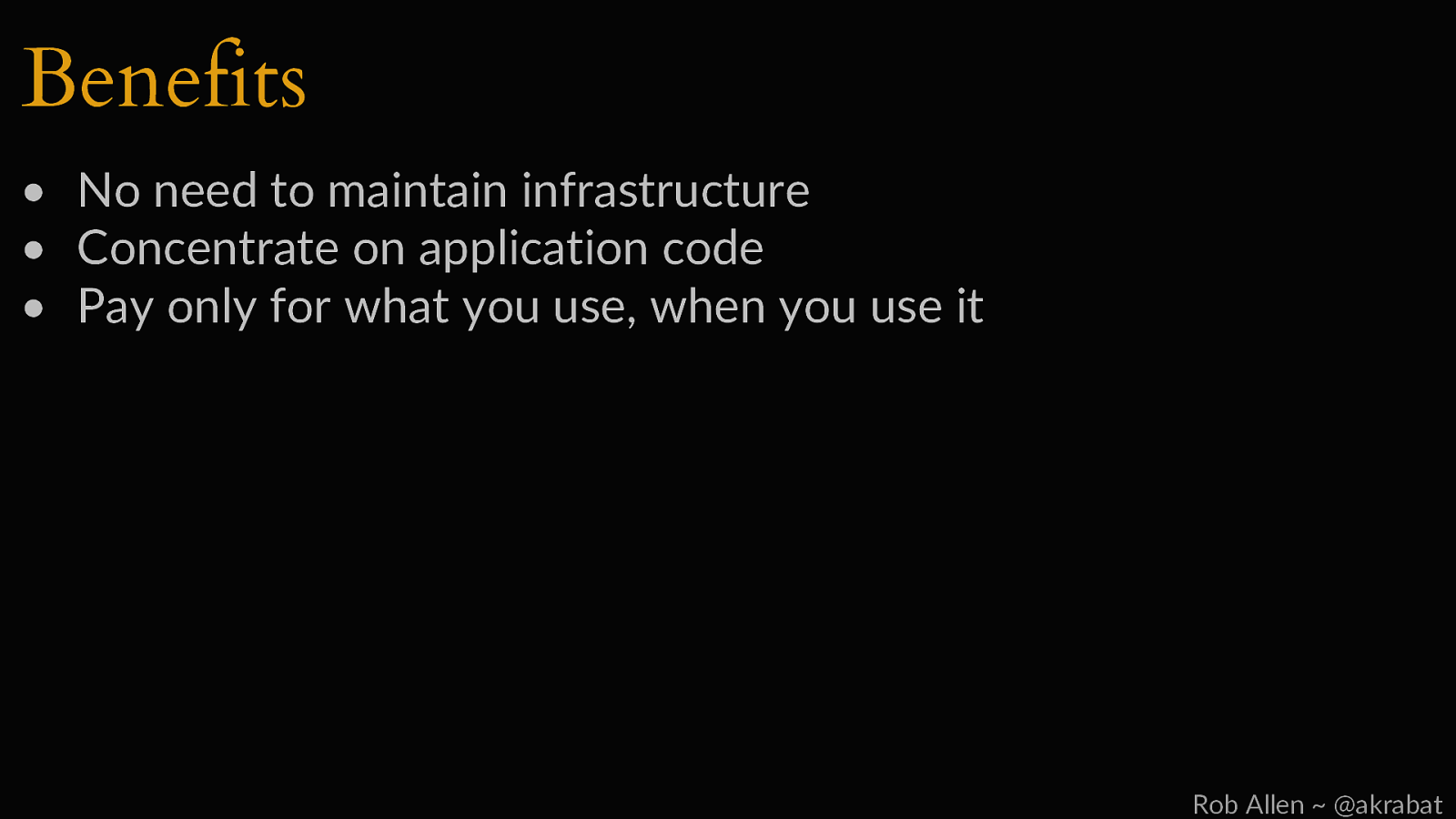
Benefits • No need to maintain infrastructure • Concentrate on application code • Pay only for what you use, when you use it Rob Allen ~ @akrabat
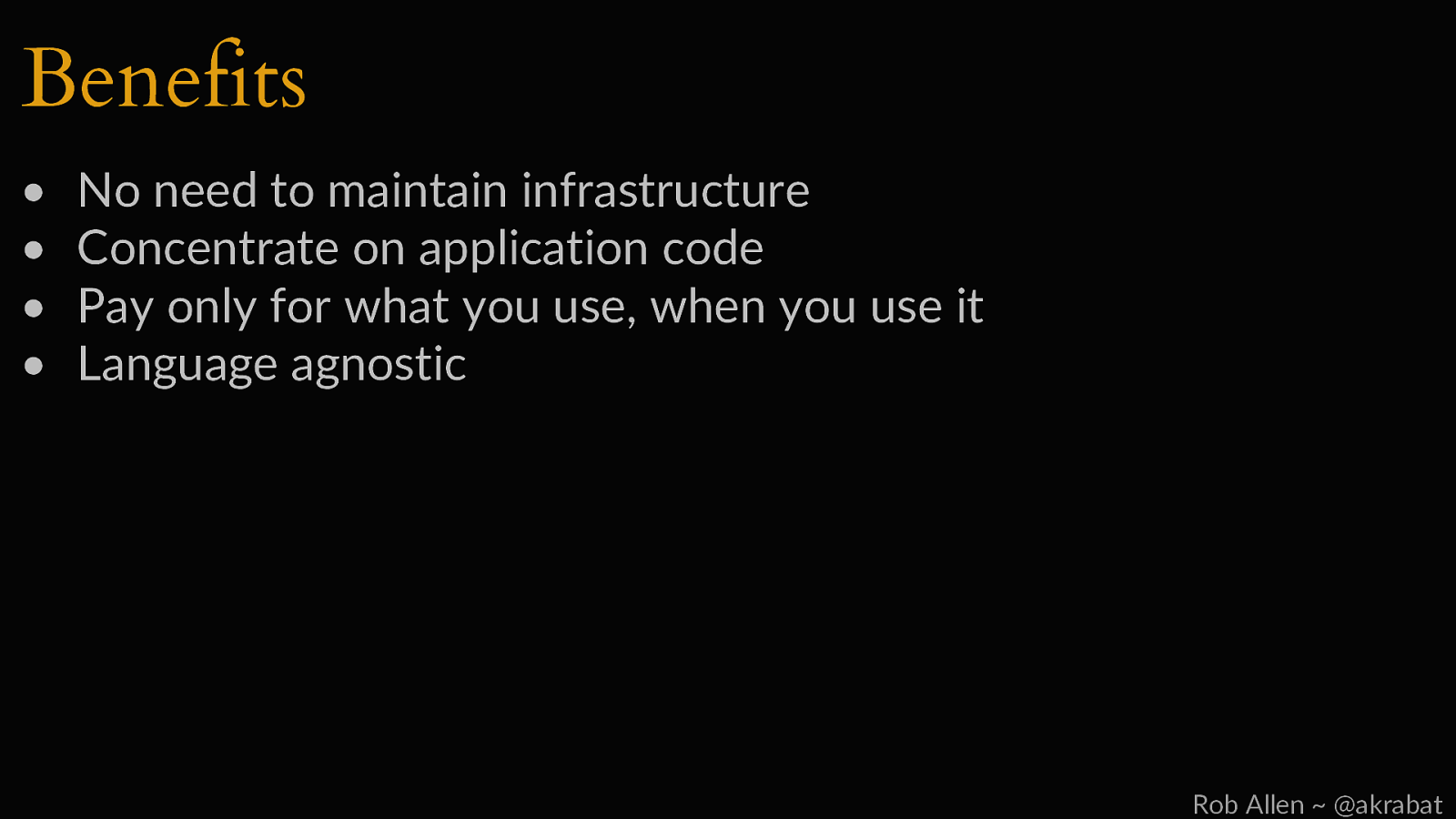
Benefits • • • • No need to maintain infrastructure Concentrate on application code Pay only for what you use, when you use it Language agnostic Rob Allen ~ @akrabat

Challenges Rob Allen ~ @akrabat
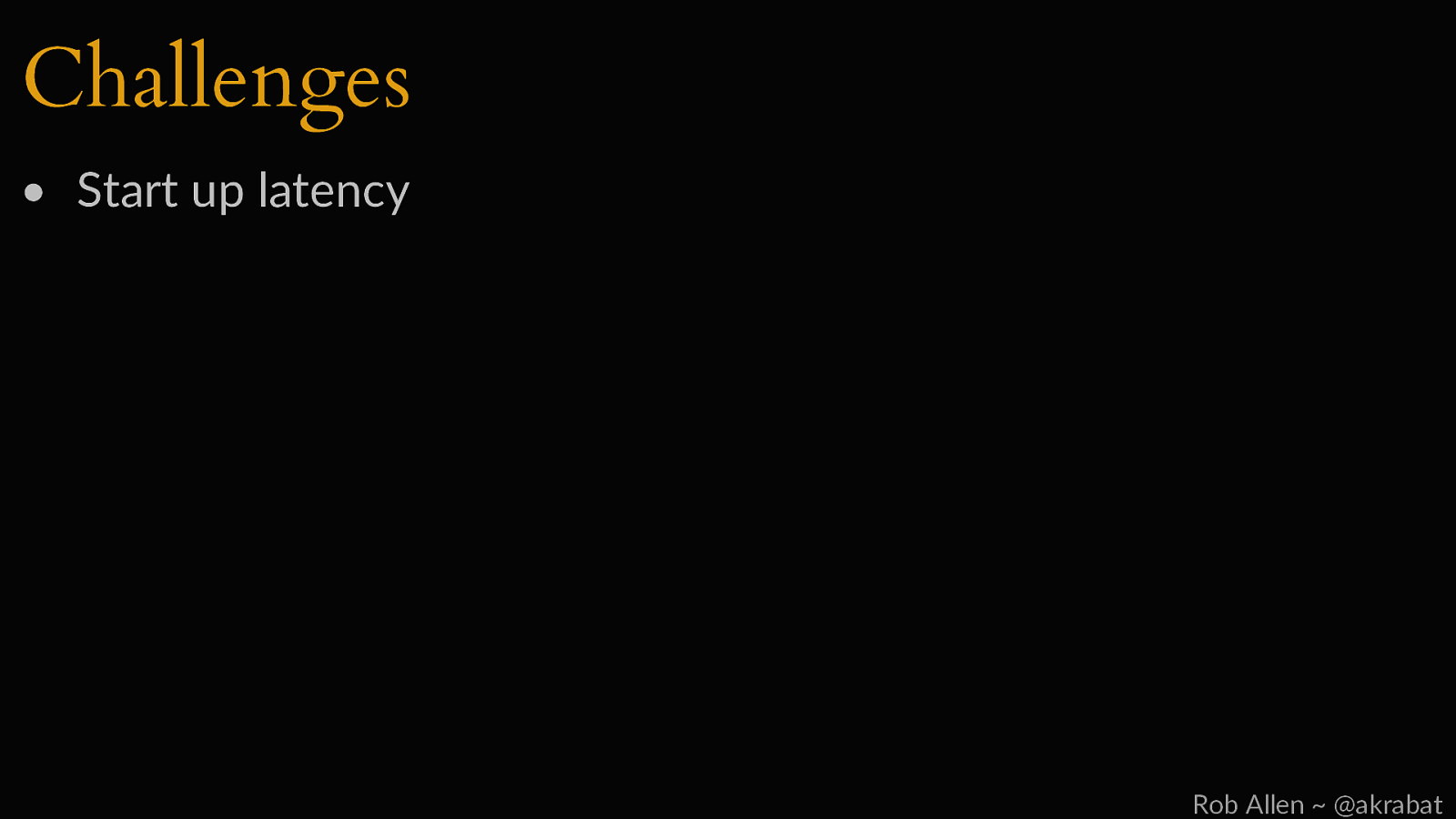
Challenges • Start up latency Rob Allen ~ @akrabat
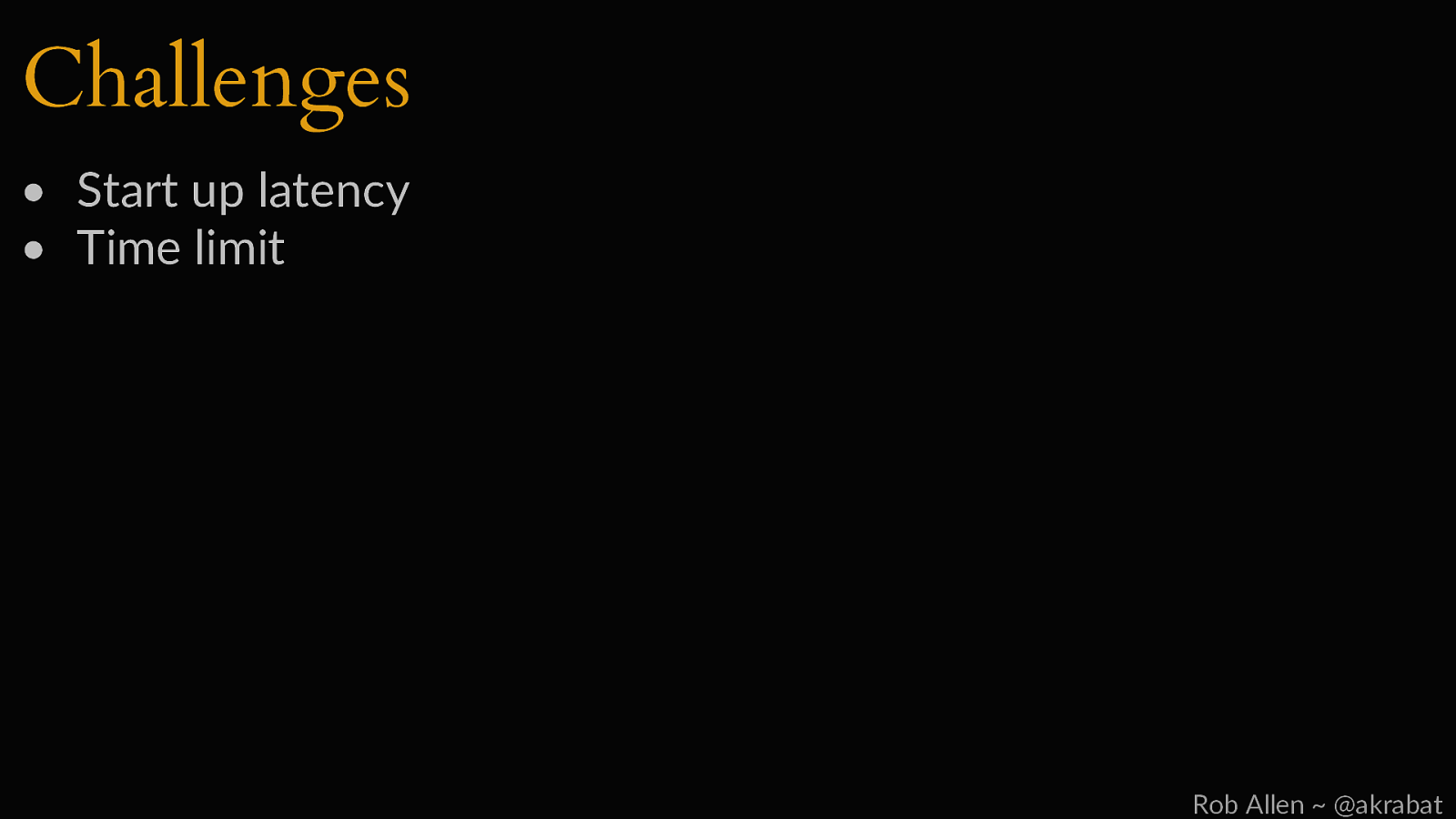
Challenges • Start up latency • Time limit Rob Allen ~ @akrabat
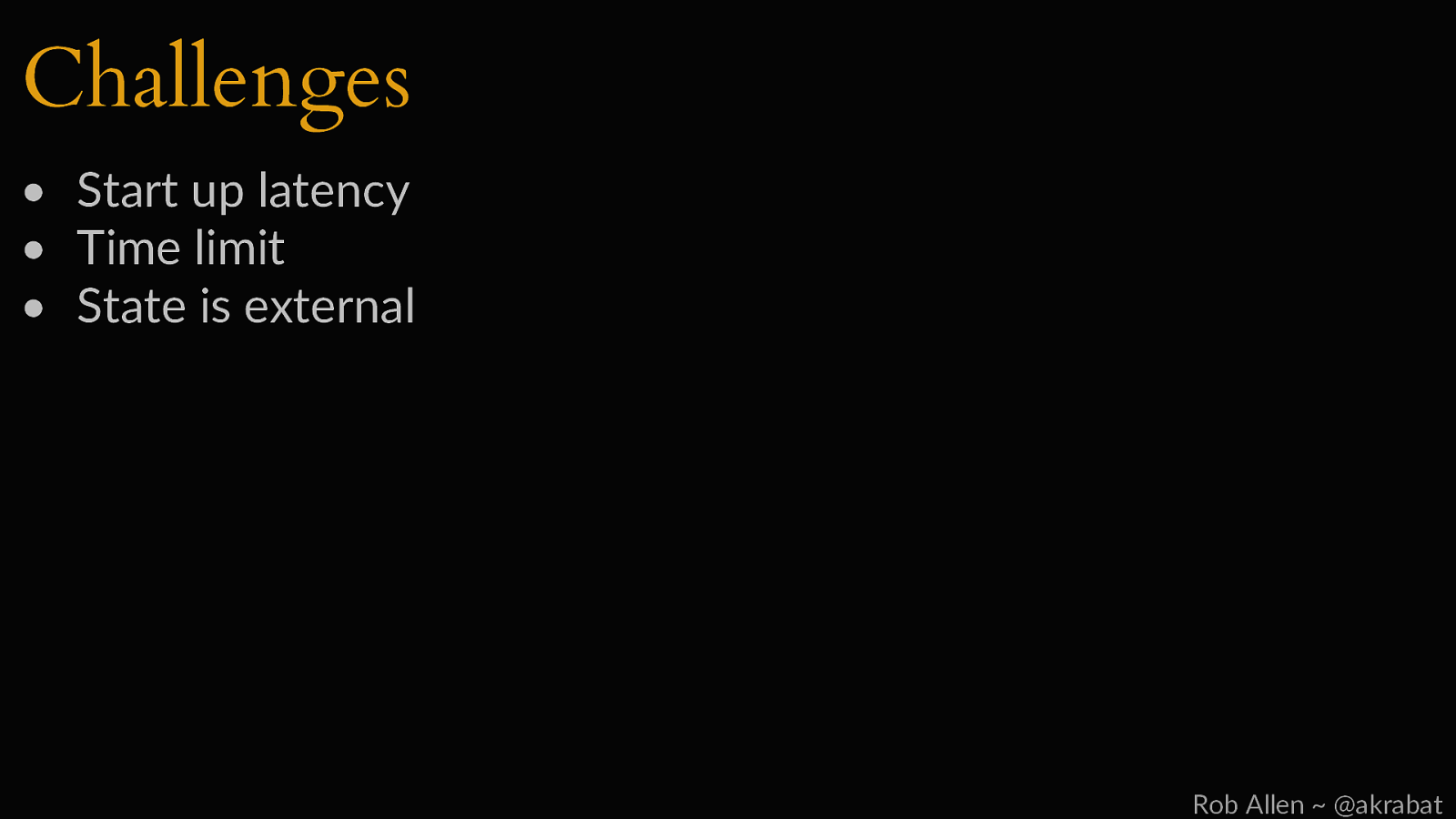
Challenges • Start up latency • Time limit • State is external Rob Allen ~ @akrabat
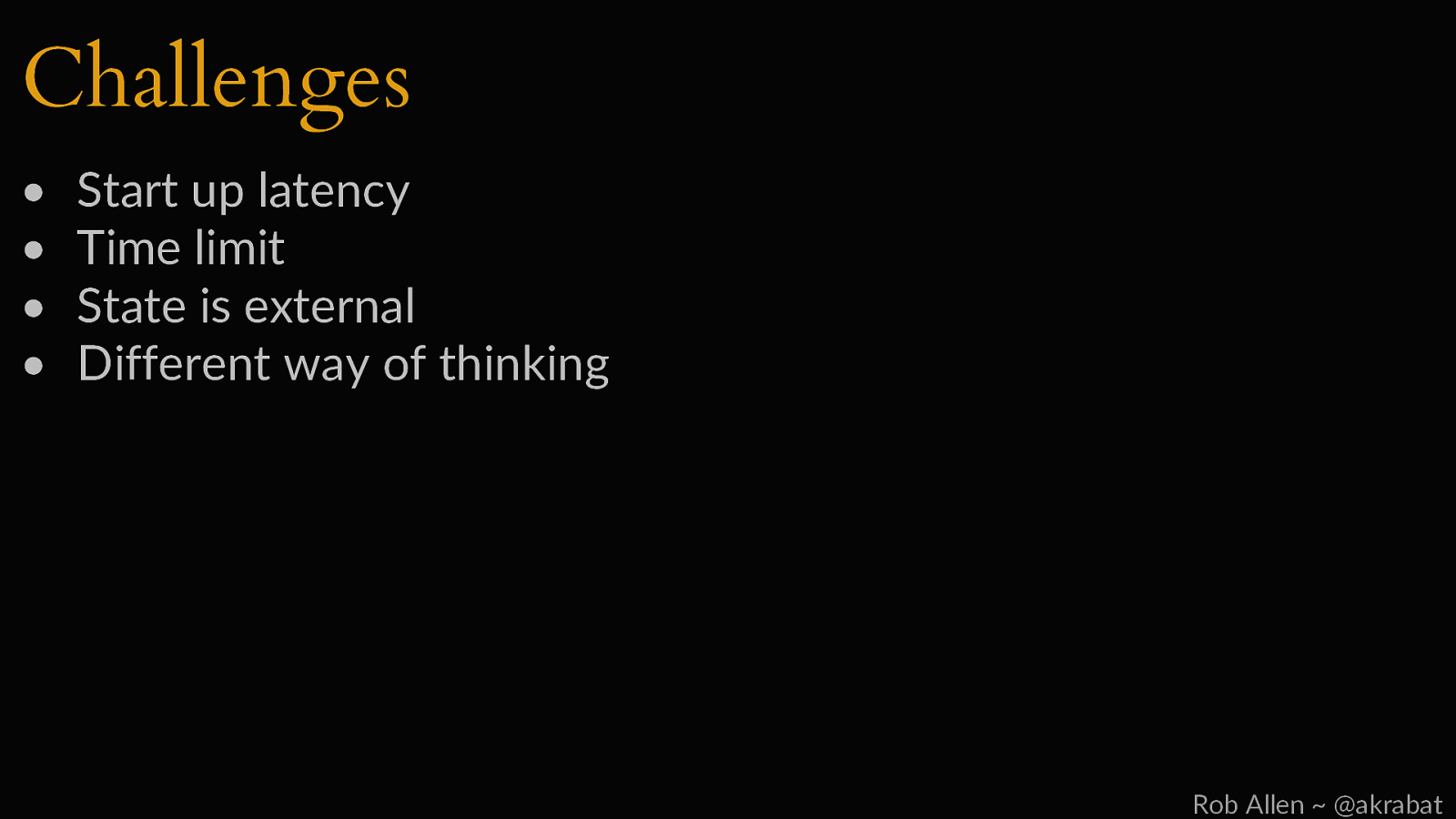
Challenges • • • • Start up latency Time limit State is external Different way of thinking Rob Allen ~ @akrabat
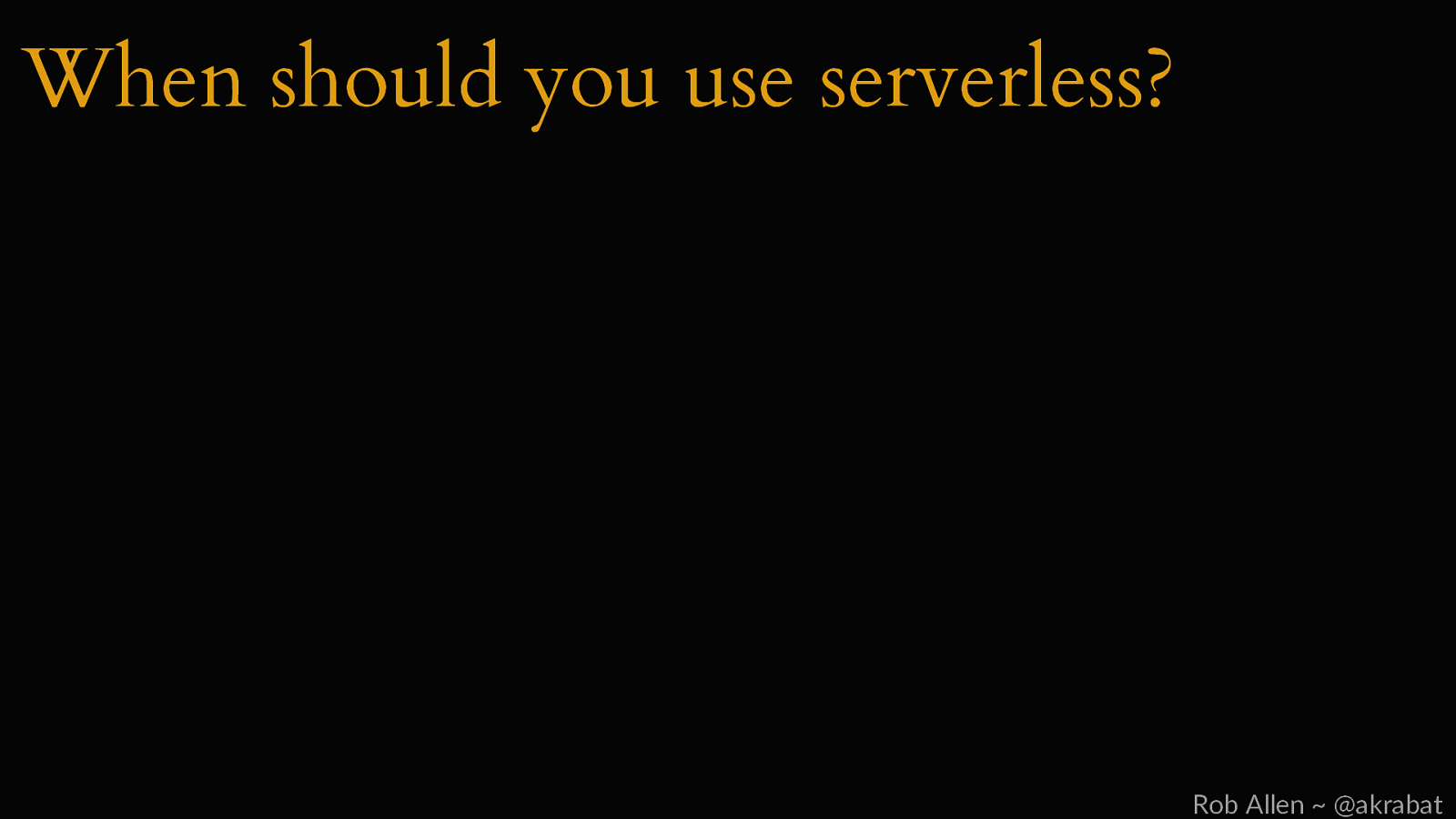
When should you use serverless? Rob Allen ~ @akrabat
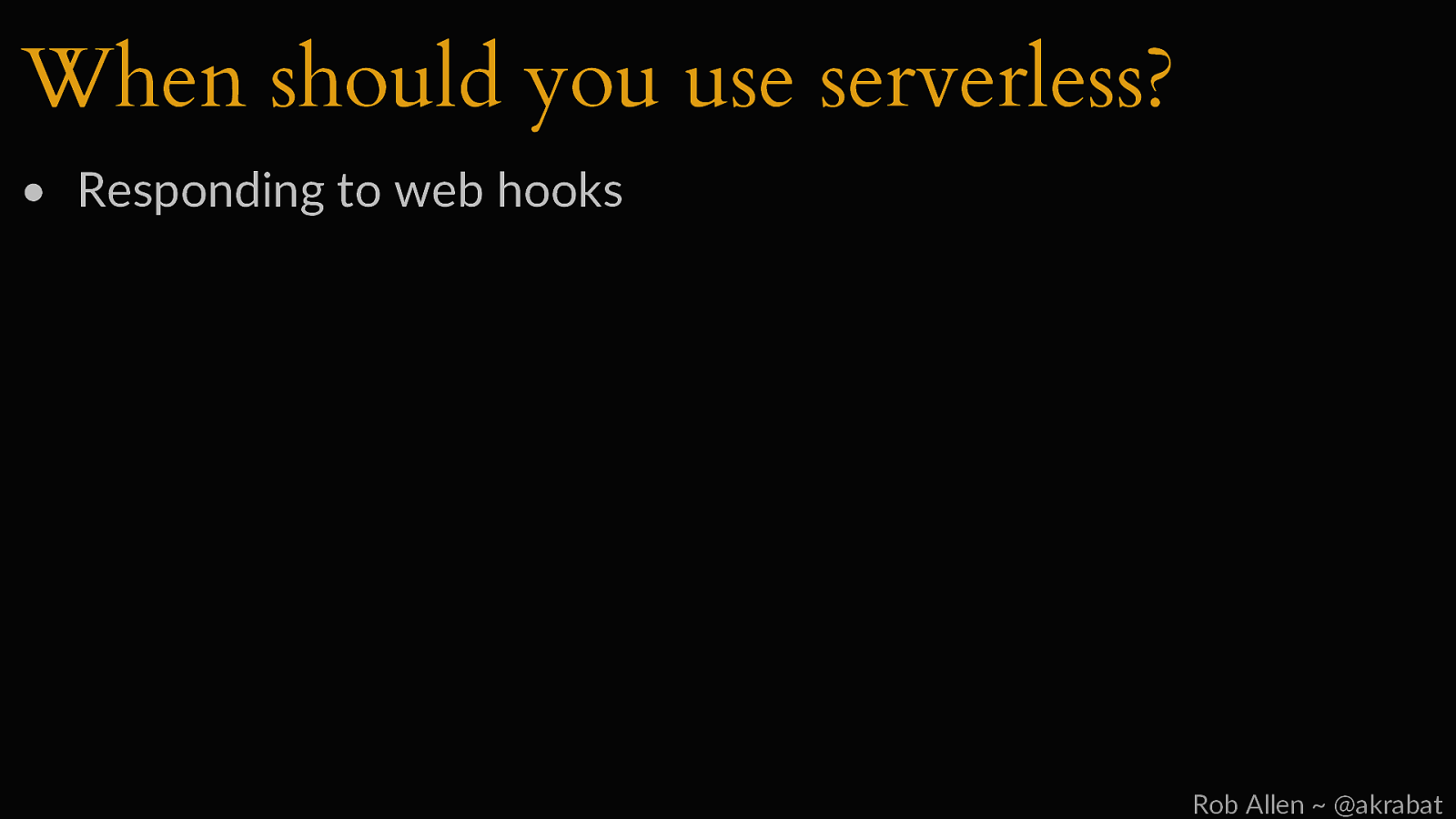
When should you use serverless? • Responding to web hooks Rob Allen ~ @akrabat
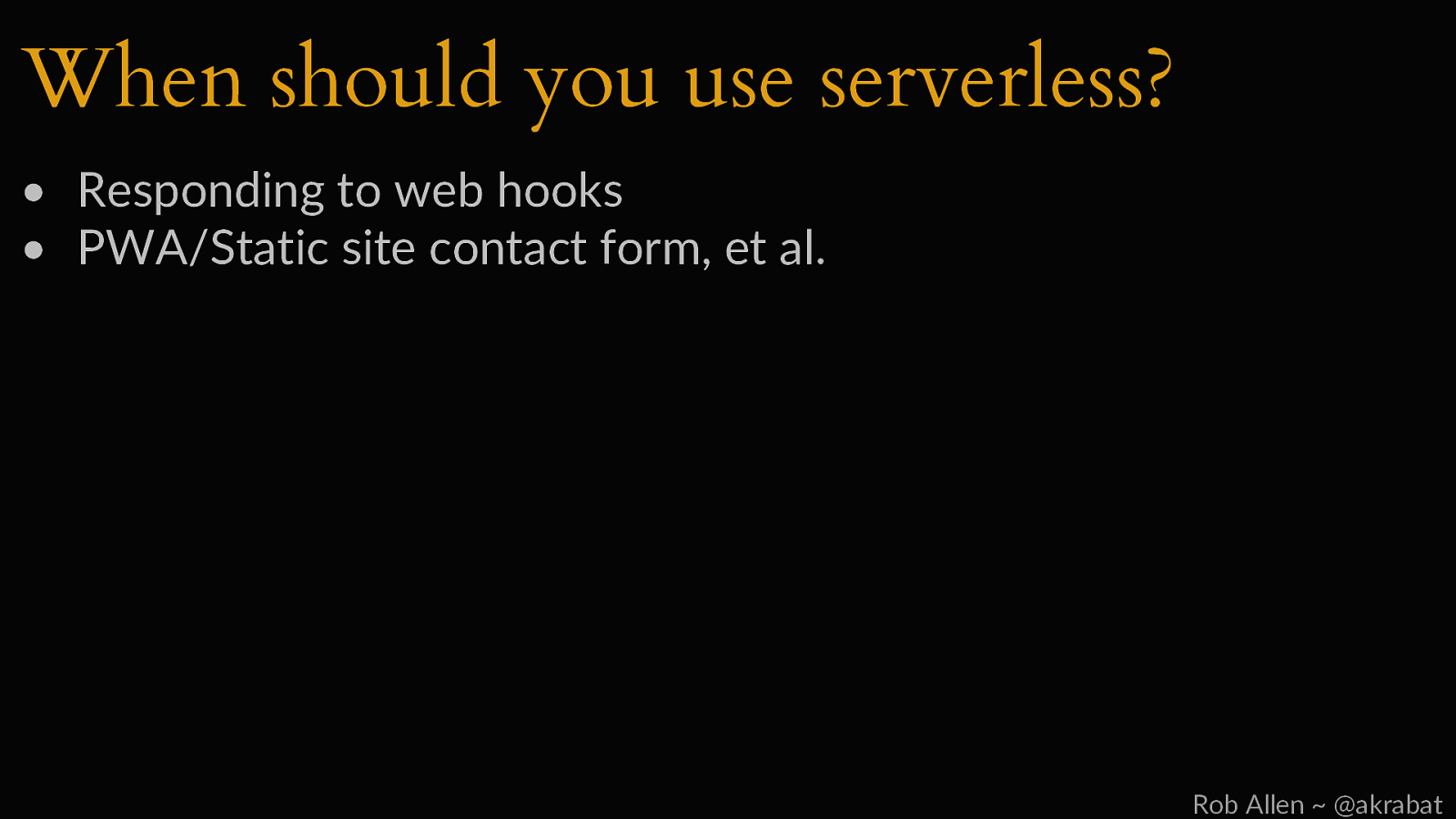
When should you use serverless? • Responding to web hooks • PWA/Static site contact form, et al. Rob Allen ~ @akrabat
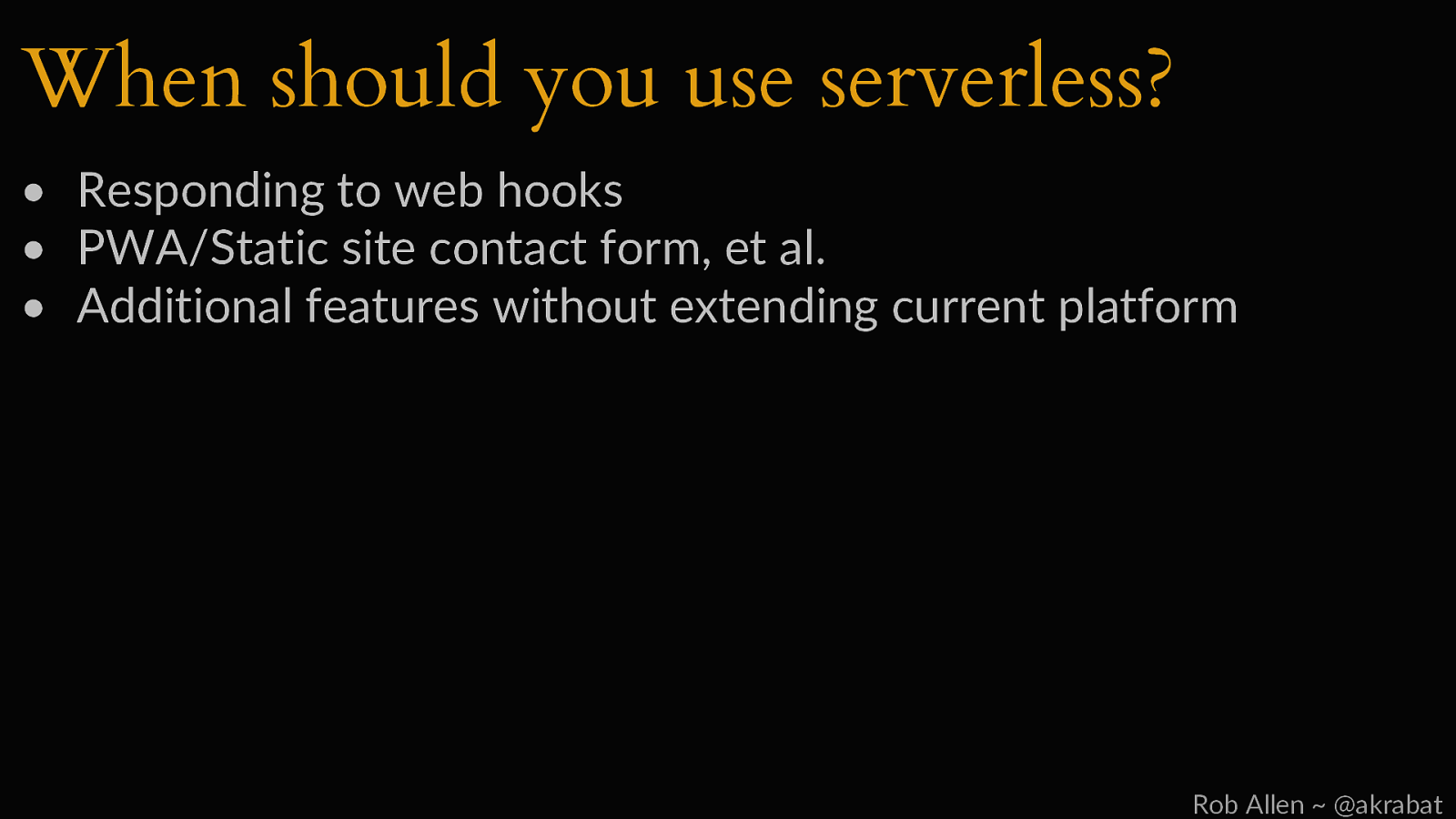
When should you use serverless? • Responding to web hooks • PWA/Static site contact form, et al. • Additional features without extending current platform Rob Allen ~ @akrabat
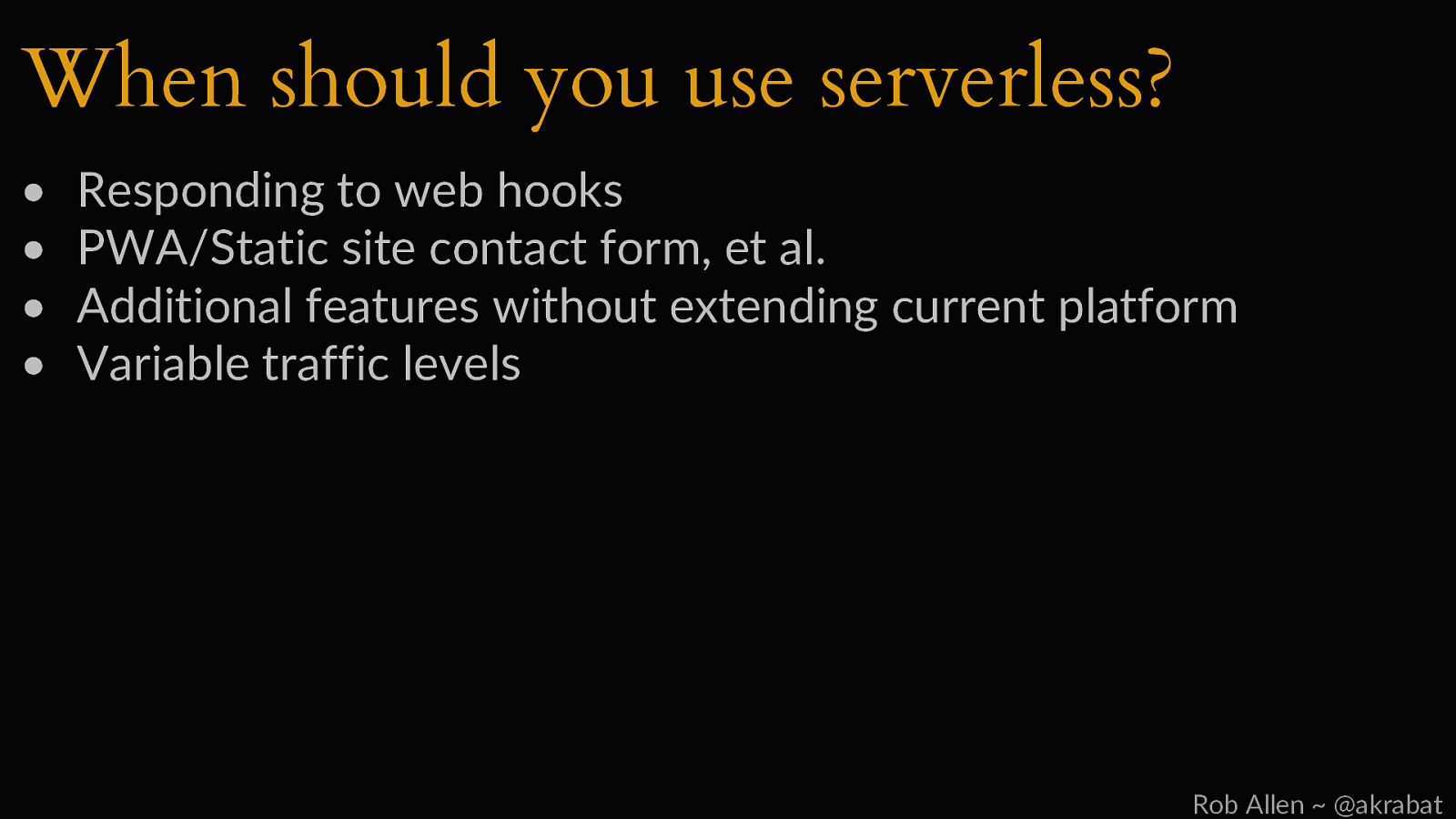
When should you use serverless? • • • • Responding to web hooks PWA/Static site contact form, et al. Additional features without extending current platform Variable traffic levels Rob Allen ~ @akrabat
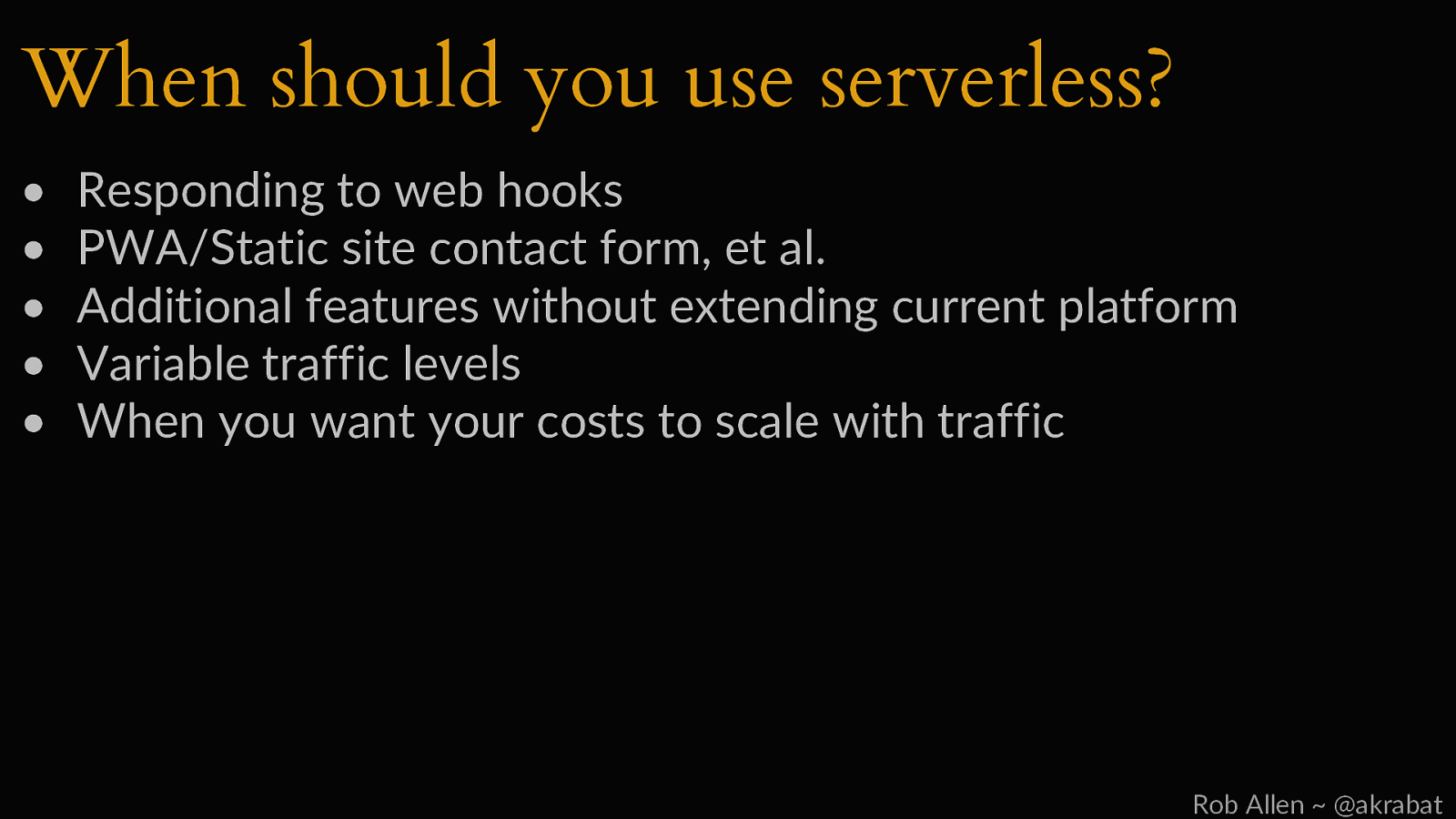
When should you use serverless? • • • • • Responding to web hooks PWA/Static site contact form, et al. Additional features without extending current platform Variable traffic levels When you want your costs to scale with traffic Rob Allen ~ @akrabat
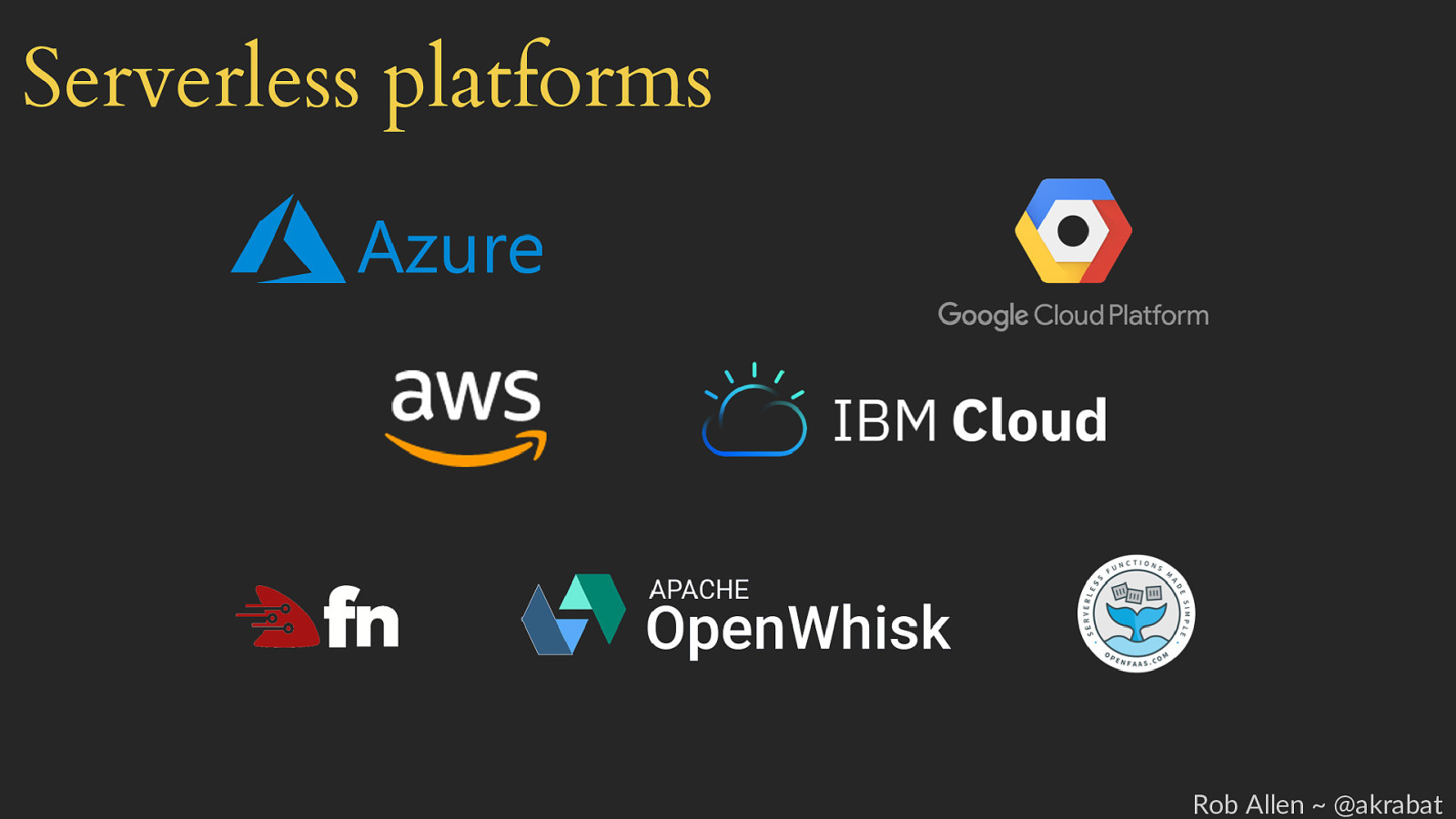
Serverless platforms Rob Allen ~ @akrabat
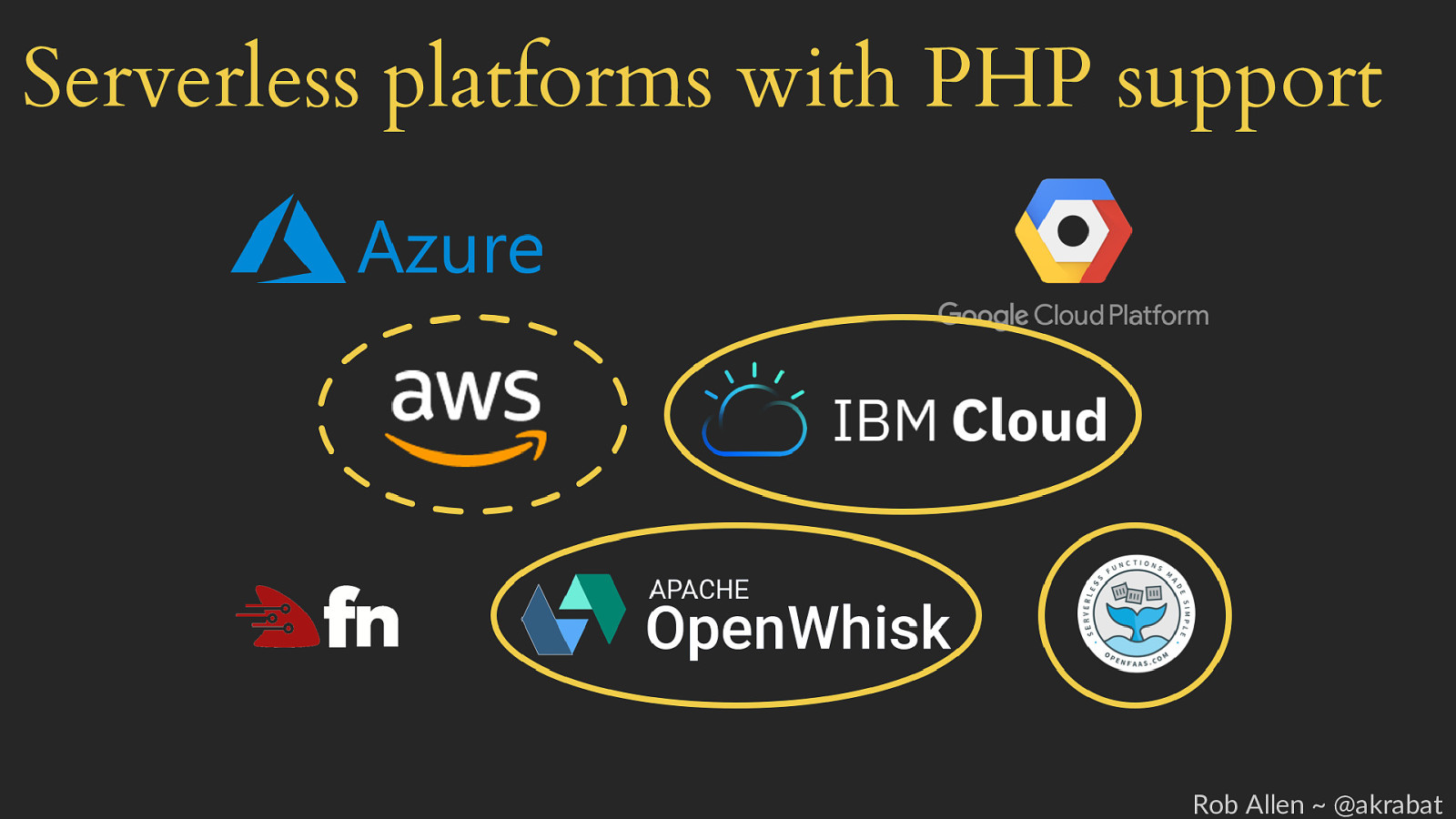
Serverless platforms with PHP support Rob Allen ~ @akrabat
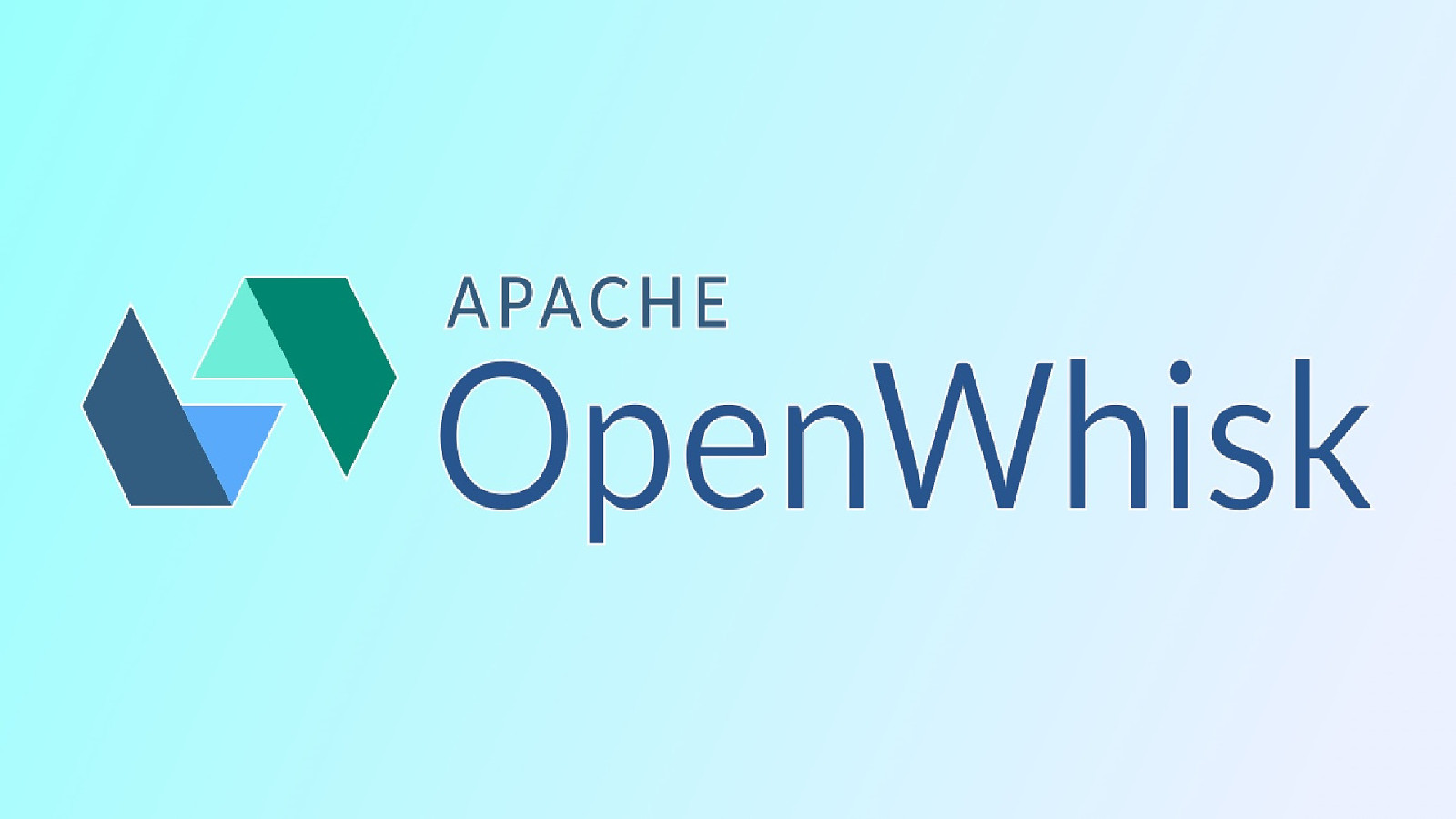
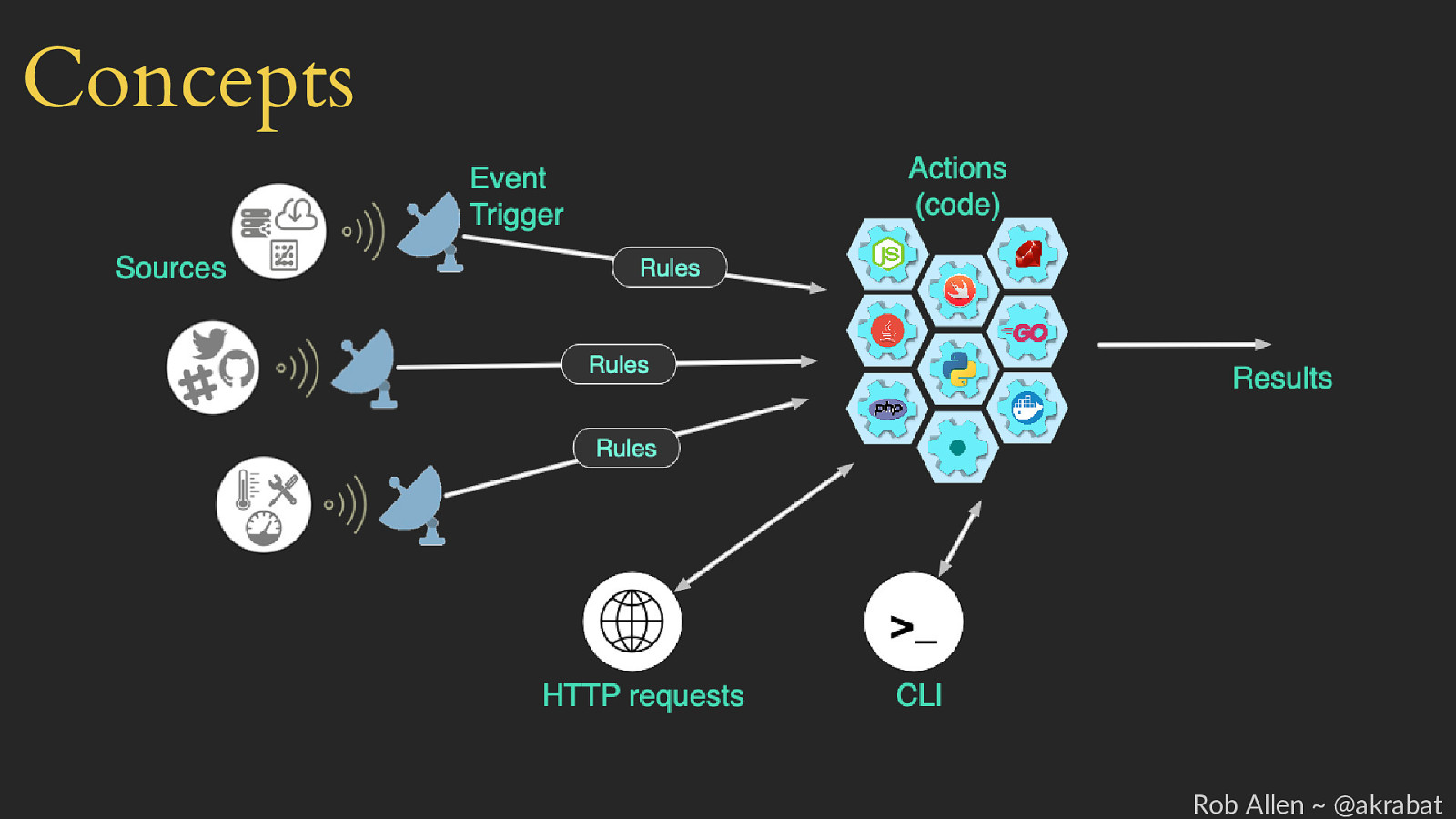
Concepts Rob Allen ~ @akrabat
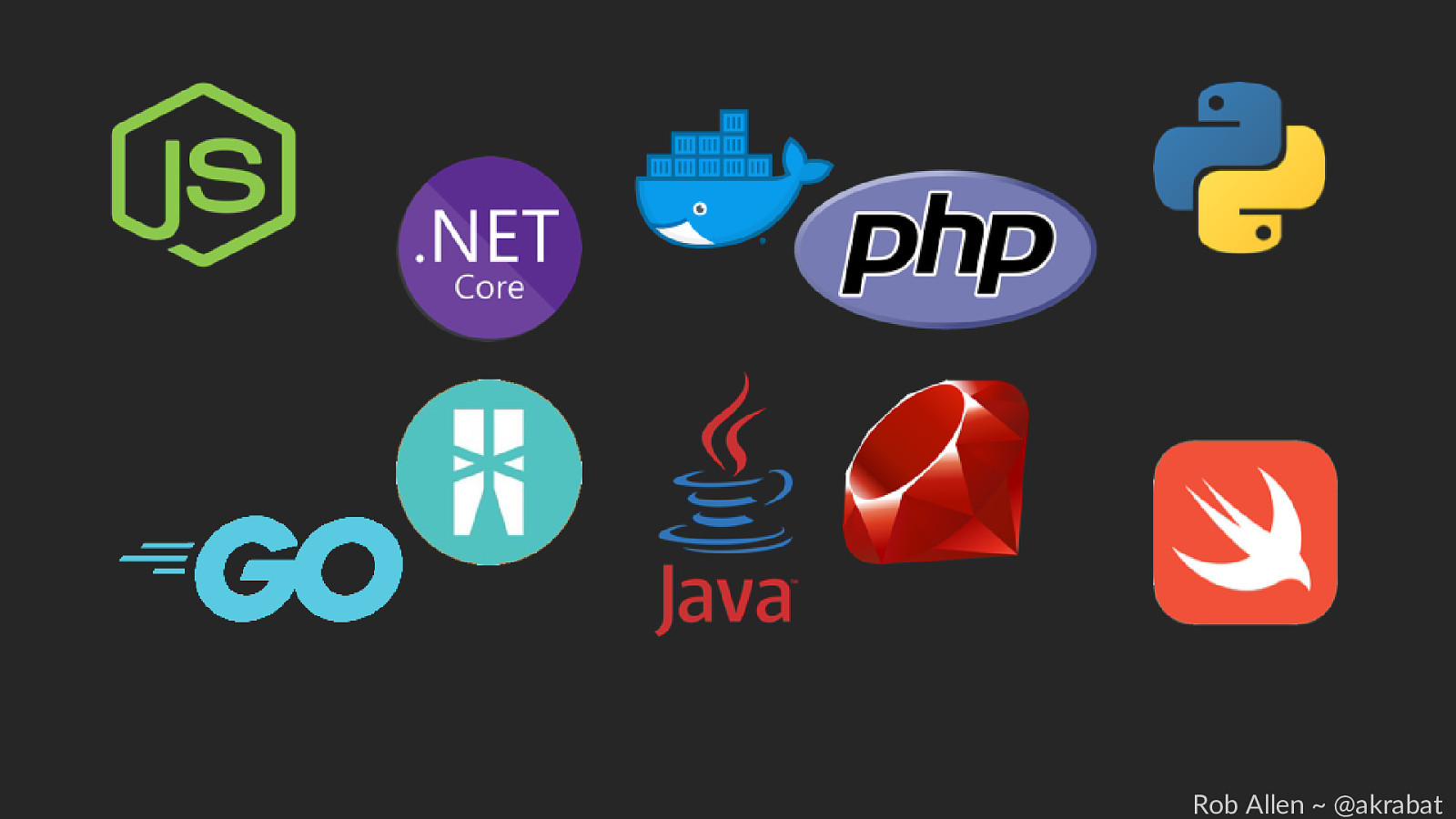
Rob Allen ~ @akrabat
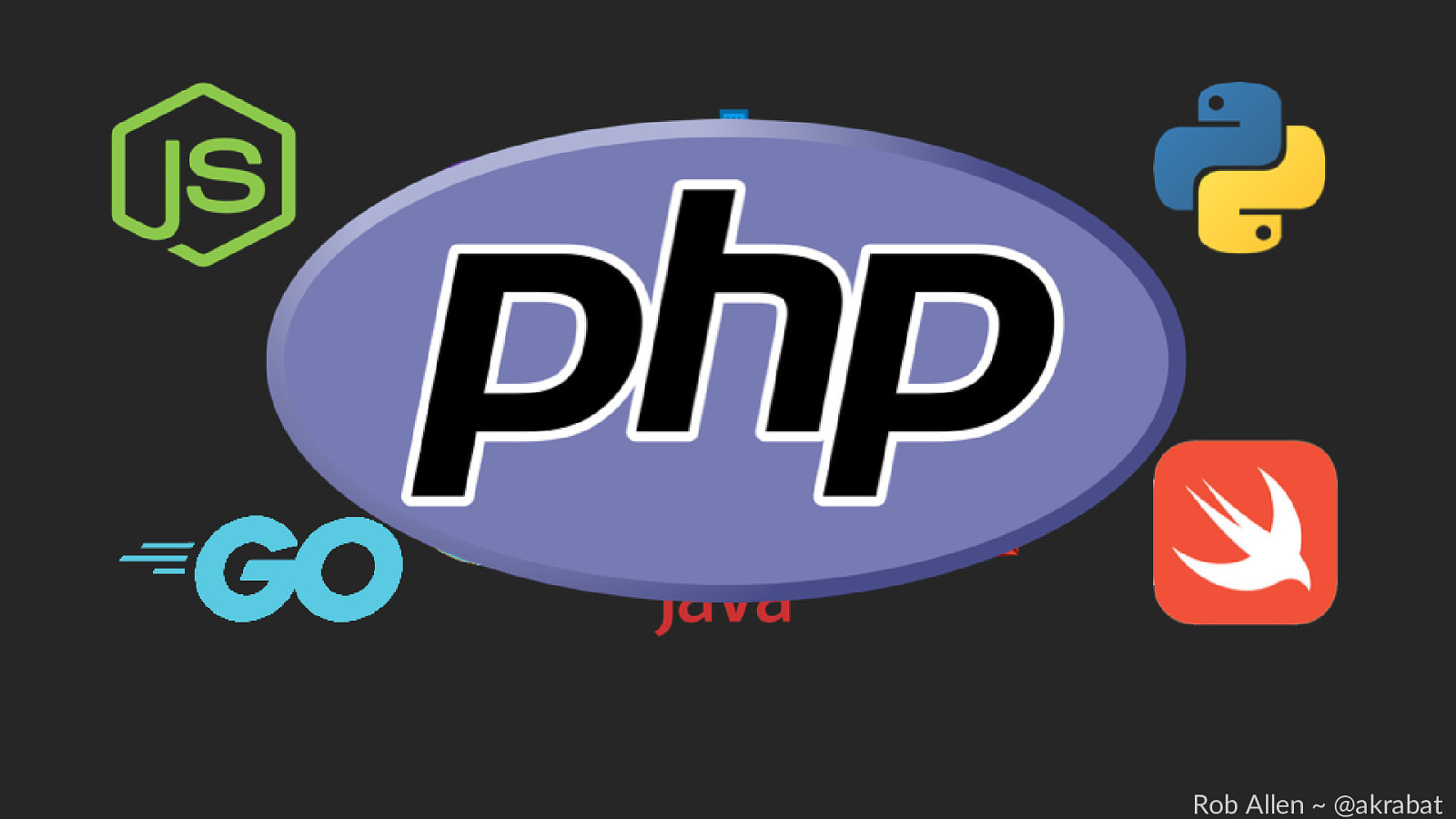
Rob Allen ~ @akrabat
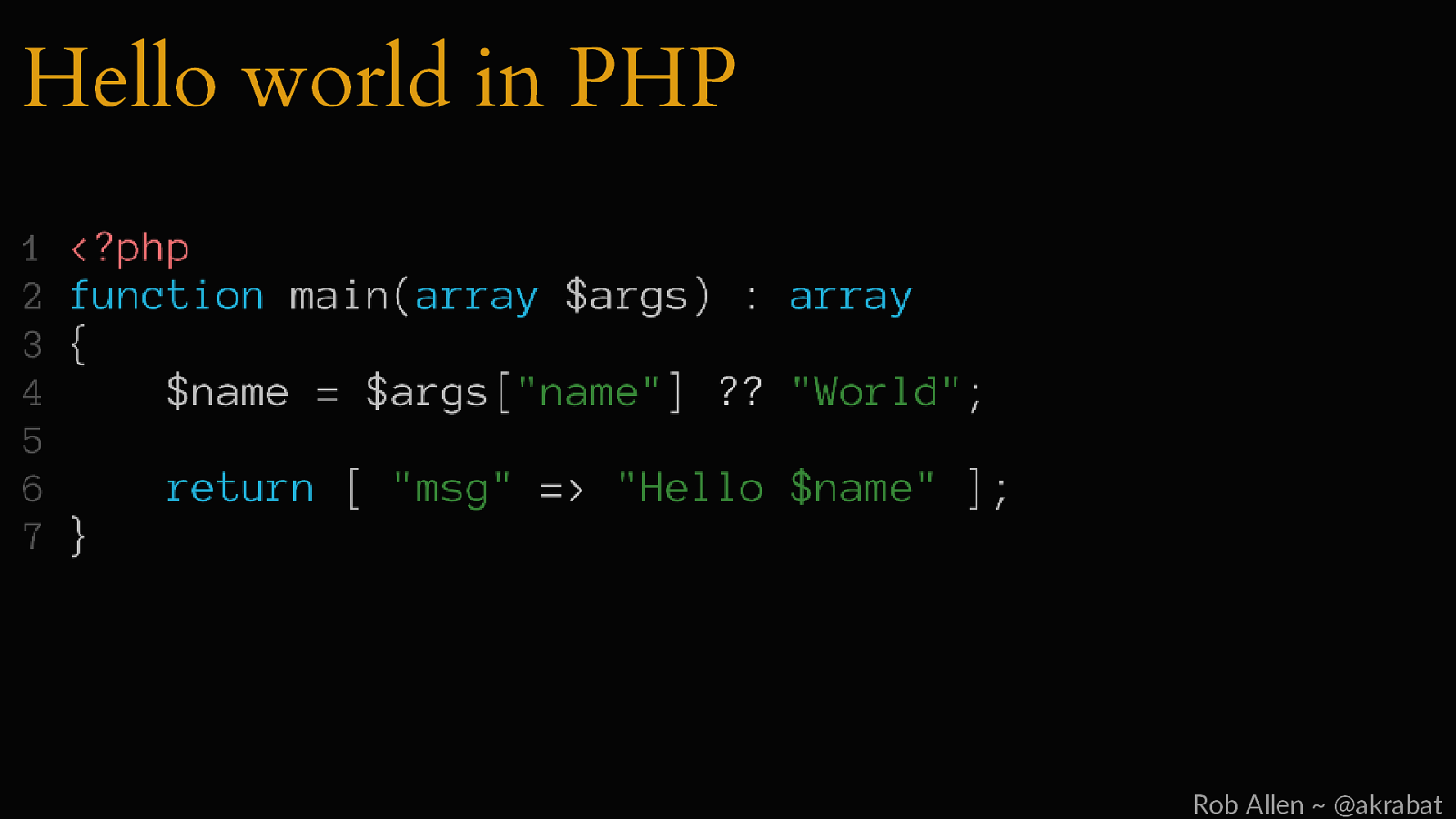
Hello world in PHP Rob Allen ~ @akrabat
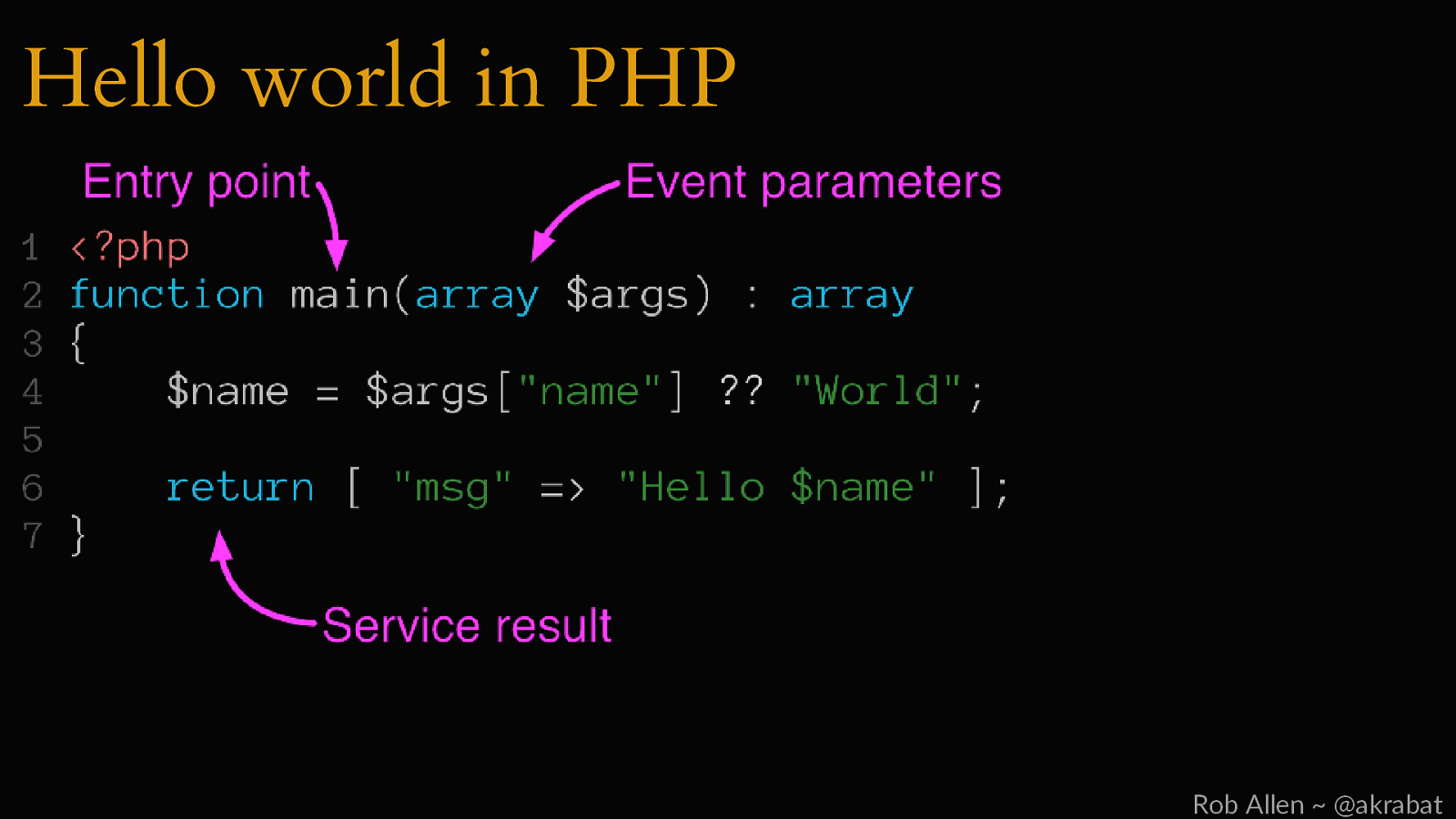
Hello world in PHP Rob Allen ~ @akrabat
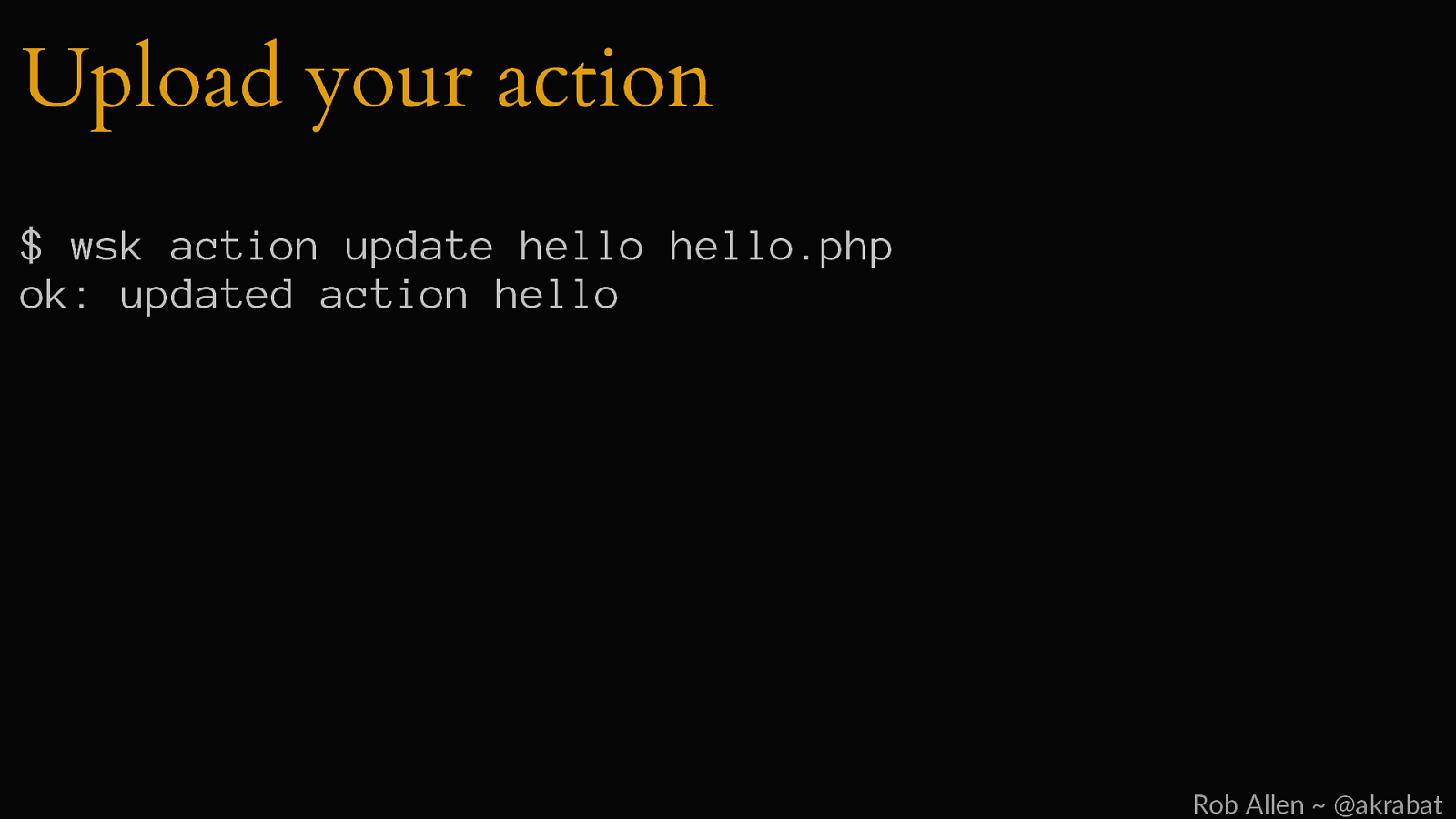
Upload your action $ wsk action update hello hello.php ok: updated action hello Rob Allen ~ @akrabat
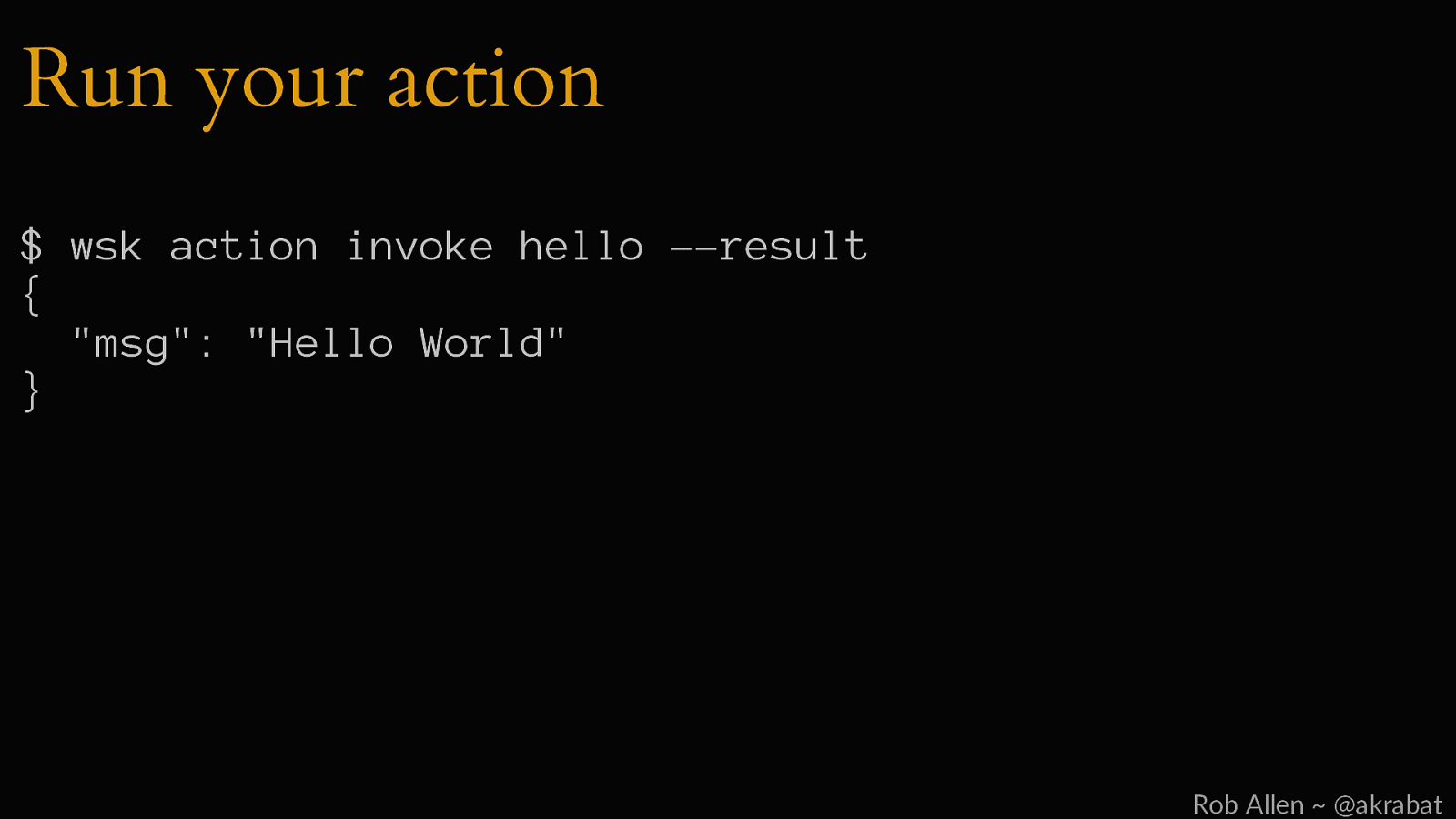
Run your action $ wsk action invoke hello —result { “msg”: “Hello World” } Rob Allen ~ @akrabat
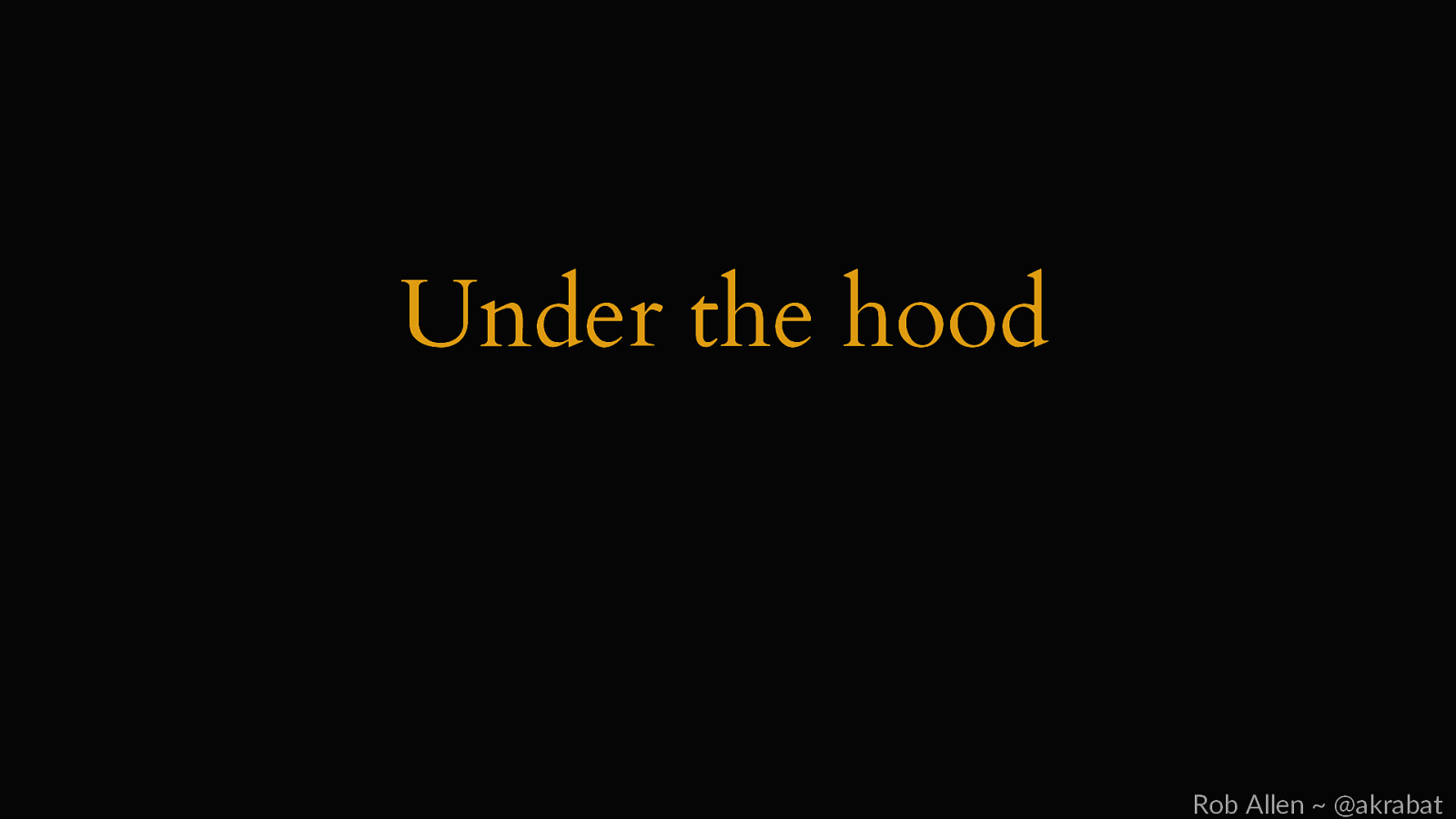
Under the hood Rob Allen ~ @akrabat
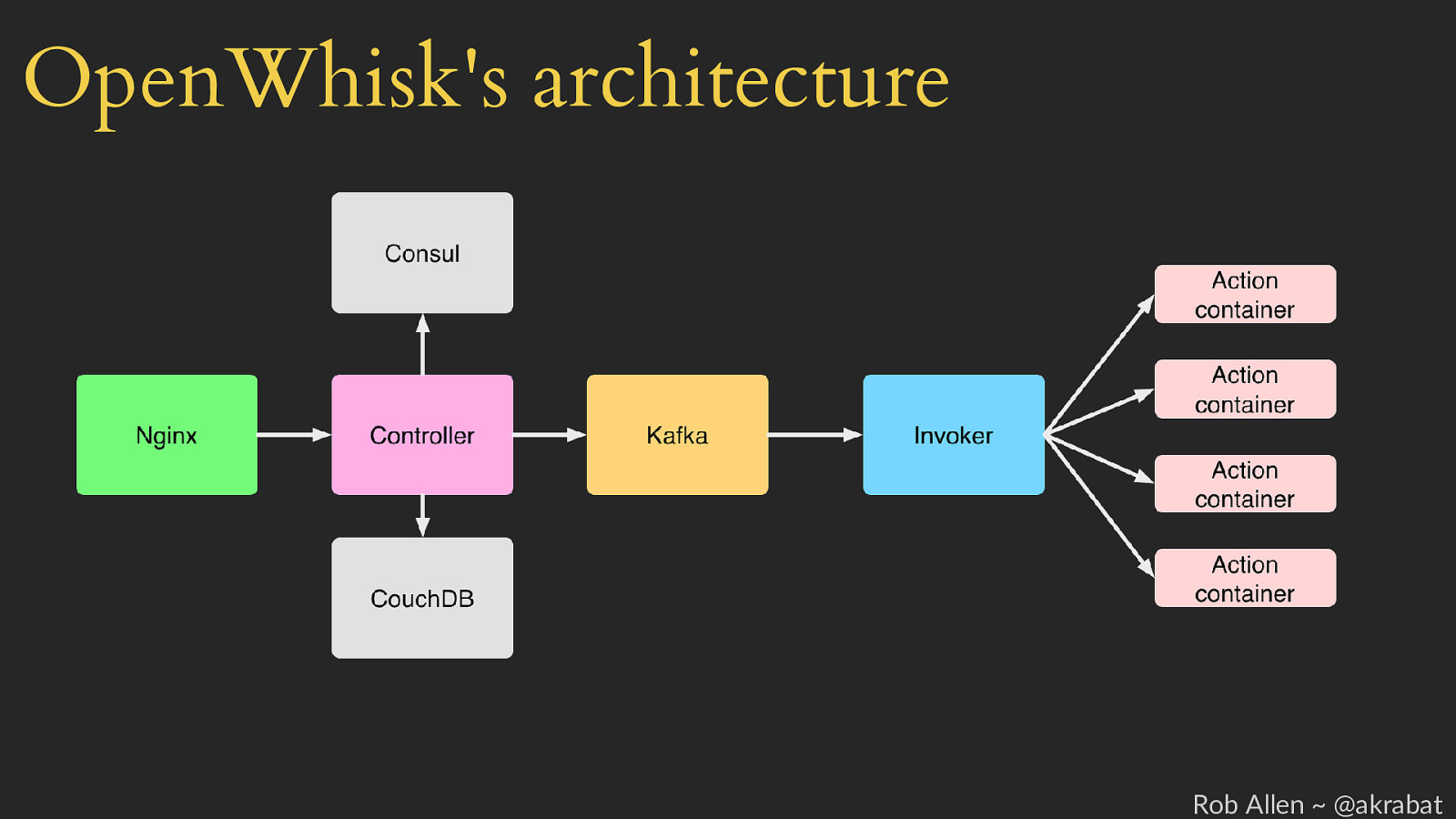
OpenWhisk’s architecture Rob Allen ~ @akrabat
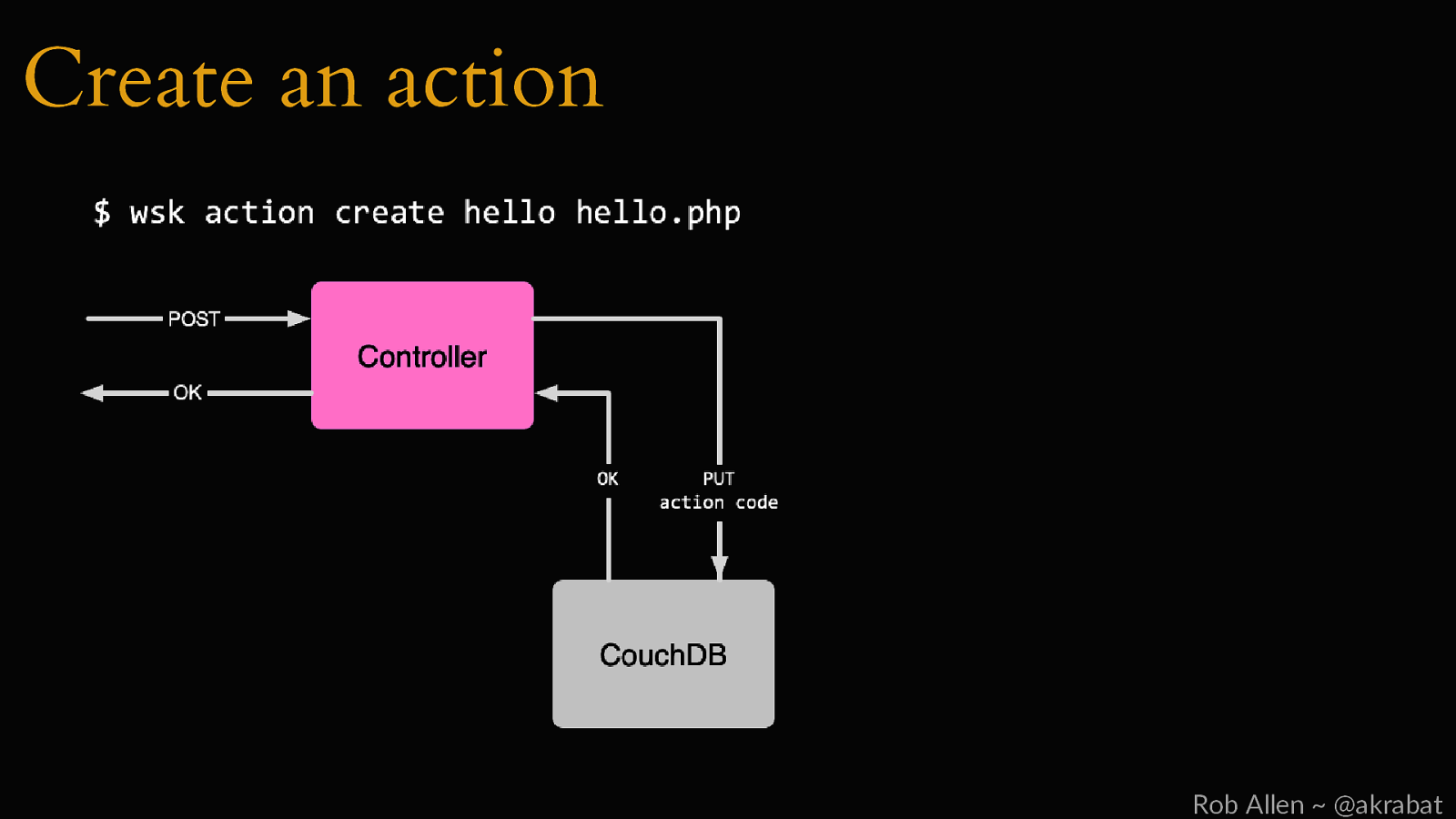
Create an action Rob Allen ~ @akrabat
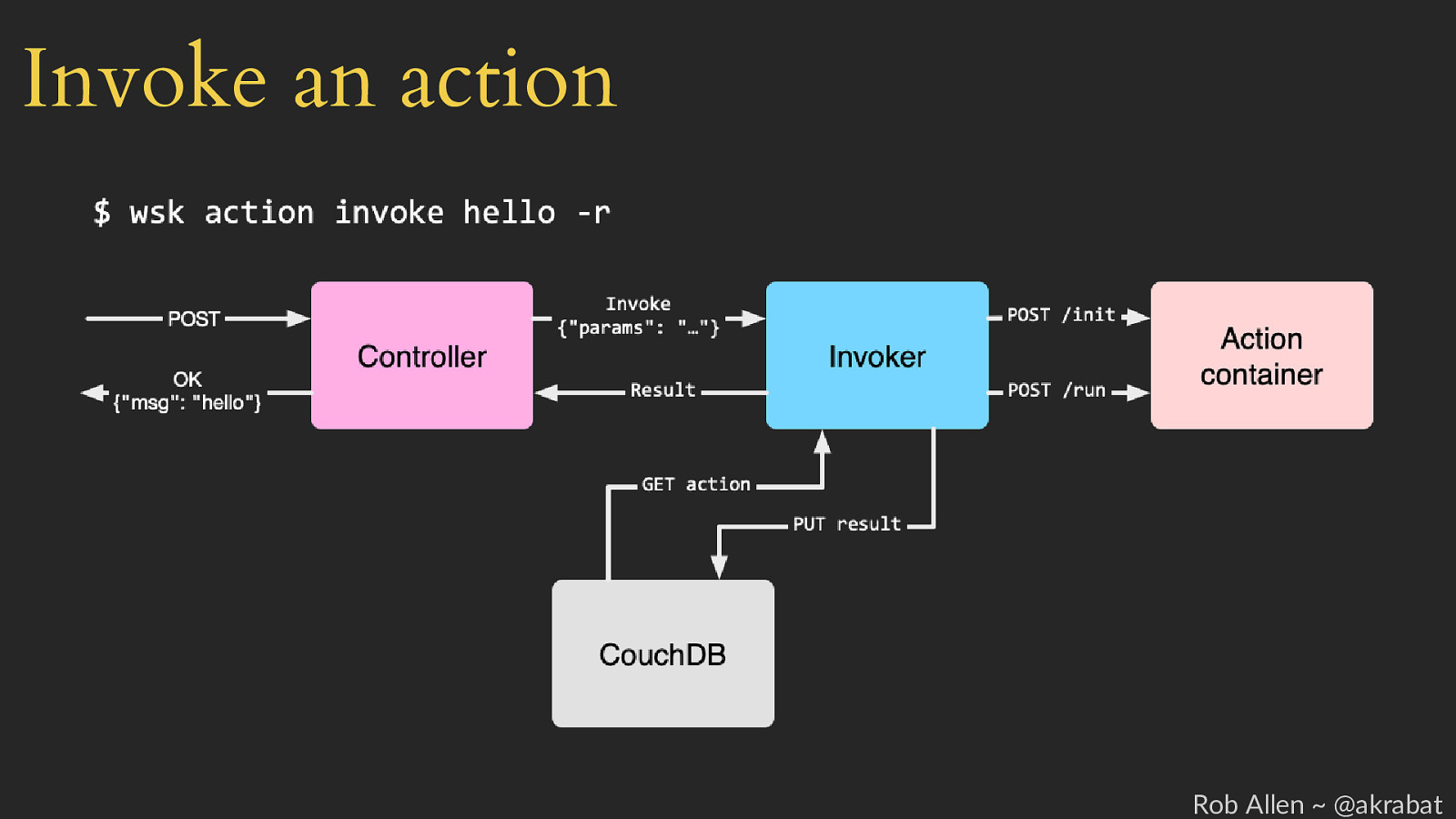
Invoke an action Rob Allen ~ @akrabat
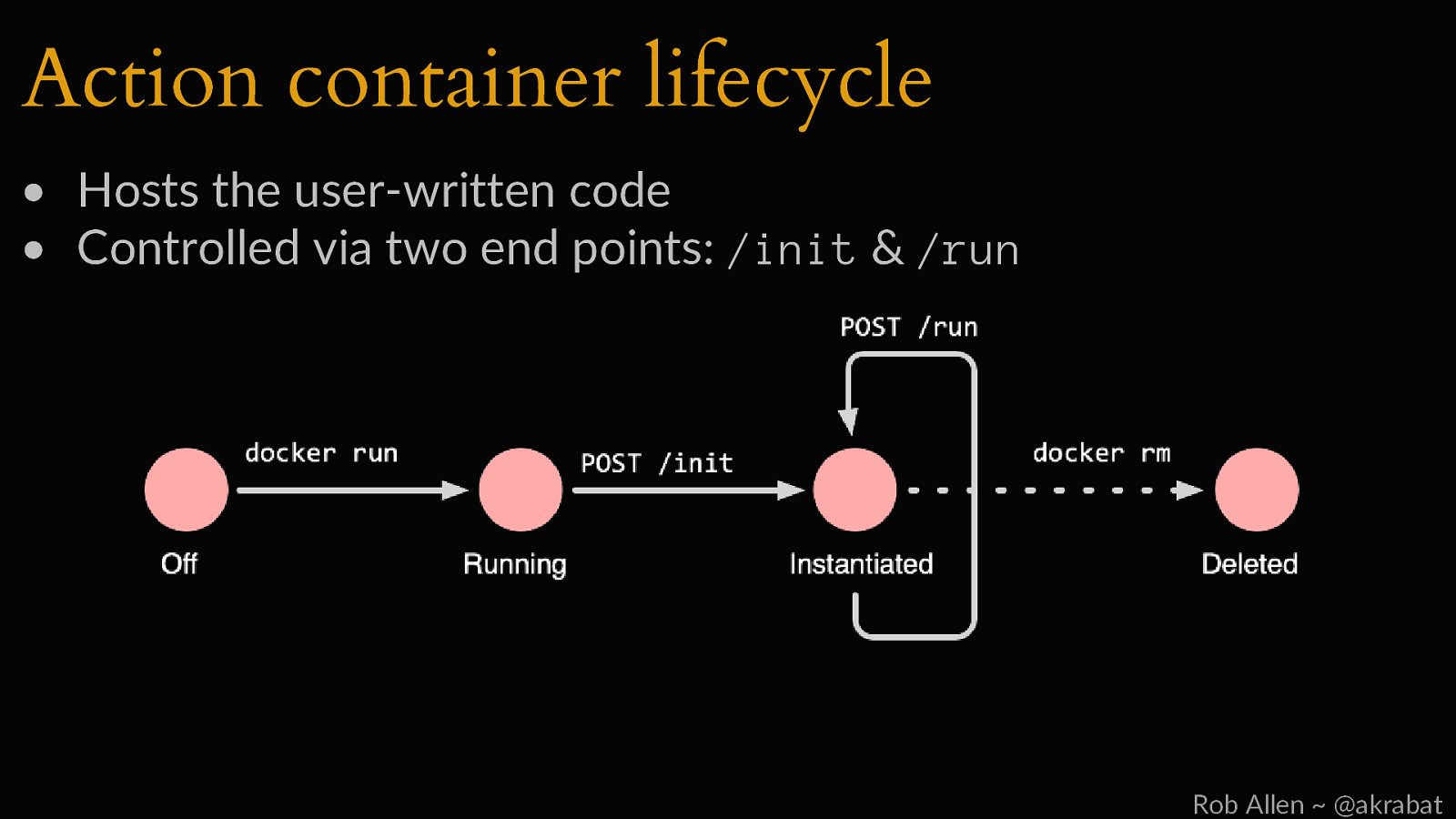
Action container lifecycle • Hosts the user-written code • Controlled via two end points: /init & /run Rob Allen ~ @akrabat
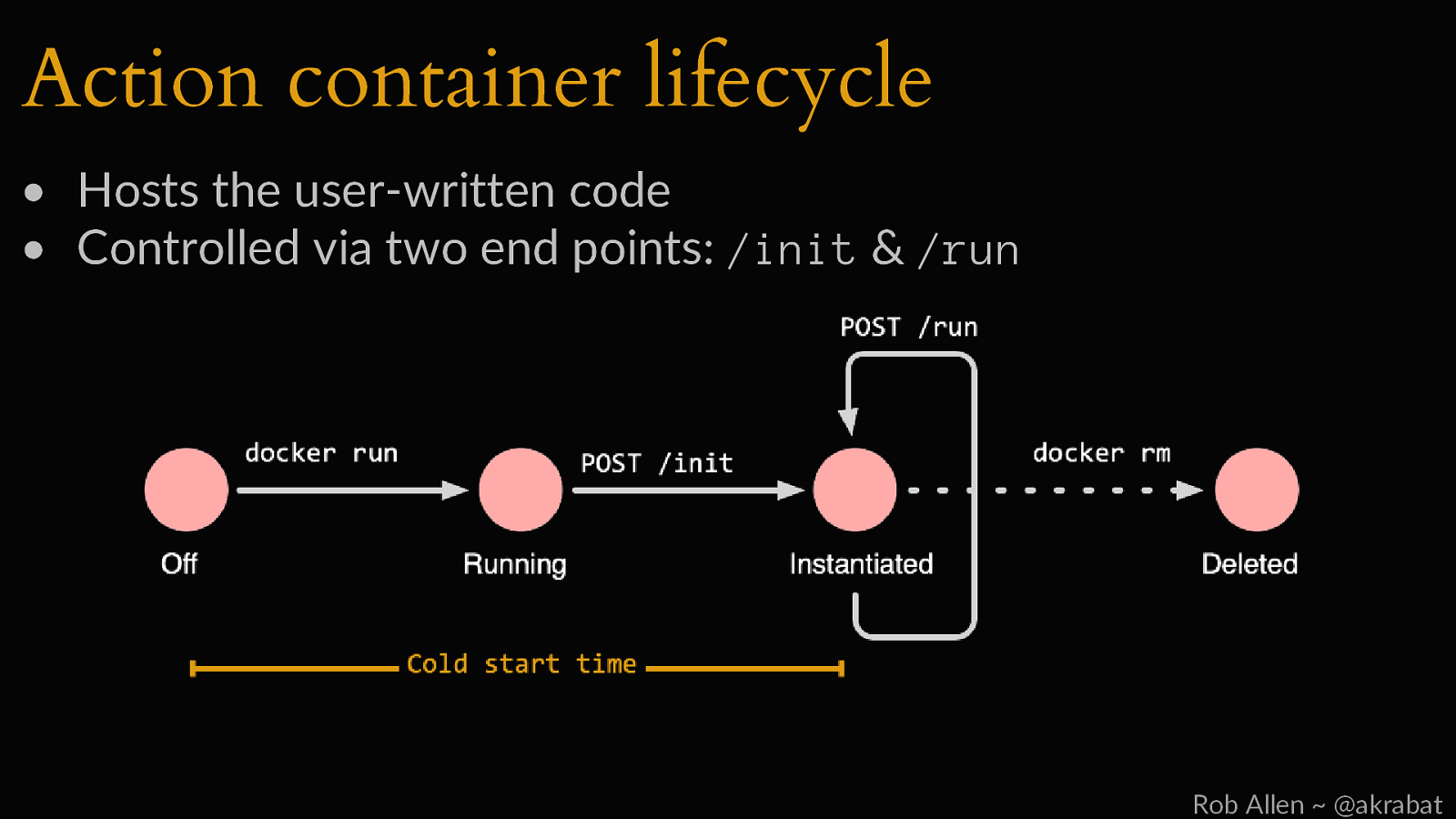
Action container lifecycle • Hosts the user-written code • Controlled via two end points: /init & /run Rob Allen ~ @akrabat
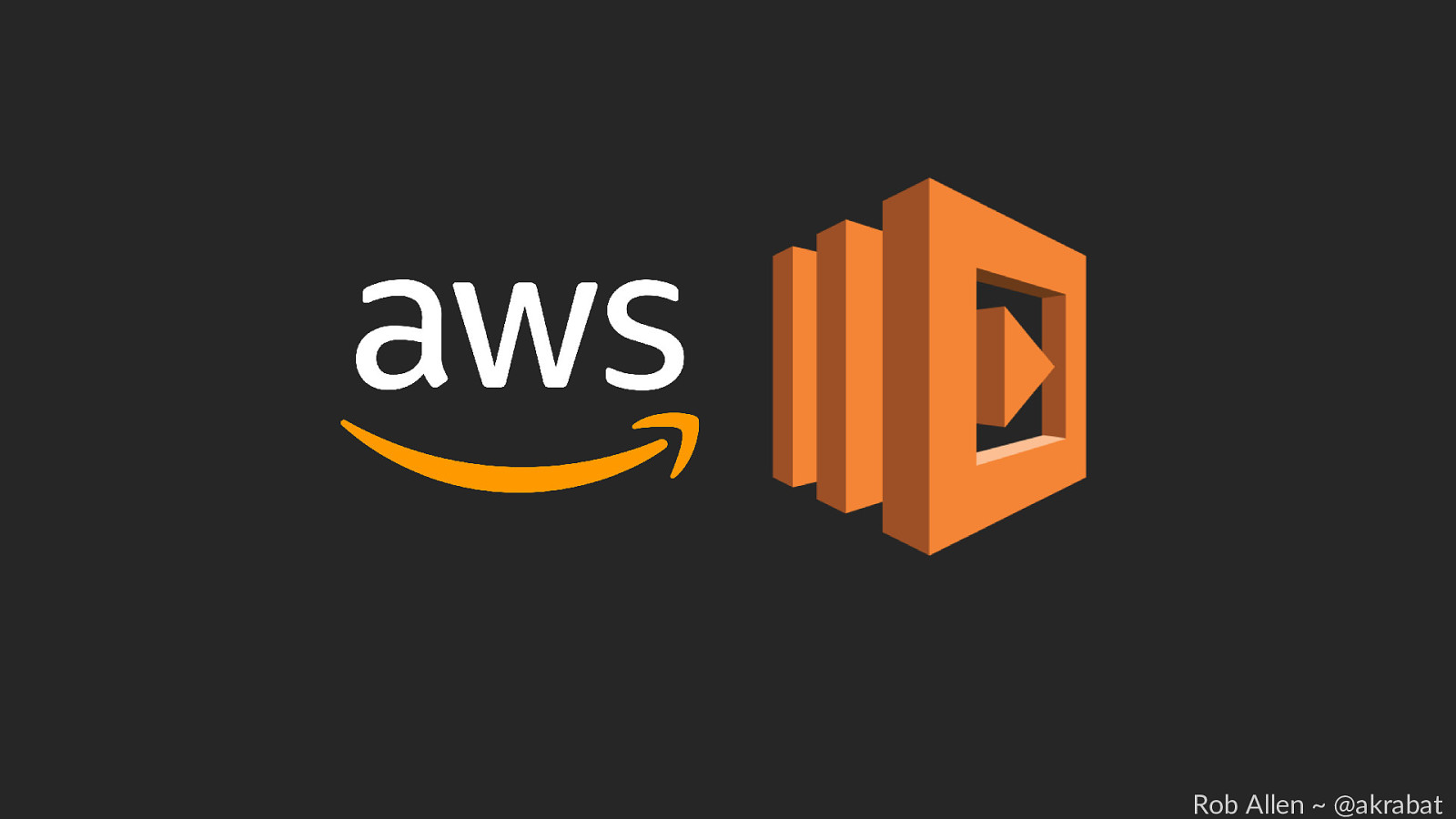
Rob Allen ~ @akrabat
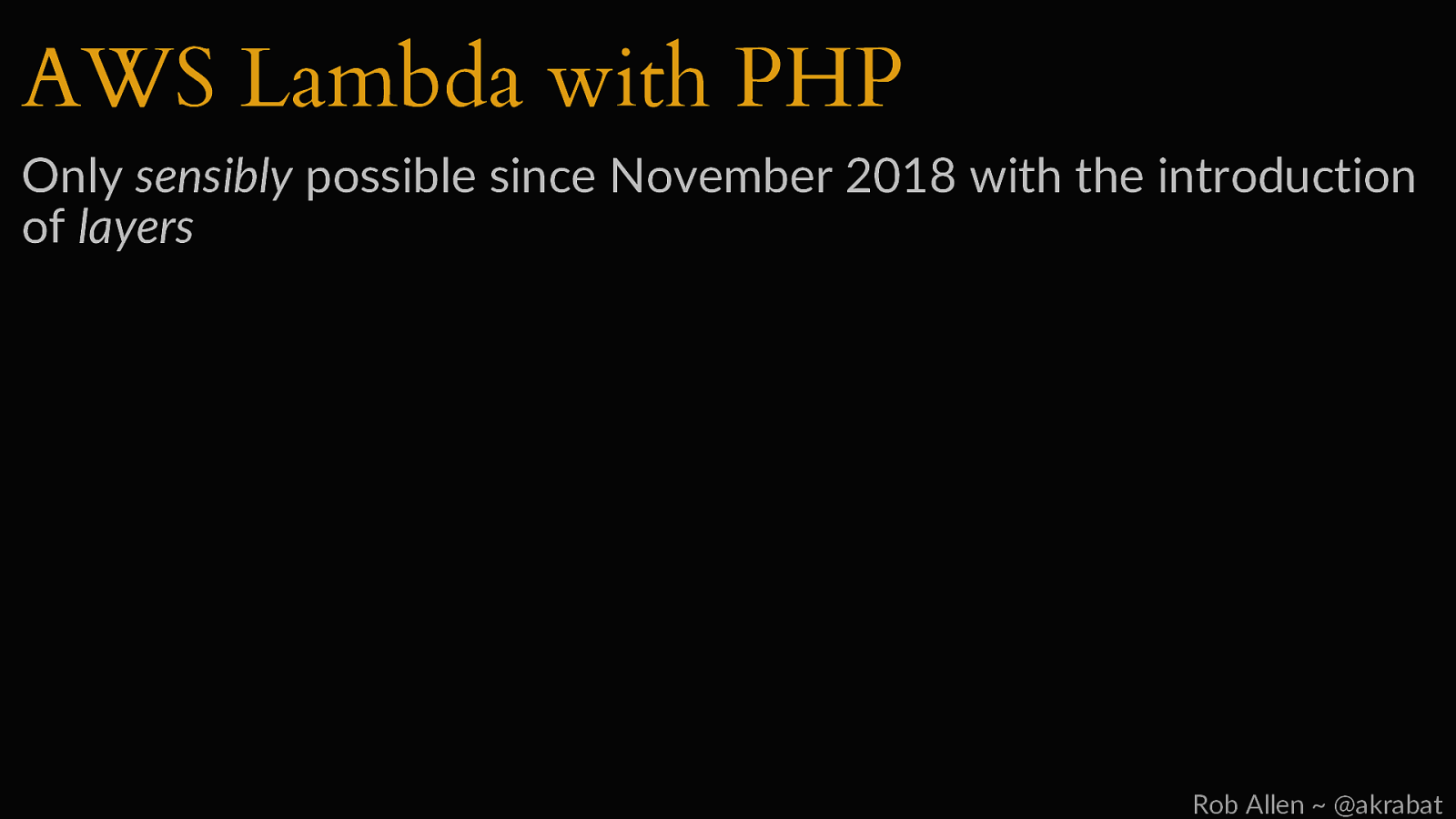
AWS Lambda with PHP Only sensibly possible since November 2018 with the introduction of layers Rob Allen ~ @akrabat
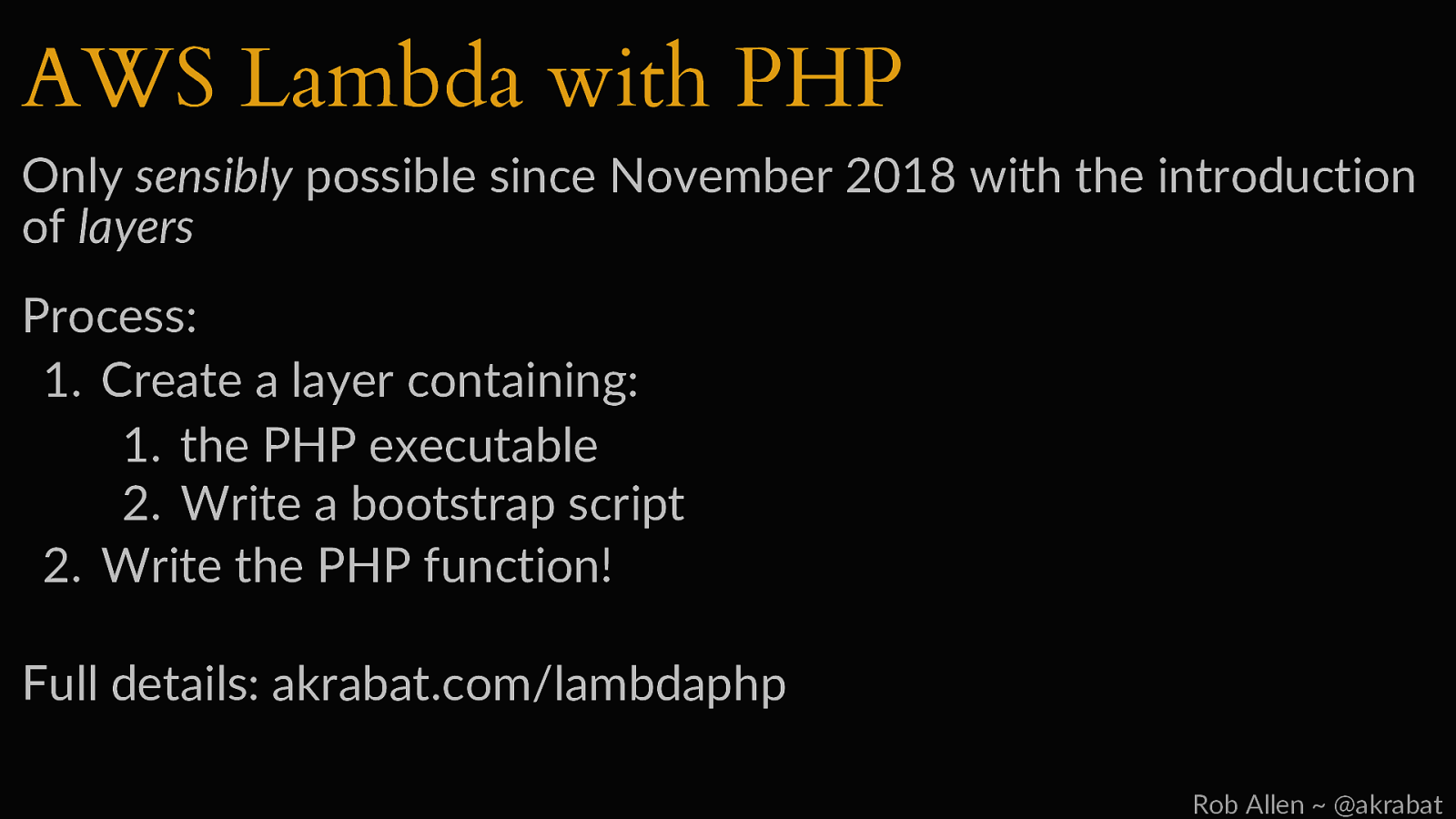
AWS Lambda with PHP Only sensibly possible since November 2018 with the introduction of layers Process: 1. Create a layer containing: 1. the PHP executable 2. Write a bootstrap script 2. Write the PHP function! Full details: akrabat.com/lambdaphp Rob Allen ~ @akrabat
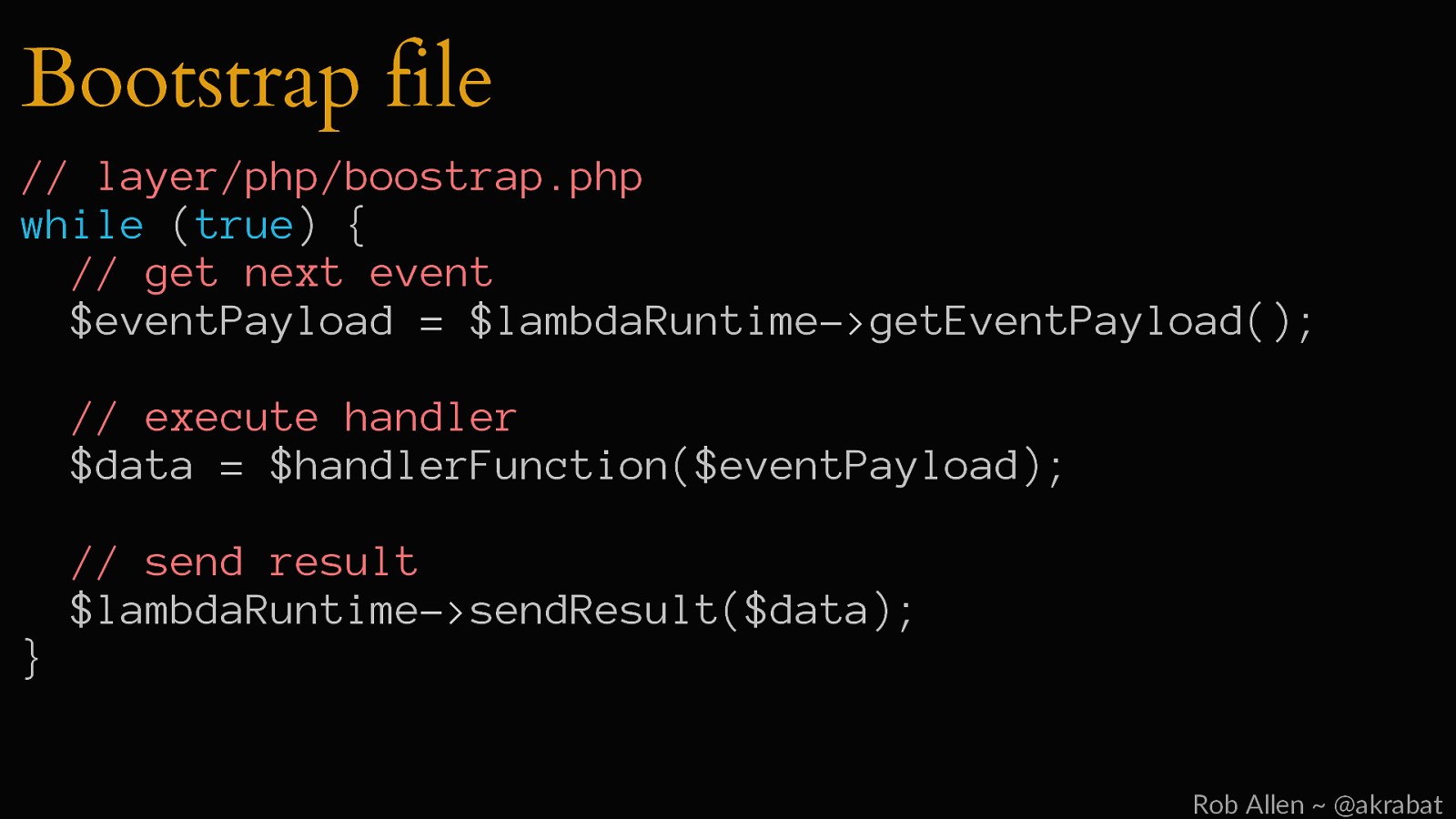
Bootstrap file // layer/php/boostrap.php while (true) { // get next event $eventPayload = $lambdaRuntime->getEventPayload(); // execute handler $data = $handlerFunction($eventPayload); // send result $lambdaRuntime->sendResult($data); } Rob Allen ~ @akrabat
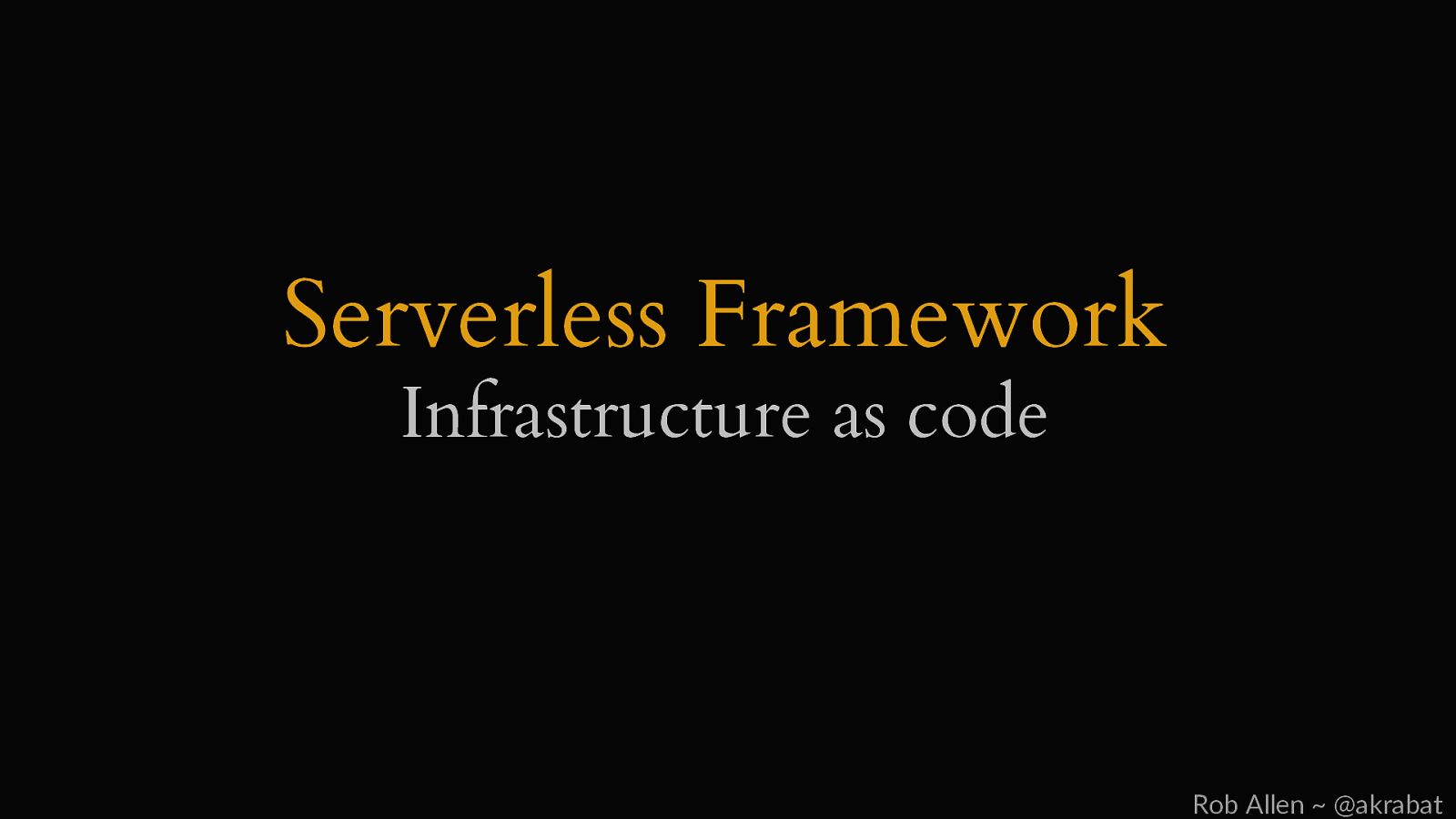
Serverless Framework Infrastructure as code Rob Allen ~ @akrabat
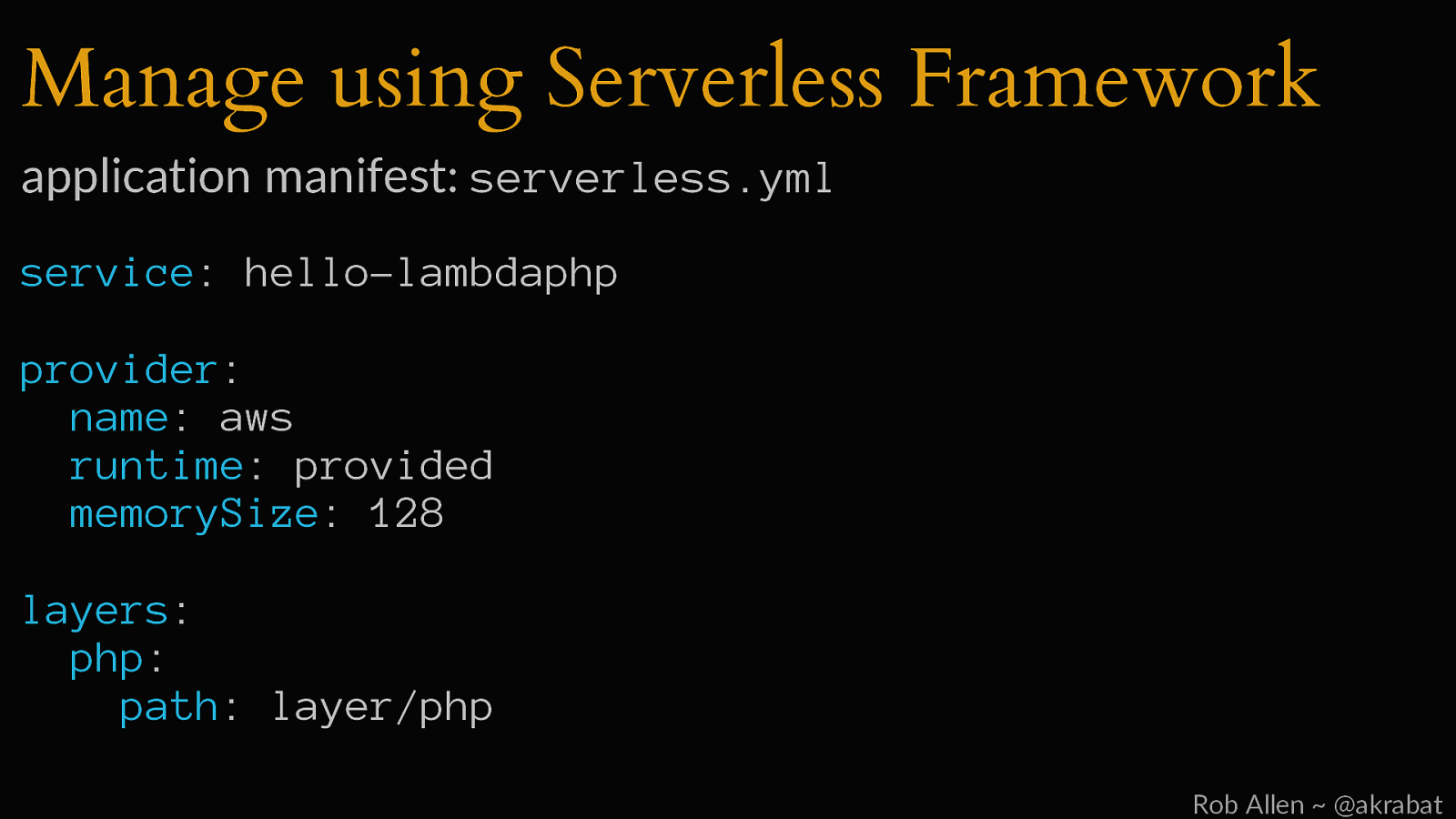
Manage using Serverless Framework application manifest: serverless.yml service: hello-lambdaphp provider: name: aws runtime: provided memorySize: 128 layers: php: path: layer/php Rob Allen ~ @akrabat
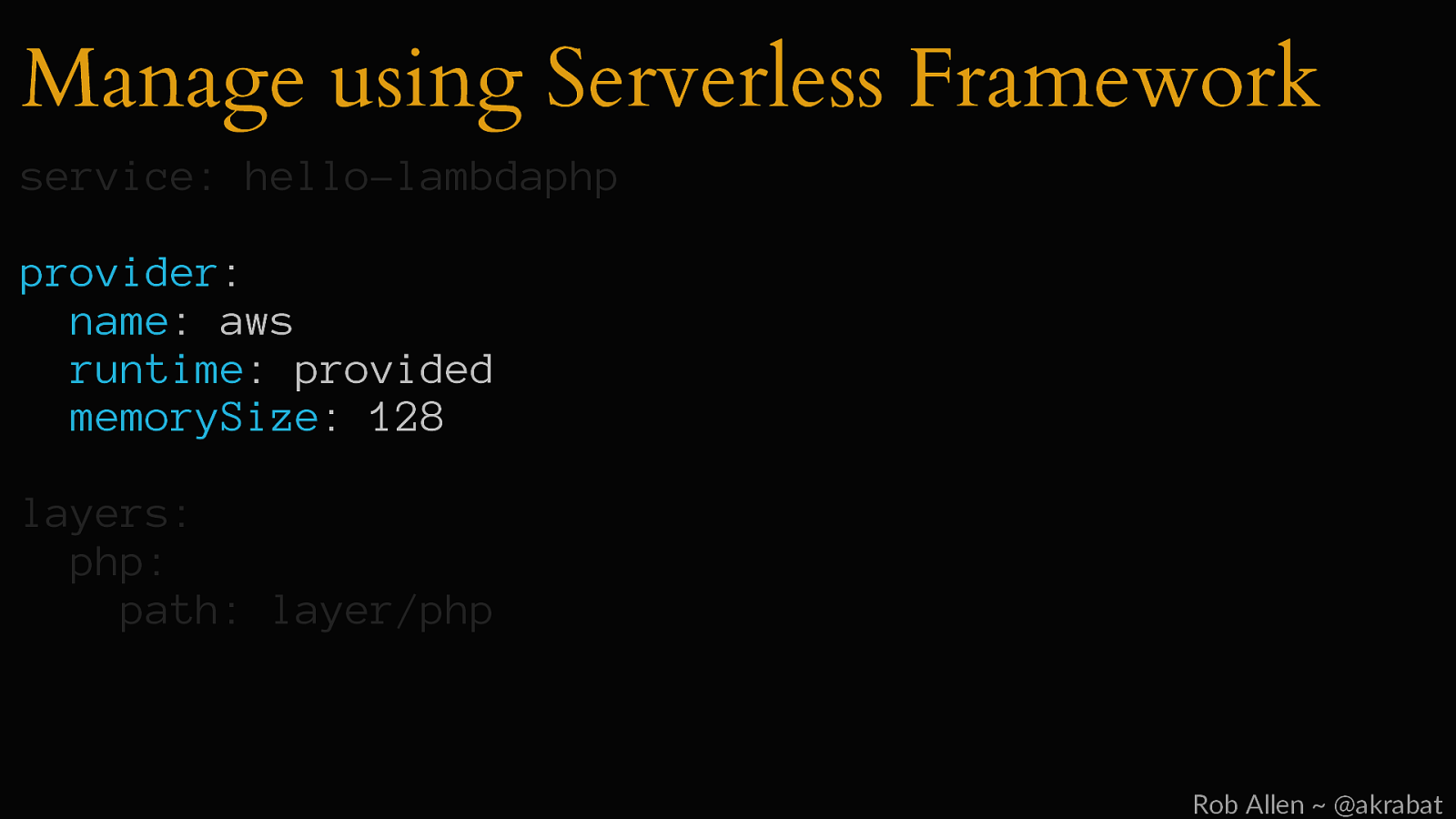
Manage using Serverless Framework service: hello-lambdaphp provider: name: aws runtime: provided memorySize: 128 layers: php: path: layer/php Rob Allen ~ @akrabat
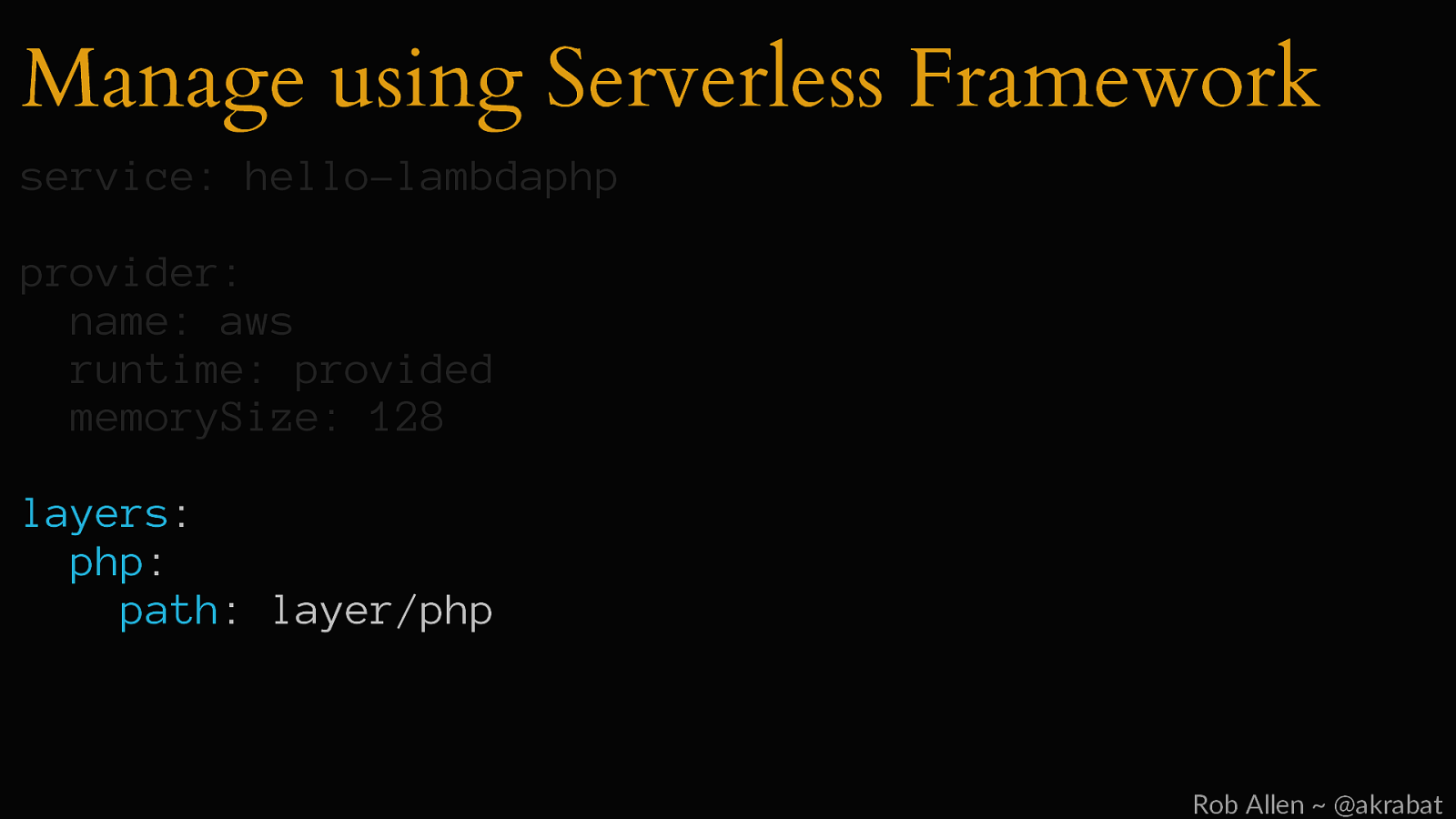
Manage using Serverless Framework service: hello-lambdaphp provider: name: aws runtime: provided memorySize: 128 layers: php: path: layer/php Rob Allen ~ @akrabat
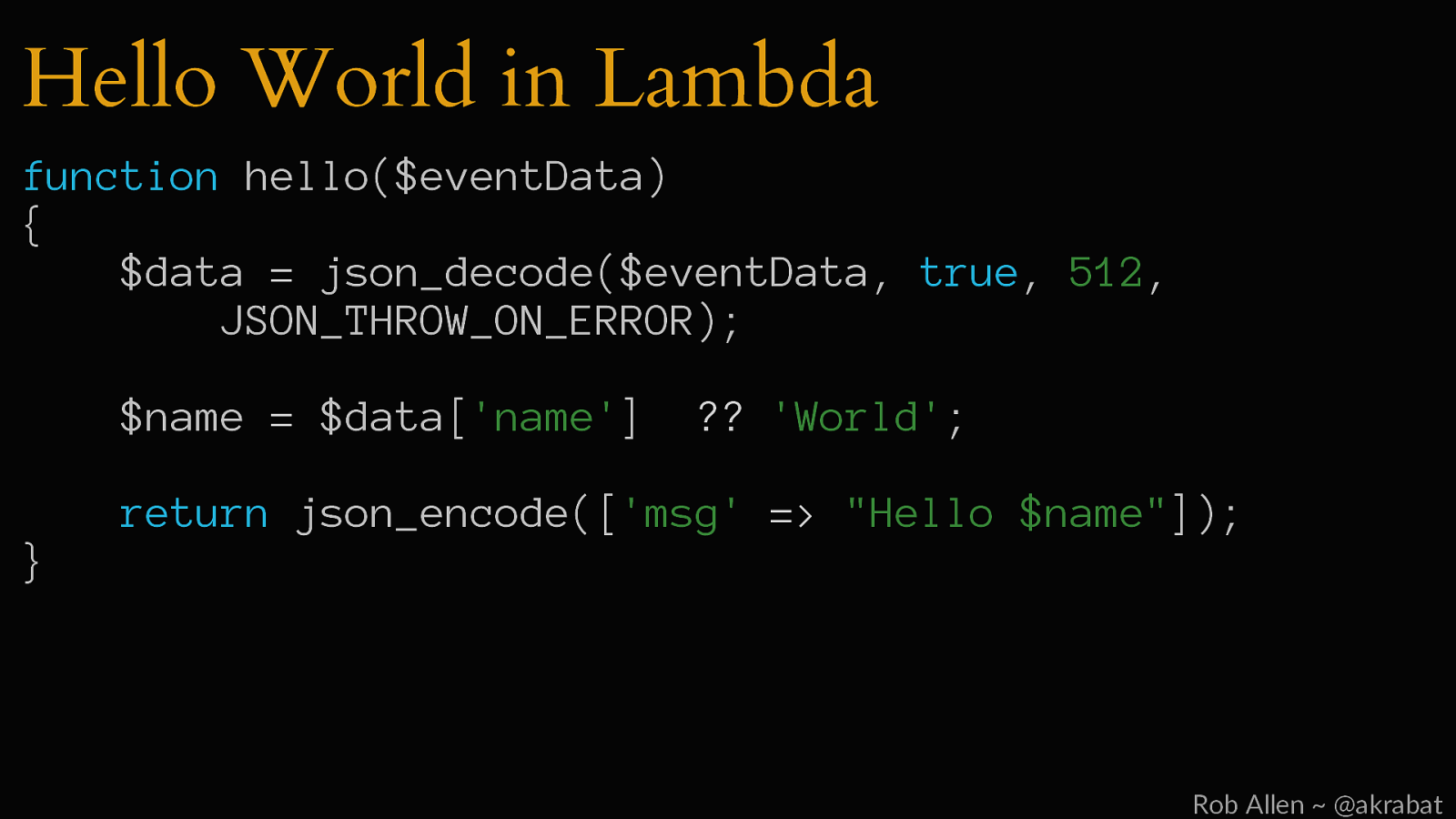
Hello World in Lambda function hello($eventData) { $data = json_decode($eventData, true, 512, JSON_THROW_ON_ERROR); $name = $data[‘name’] ?? ‘World’; return json_encode([‘msg’ => “Hello $name”]); } Rob Allen ~ @akrabat
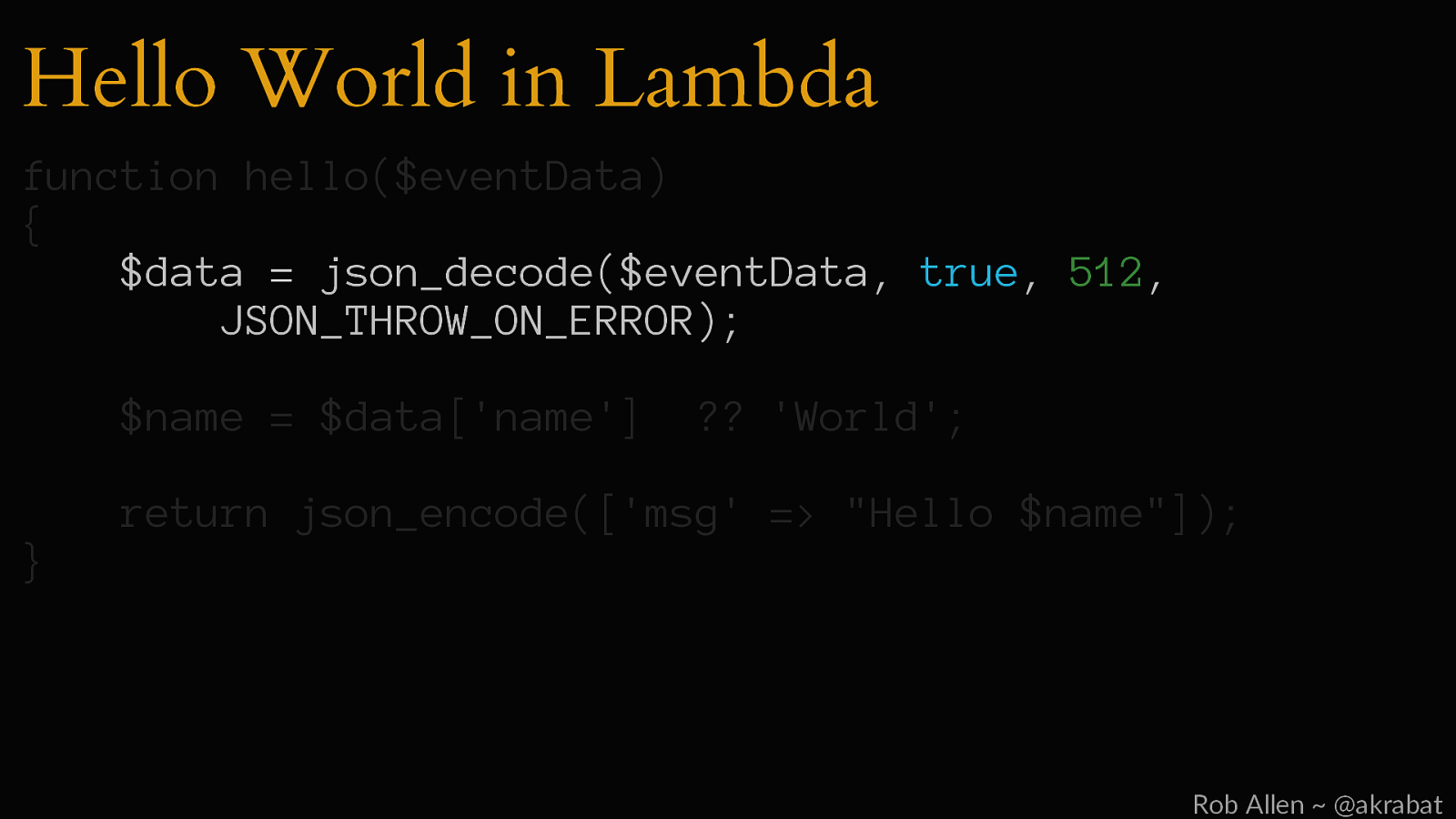
Hello World in Lambda function hello($eventData) { $data = json_decode($eventData, true, 512, JSON_THROW_ON_ERROR); $name = $data[‘name’] ?? ‘World’; return json_encode([‘msg’ => “Hello $name”]); } Rob Allen ~ @akrabat
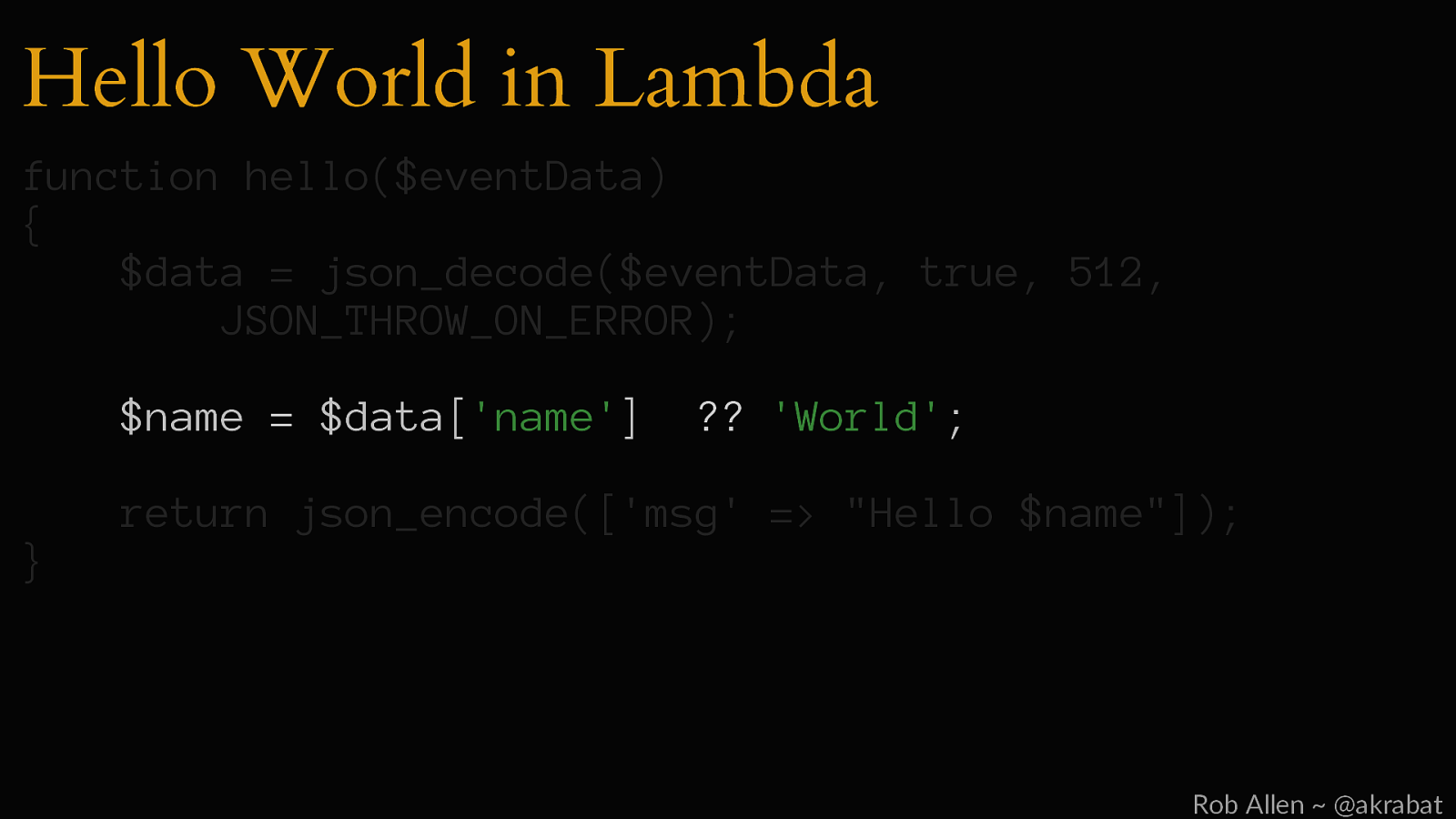
Hello World in Lambda function hello($eventData) { $data = json_decode($eventData, true, 512, JSON_THROW_ON_ERROR); $name = $data[‘name’] ?? ‘World’; return json_encode([‘msg’ => “Hello $name”]); } Rob Allen ~ @akrabat
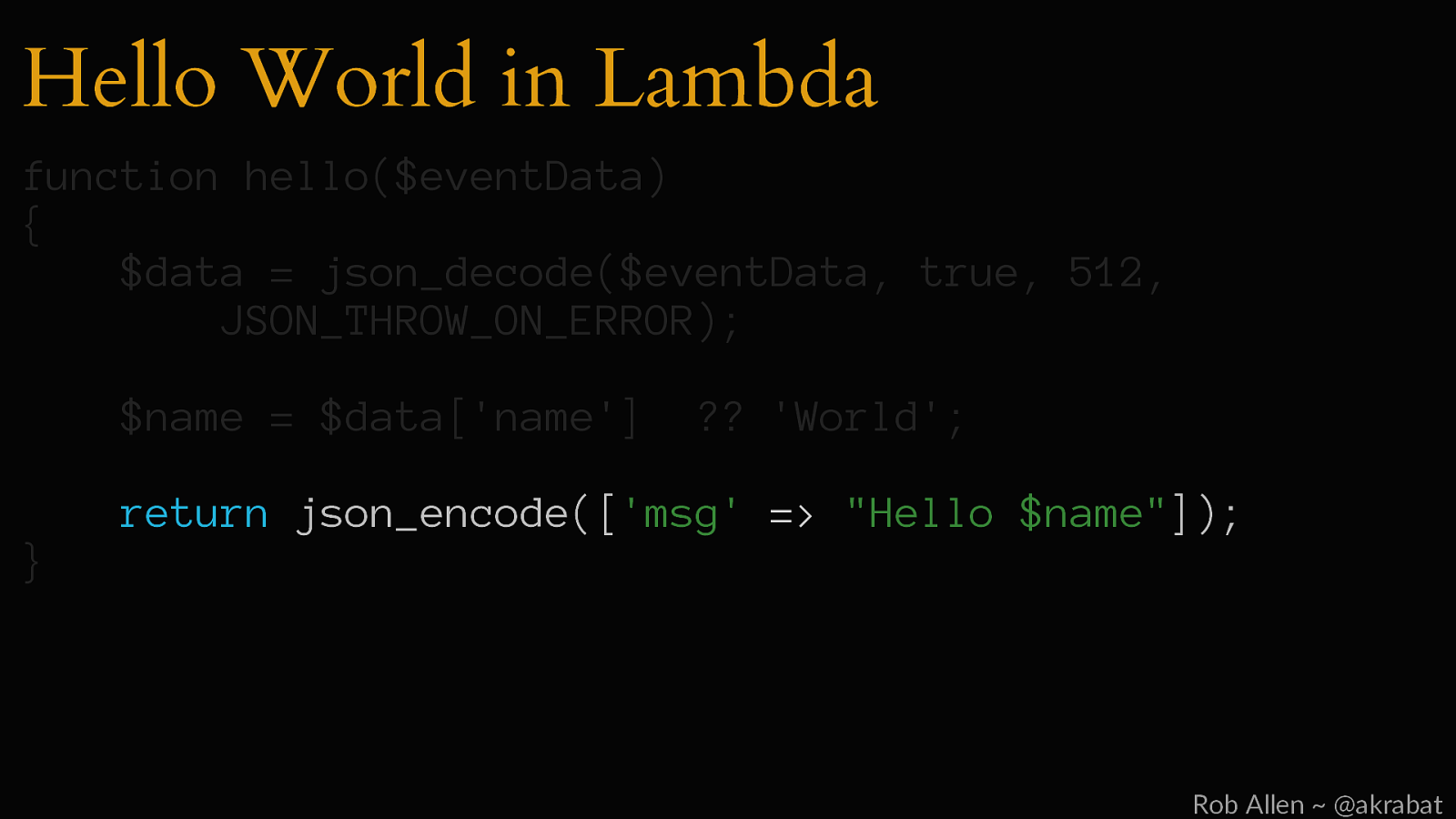
Hello World in Lambda function hello($eventData) { $data = json_decode($eventData, true, 512, JSON_THROW_ON_ERROR); $name = $data[‘name’] ?? ‘World’; return json_encode([‘msg’ => “Hello $name”]); } Rob Allen ~ @akrabat
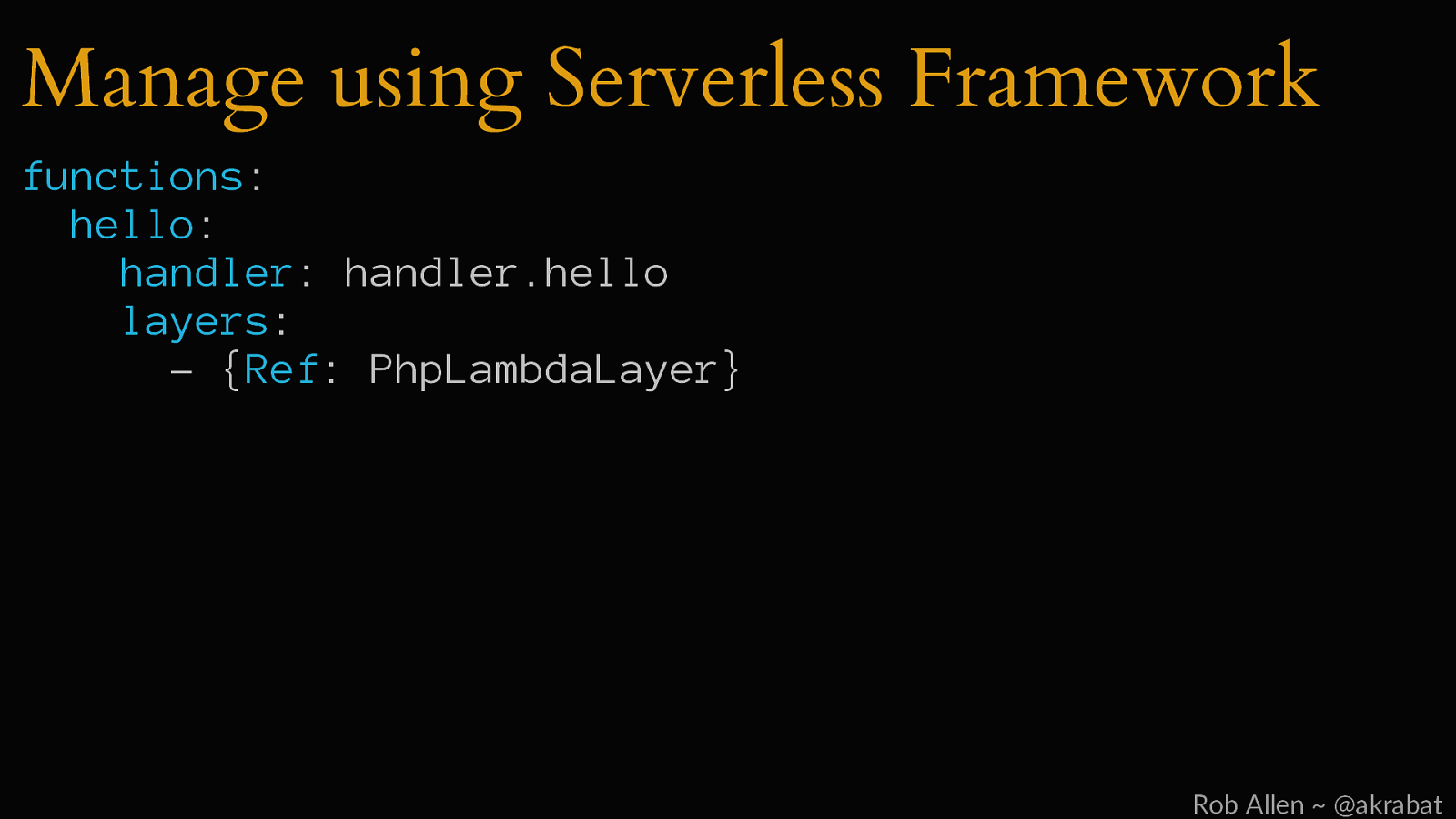
Manage using Serverless Framework functions: hello: handler: handler.hello layers: - {Ref: PhpLambdaLayer} Rob Allen ~ @akrabat
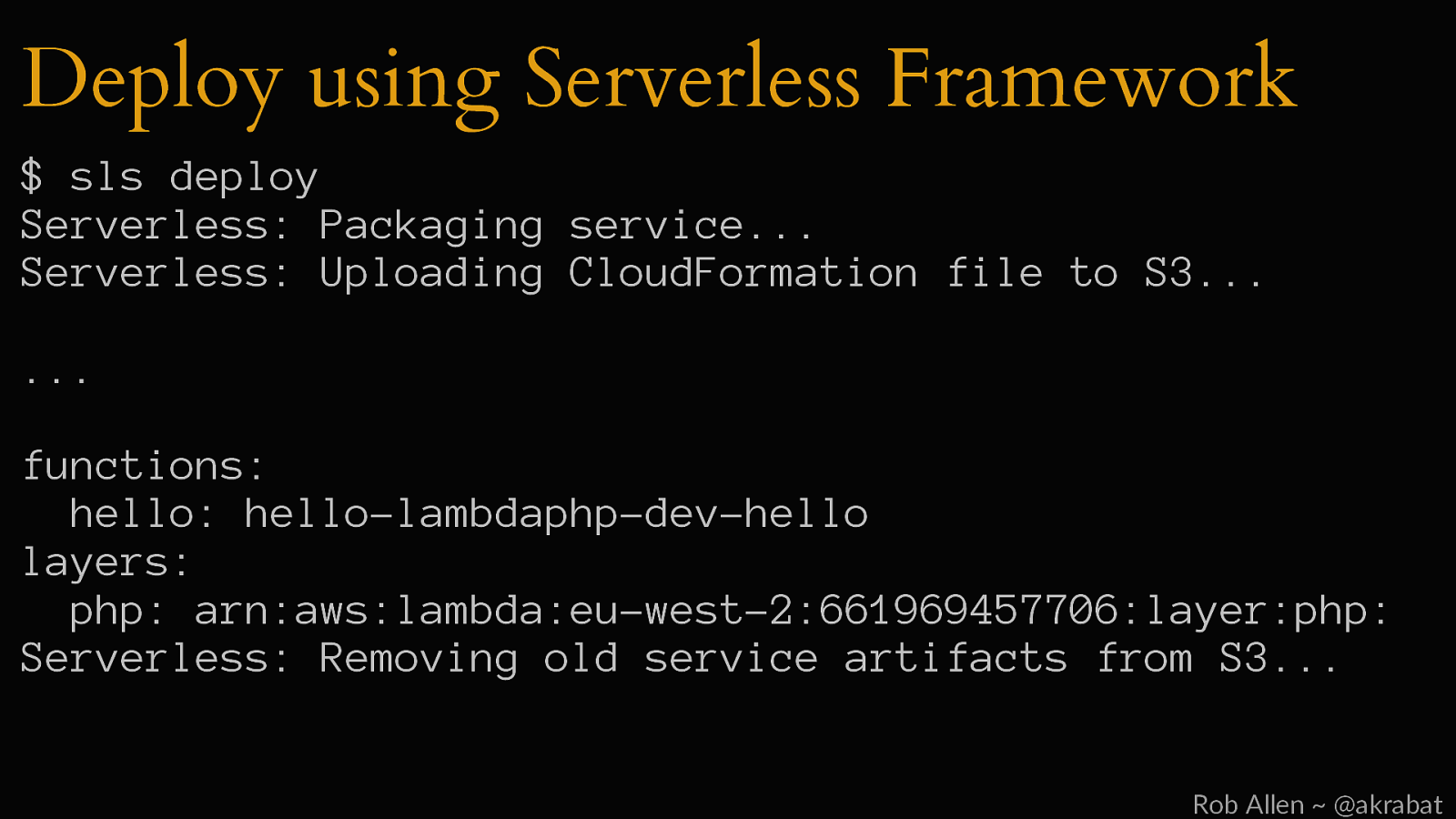
Deploy using Serverless Framework $ sls deploy Serverless: Packaging service… Serverless: Uploading CloudFormation file to S3… … functions: hello: hello-lambdaphp-dev-hello layers: php: arn:aws:lambda:eu-west-2:661969457706:layer:php: Serverless: Removing old service artifacts from S3… Rob Allen ~ @akrabat
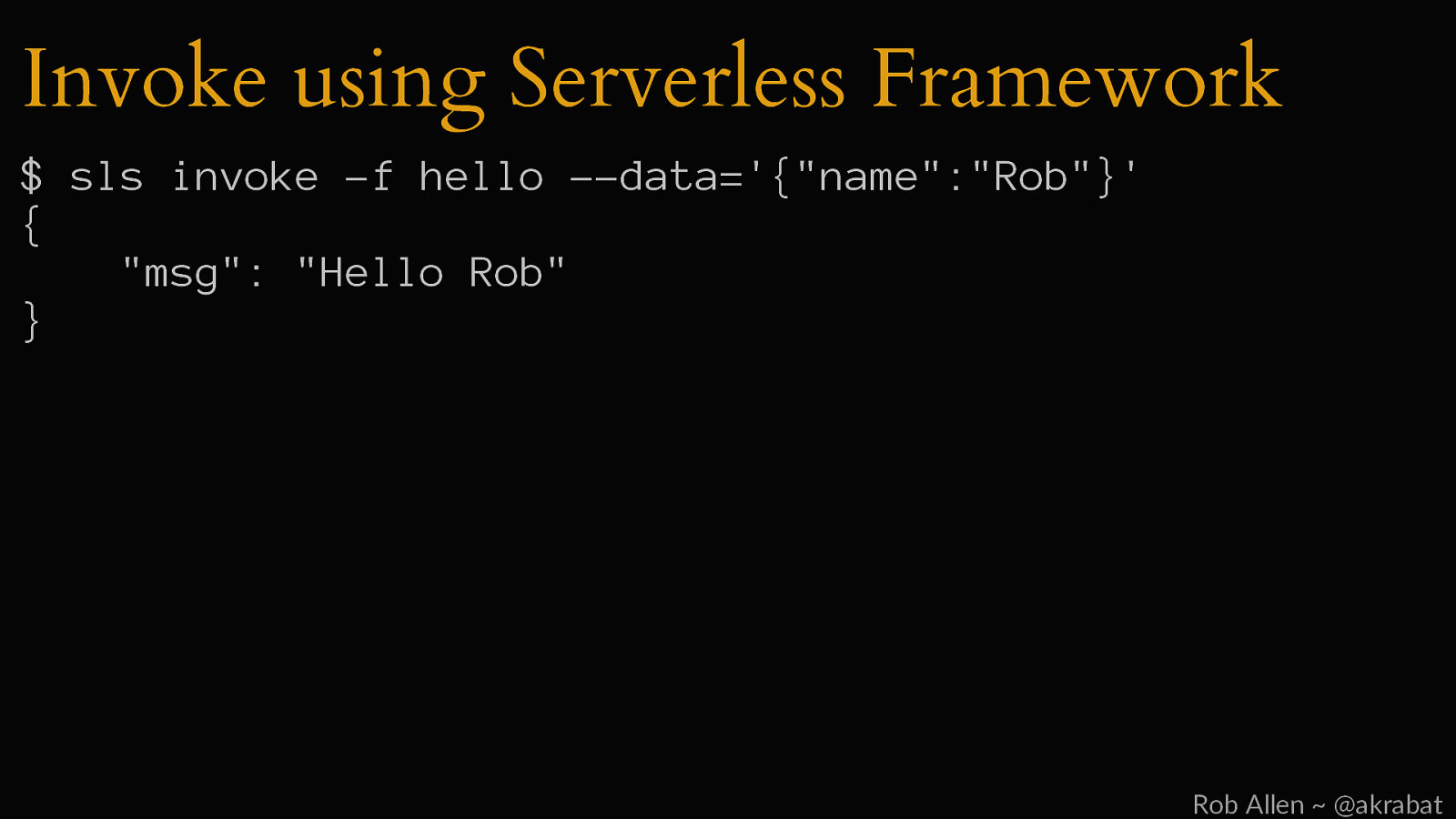
Invoke using Serverless Framework $ sls invoke -f hello —data=’{“name”:”Rob”}’ { “msg”: “Hello Rob” } Rob Allen ~ @akrabat
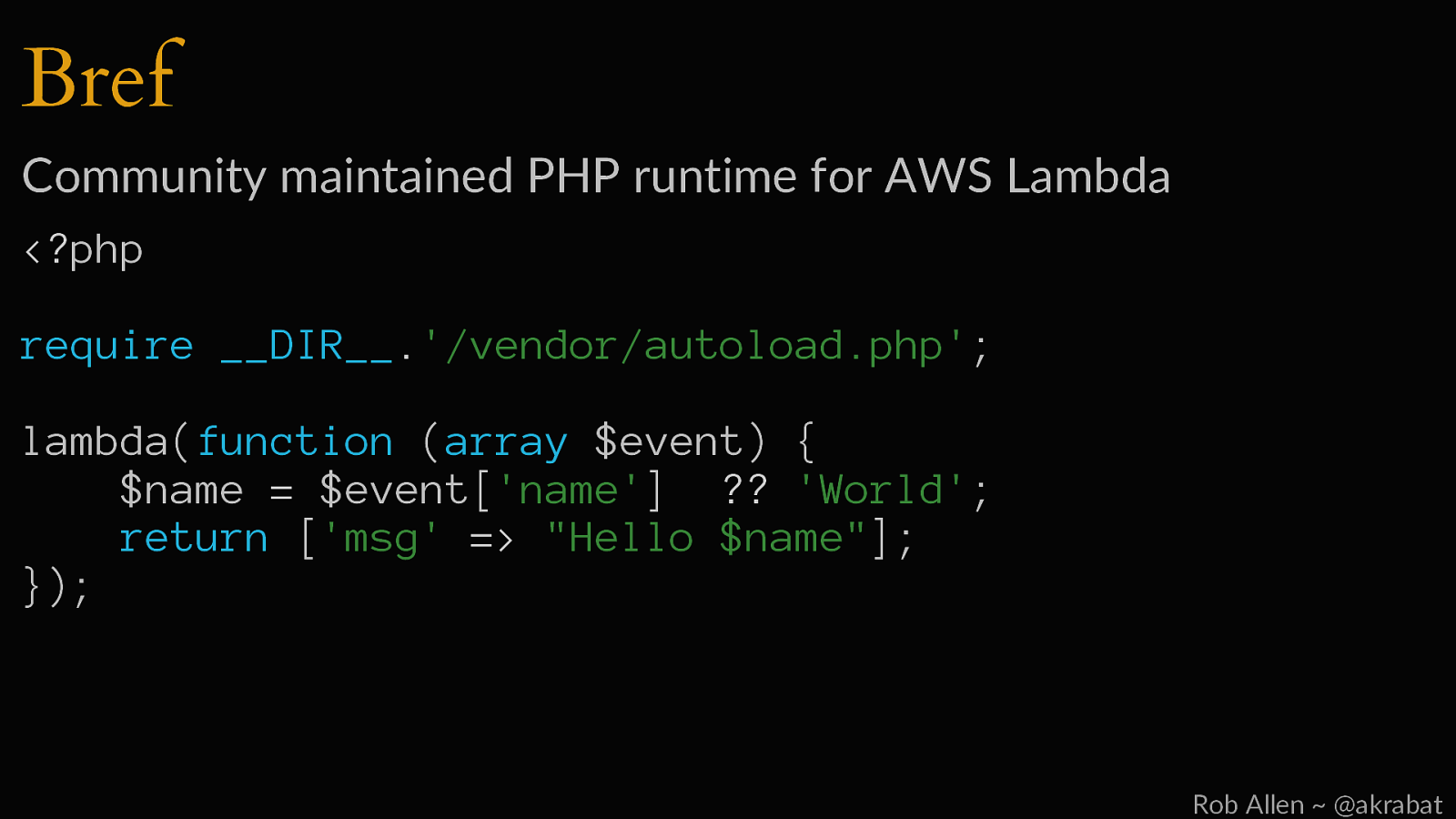
Bref Community maintained PHP runtime for AWS Lambda <?php require DIR.’/vendor/autoload.php’; lambda(function (array $event) { $name = $event[‘name’] ?? ‘World’; return [‘msg’ => “Hello $name”]; }); Rob Allen ~ @akrabat
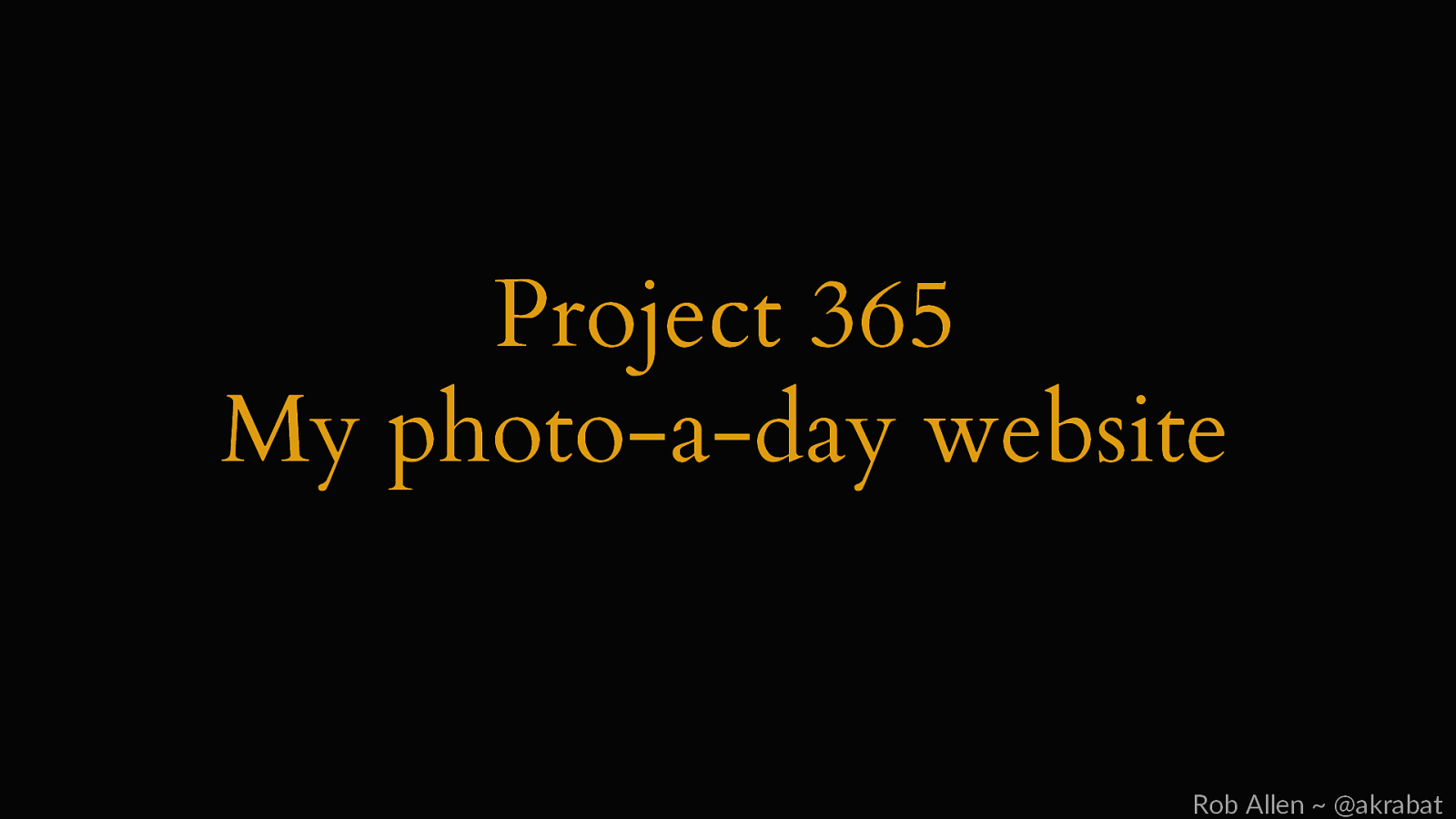
Project 365 My photo-a-day website Rob Allen ~ @akrabat
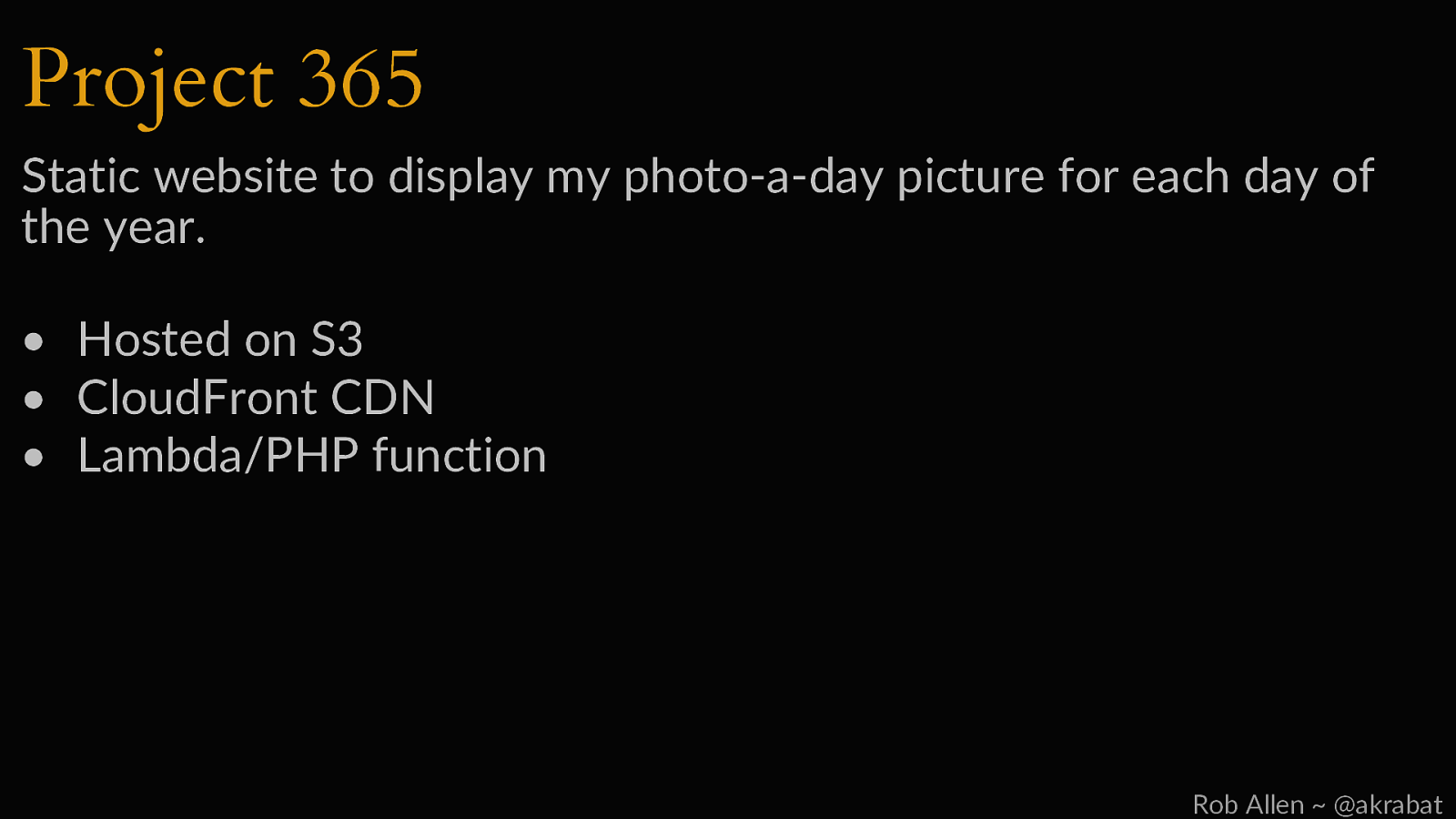
Project 365 Static website to display my photo-a-day picture for each day of the year. • Hosted on S3 • CloudFront CDN • Lambda/PHP function Rob Allen ~ @akrabat
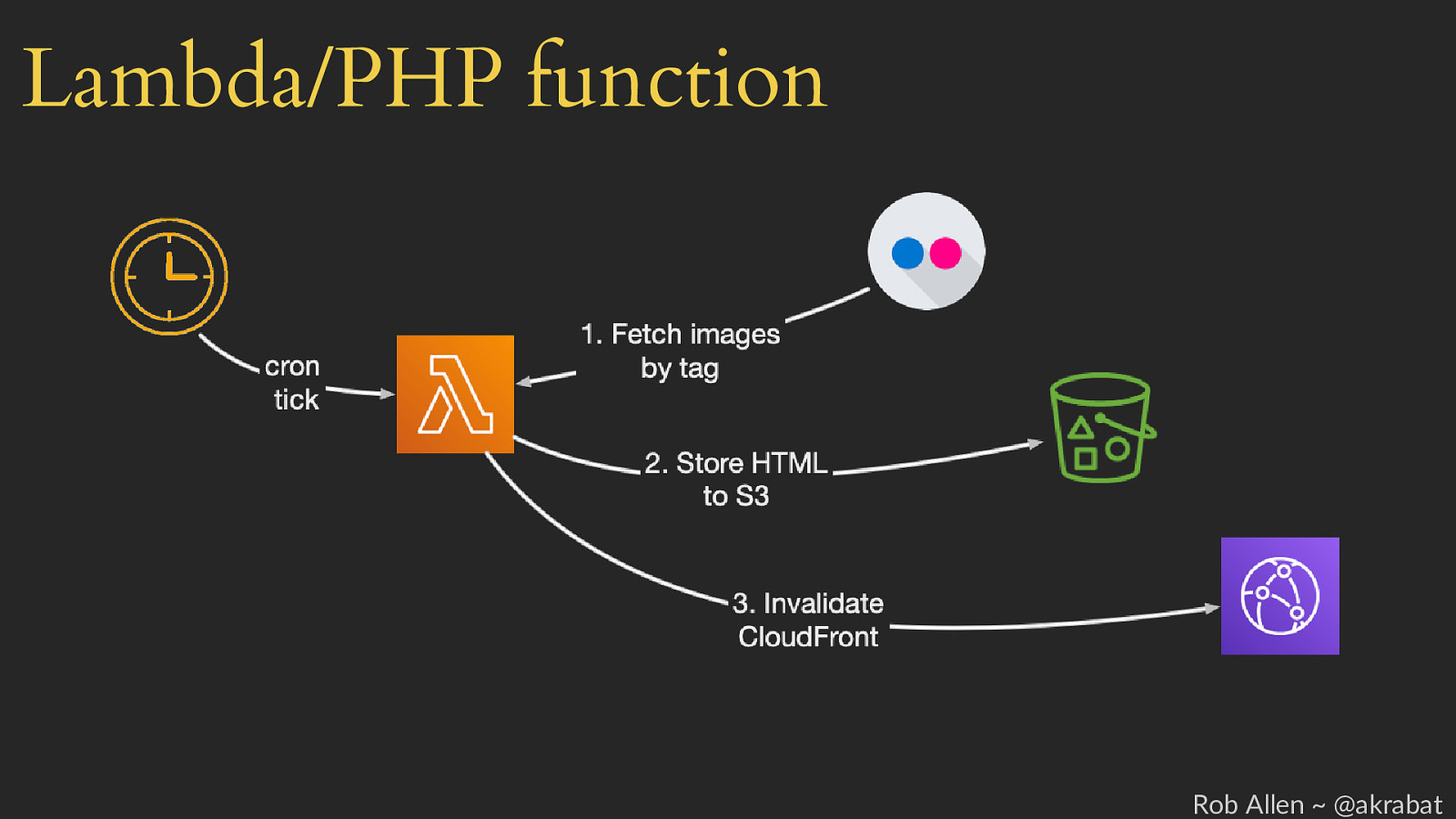
Lambda/PHP function Rob Allen ~ @akrabat
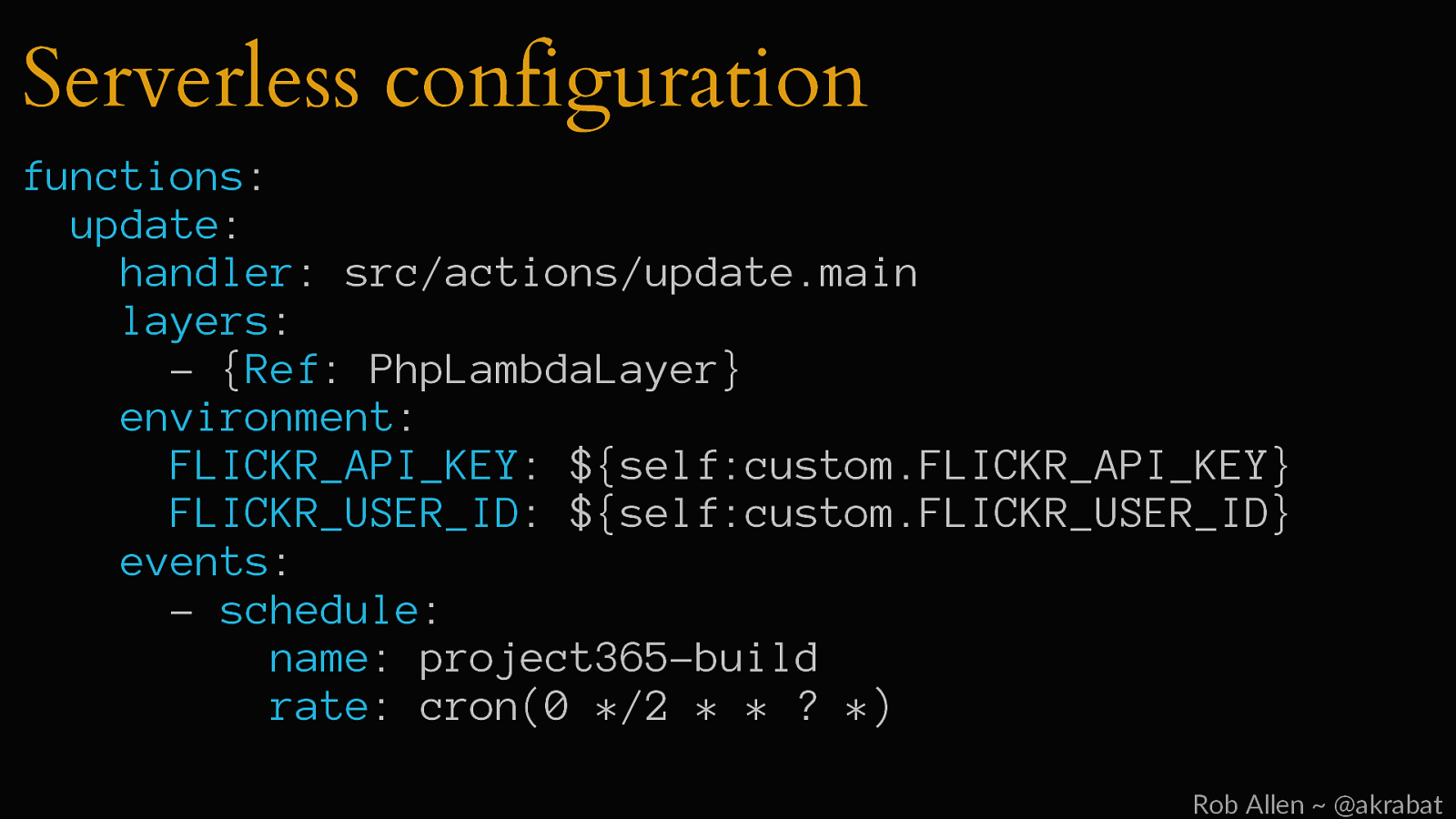
Serverless configuration functions: update: handler: src/actions/update.main layers: - {Ref: PhpLambdaLayer} environment: FLICKR_API_KEY: ${self:custom.FLICKR_API_KEY} FLICKR_USER_ID: ${self:custom.FLICKR_USER_ID} events: - schedule: name: project365-build rate: cron(0 */2 * * ? *) Rob Allen ~ @akrabat
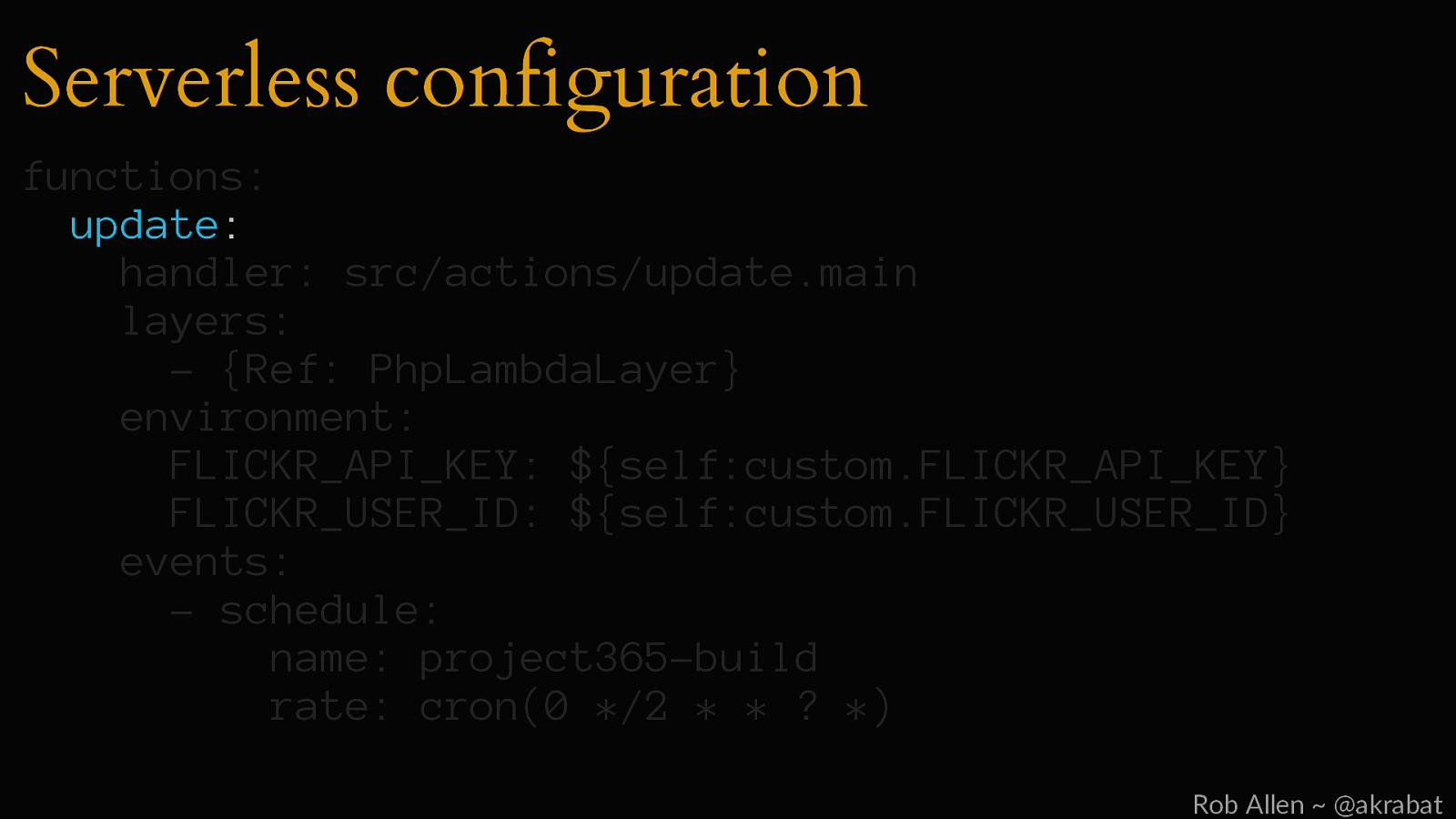
Serverless configuration functions: update: handler: src/actions/update.main layers: - {Ref: PhpLambdaLayer} environment: FLICKR_API_KEY: ${self:custom.FLICKR_API_KEY} FLICKR_USER_ID: ${self:custom.FLICKR_USER_ID} events: - schedule: name: project365-build rate: cron(0 */2 * * ? *) Rob Allen ~ @akrabat
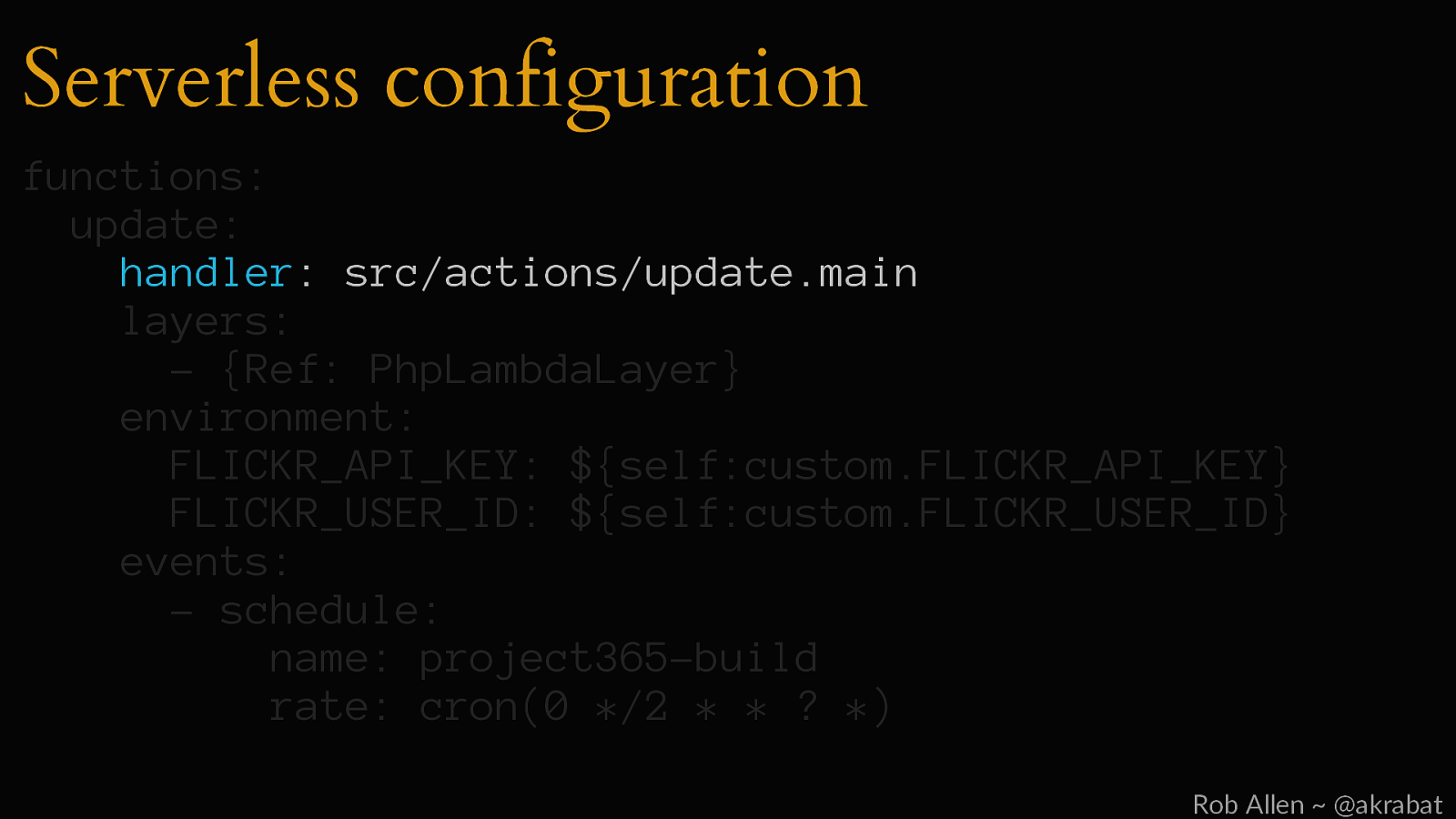
Serverless configuration functions: update: handler: src/actions/update.main layers: - {Ref: PhpLambdaLayer} environment: FLICKR_API_KEY: ${self:custom.FLICKR_API_KEY} FLICKR_USER_ID: ${self:custom.FLICKR_USER_ID} events: - schedule: name: project365-build rate: cron(0 */2 * * ? *) Rob Allen ~ @akrabat
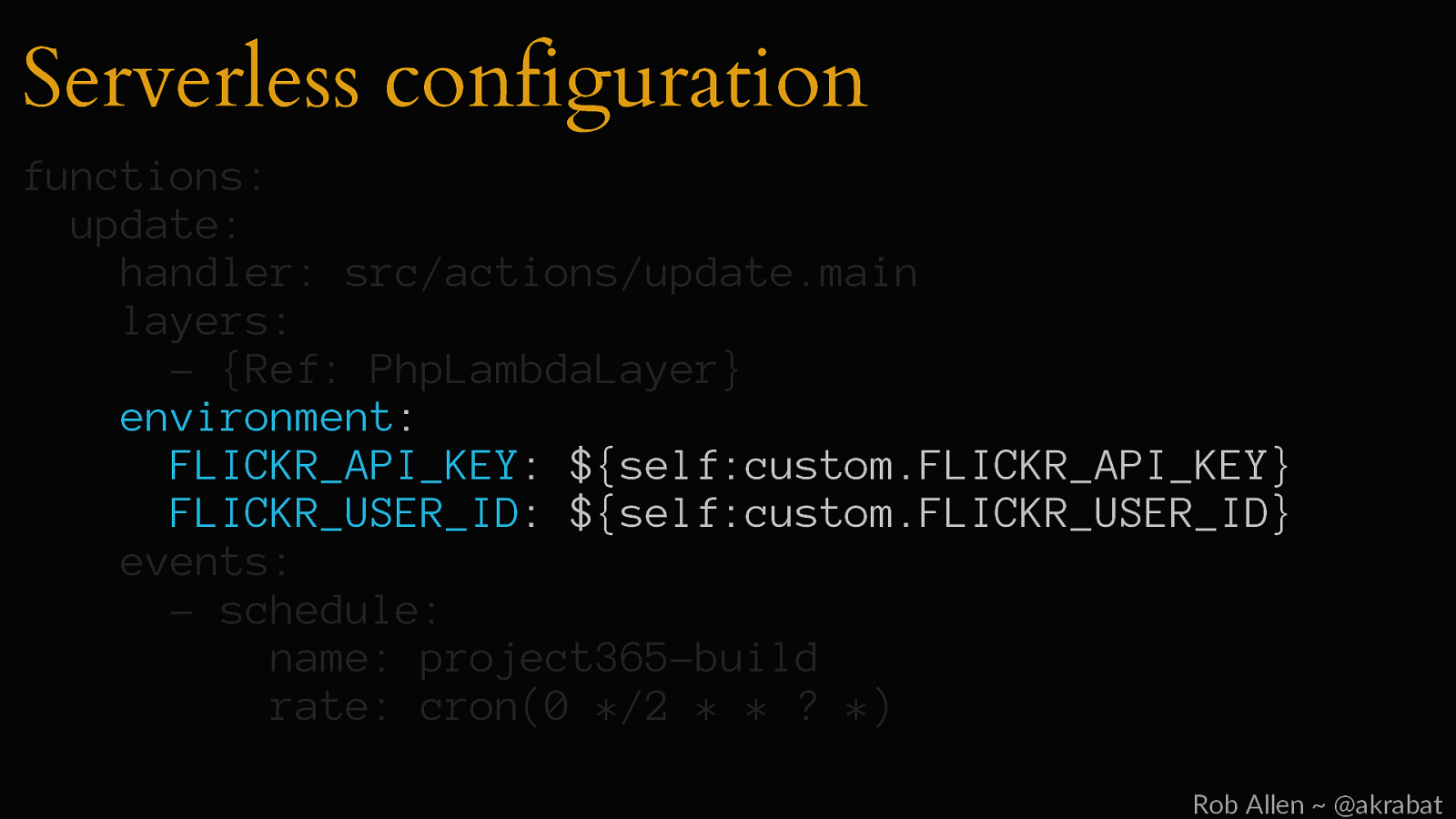
Serverless configuration functions: update: handler: src/actions/update.main layers: - {Ref: PhpLambdaLayer} environment: FLICKR_API_KEY: ${self:custom.FLICKR_API_KEY} FLICKR_USER_ID: ${self:custom.FLICKR_USER_ID} events: - schedule: name: project365-build rate: cron(0 */2 * * ? *) Rob Allen ~ @akrabat
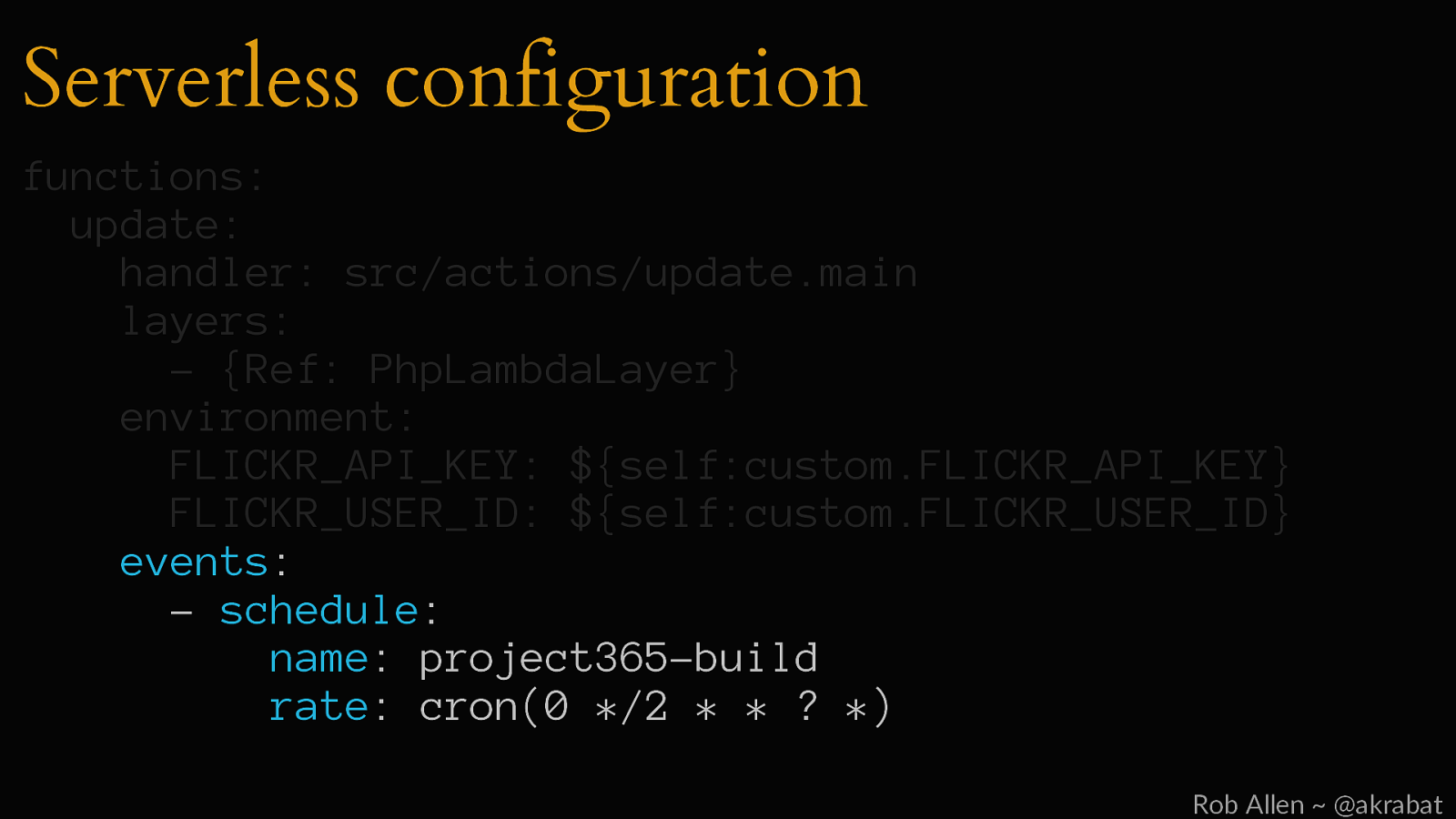
Serverless configuration functions: update: handler: src/actions/update.main layers: - {Ref: PhpLambdaLayer} environment: FLICKR_API_KEY: ${self:custom.FLICKR_API_KEY} FLICKR_USER_ID: ${self:custom.FLICKR_USER_ID} events: - schedule: name: project365-build rate: cron(0 */2 * * ? *) Rob Allen ~ @akrabat
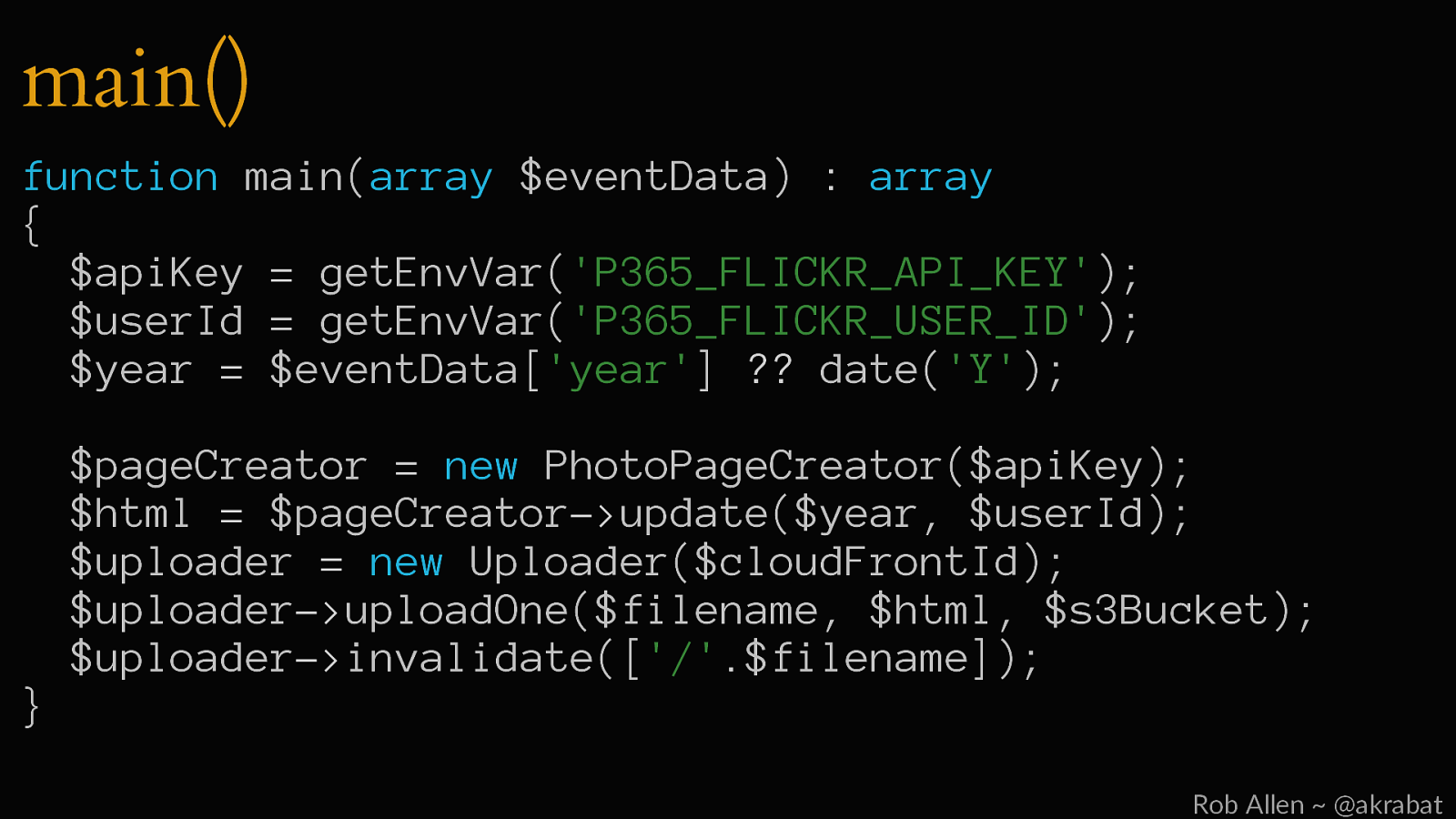
main() function main(array $eventData) : array { $apiKey = getEnvVar(‘P365_FLICKR_API_KEY’); $userId = getEnvVar(‘P365_FLICKR_USER_ID’); $year = $eventData[‘year’] ?? date(‘Y’); $pageCreator = new PhotoPageCreator($apiKey); $html = $pageCreator->update($year, $userId); $uploader = new Uploader($cloudFrontId); $uploader->uploadOne($filename, $html, $s3Bucket); $uploader->invalidate([‘/’.$filename]); } Rob Allen ~ @akrabat
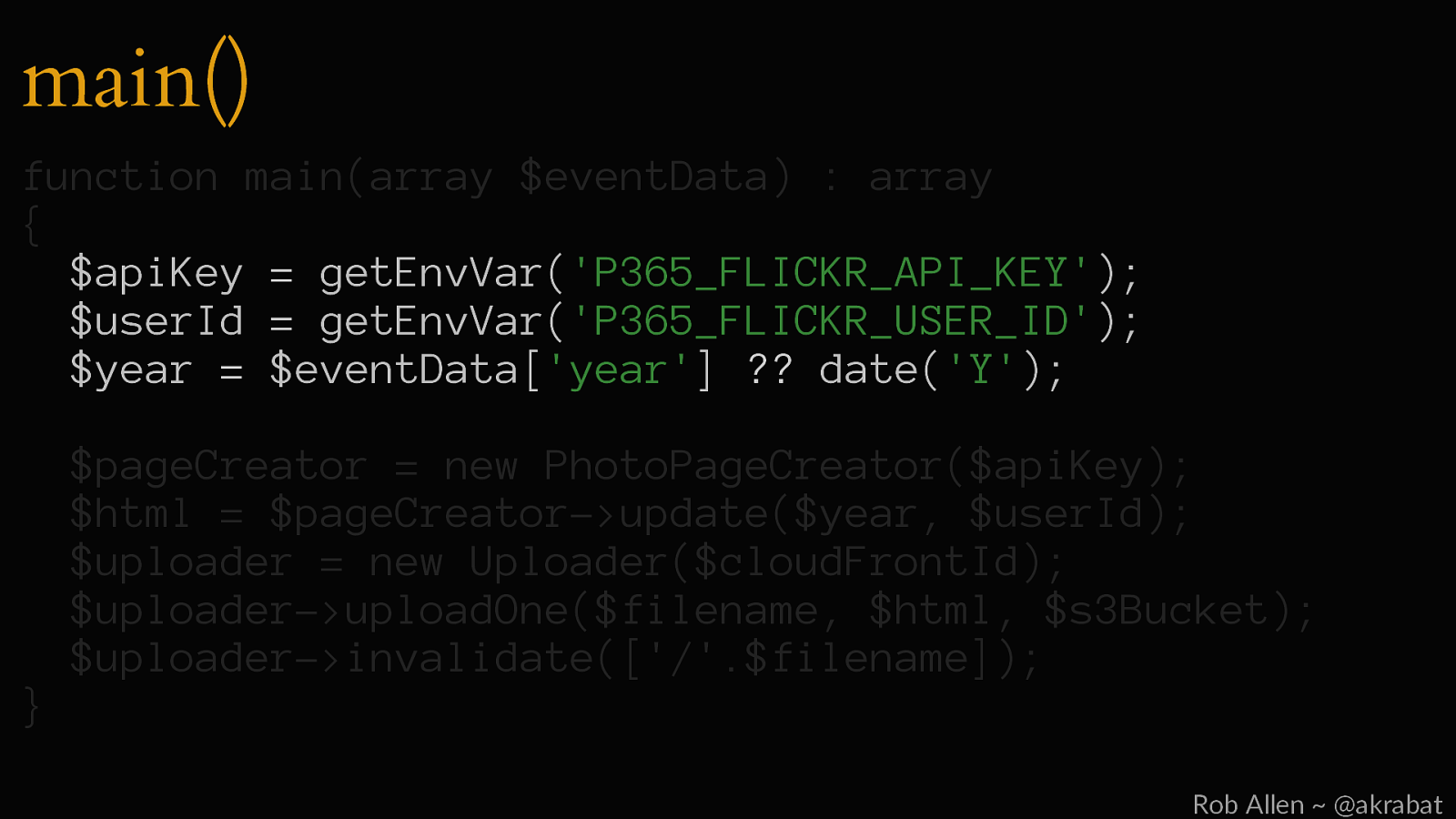
main() function main(array $eventData) : array { $apiKey = getEnvVar(‘P365_FLICKR_API_KEY’); $userId = getEnvVar(‘P365_FLICKR_USER_ID’); $year = $eventData[‘year’] ?? date(‘Y’); $pageCreator = new PhotoPageCreator($apiKey); $html = $pageCreator->update($year, $userId); $uploader = new Uploader($cloudFrontId); $uploader->uploadOne($filename, $html, $s3Bucket); $uploader->invalidate([‘/’.$filename]); } Rob Allen ~ @akrabat
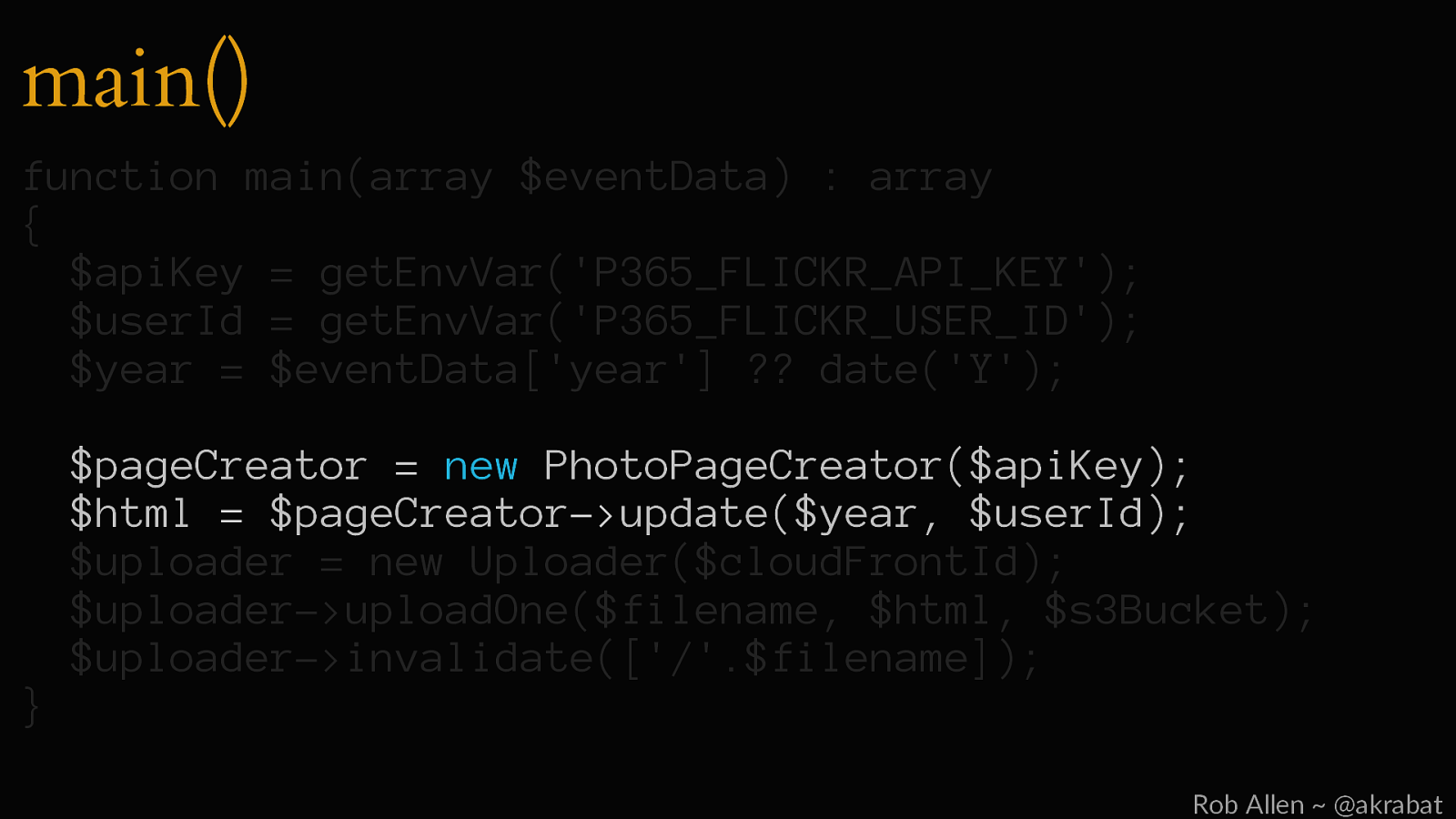
main() function main(array $eventData) : array { $apiKey = getEnvVar(‘P365_FLICKR_API_KEY’); $userId = getEnvVar(‘P365_FLICKR_USER_ID’); $year = $eventData[‘year’] ?? date(‘Y’); $pageCreator = new PhotoPageCreator($apiKey); $html = $pageCreator->update($year, $userId); $uploader = new Uploader($cloudFrontId); $uploader->uploadOne($filename, $html, $s3Bucket); $uploader->invalidate([‘/’.$filename]); } Rob Allen ~ @akrabat
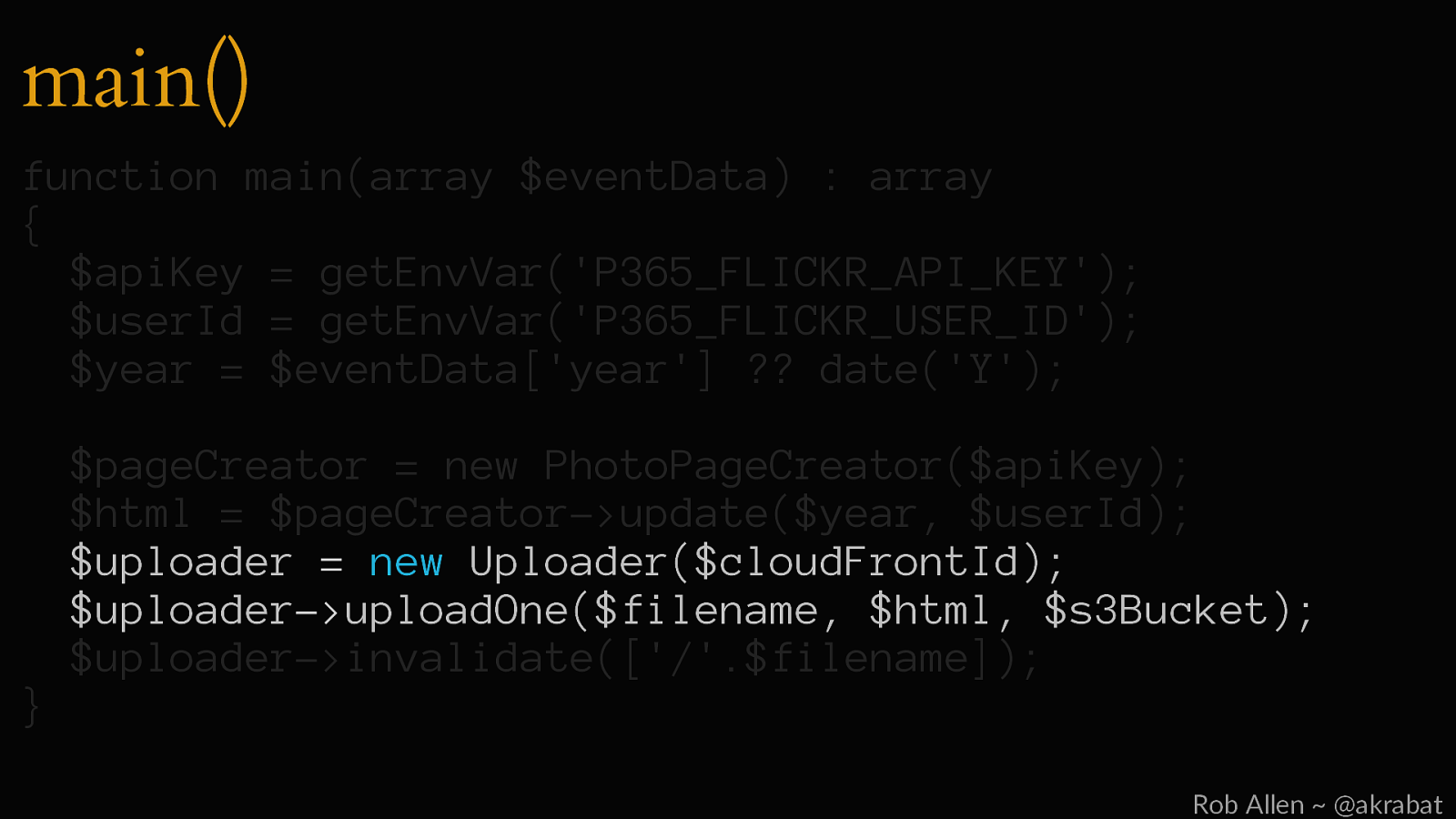
main() function main(array $eventData) : array { $apiKey = getEnvVar(‘P365_FLICKR_API_KEY’); $userId = getEnvVar(‘P365_FLICKR_USER_ID’); $year = $eventData[‘year’] ?? date(‘Y’); $pageCreator = new PhotoPageCreator($apiKey); $html = $pageCreator->update($year, $userId); $uploader = new Uploader($cloudFrontId); $uploader->uploadOne($filename, $html, $s3Bucket); $uploader->invalidate([‘/’.$filename]); } Rob Allen ~ @akrabat
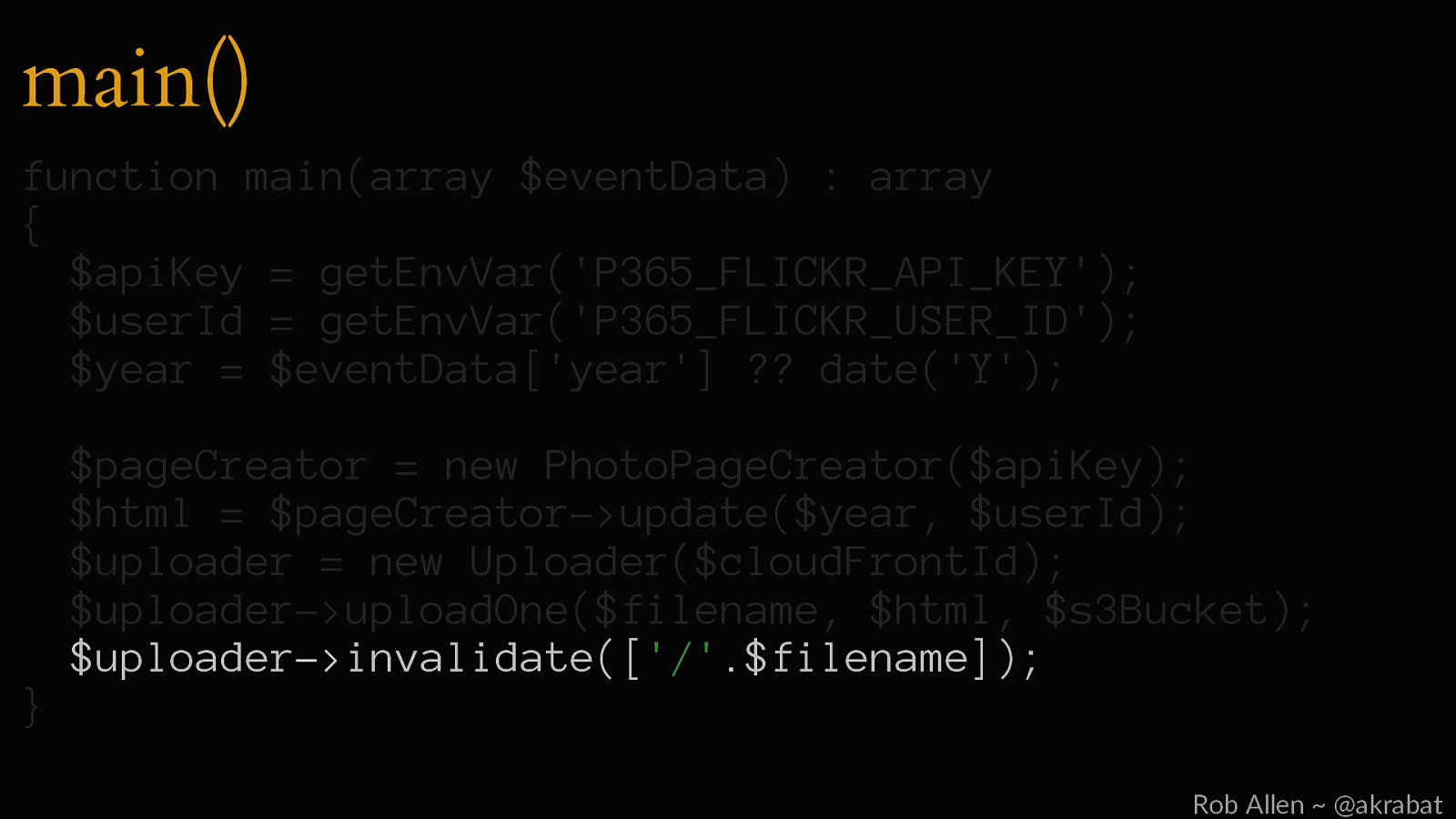
main() function main(array $eventData) : array { $apiKey = getEnvVar(‘P365_FLICKR_API_KEY’); $userId = getEnvVar(‘P365_FLICKR_USER_ID’); $year = $eventData[‘year’] ?? date(‘Y’); $pageCreator = new PhotoPageCreator($apiKey); $html = $pageCreator->update($year, $userId); $uploader = new Uploader($cloudFrontId); $uploader->uploadOne($filename, $html, $s3Bucket); $uploader->invalidate([‘/’.$filename]); } Rob Allen ~ @akrabat
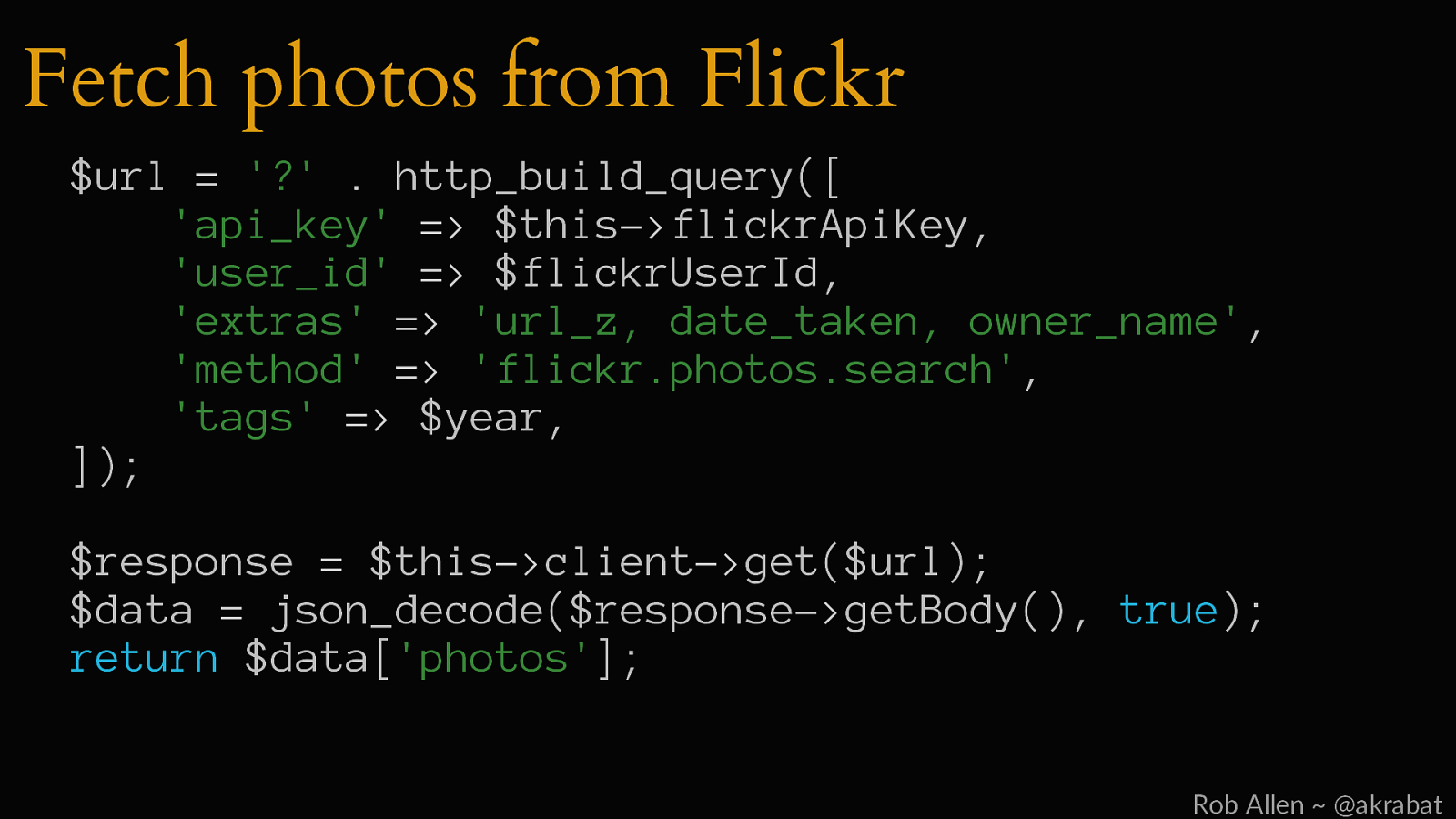
Fetch photos from Flickr $url = ‘?’ . http_build_query([ ‘api_key’ => $this->flickrApiKey, ‘user_id’ => $flickrUserId, ‘extras’ => ‘url_z, date_taken, owner_name’, ‘method’ => ‘flickr.photos.search’, ‘tags’ => $year, ]); $response = $this->client->get($url); $data = json_decode($response->getBody(), true); return $data[‘photos’]; Rob Allen ~ @akrabat
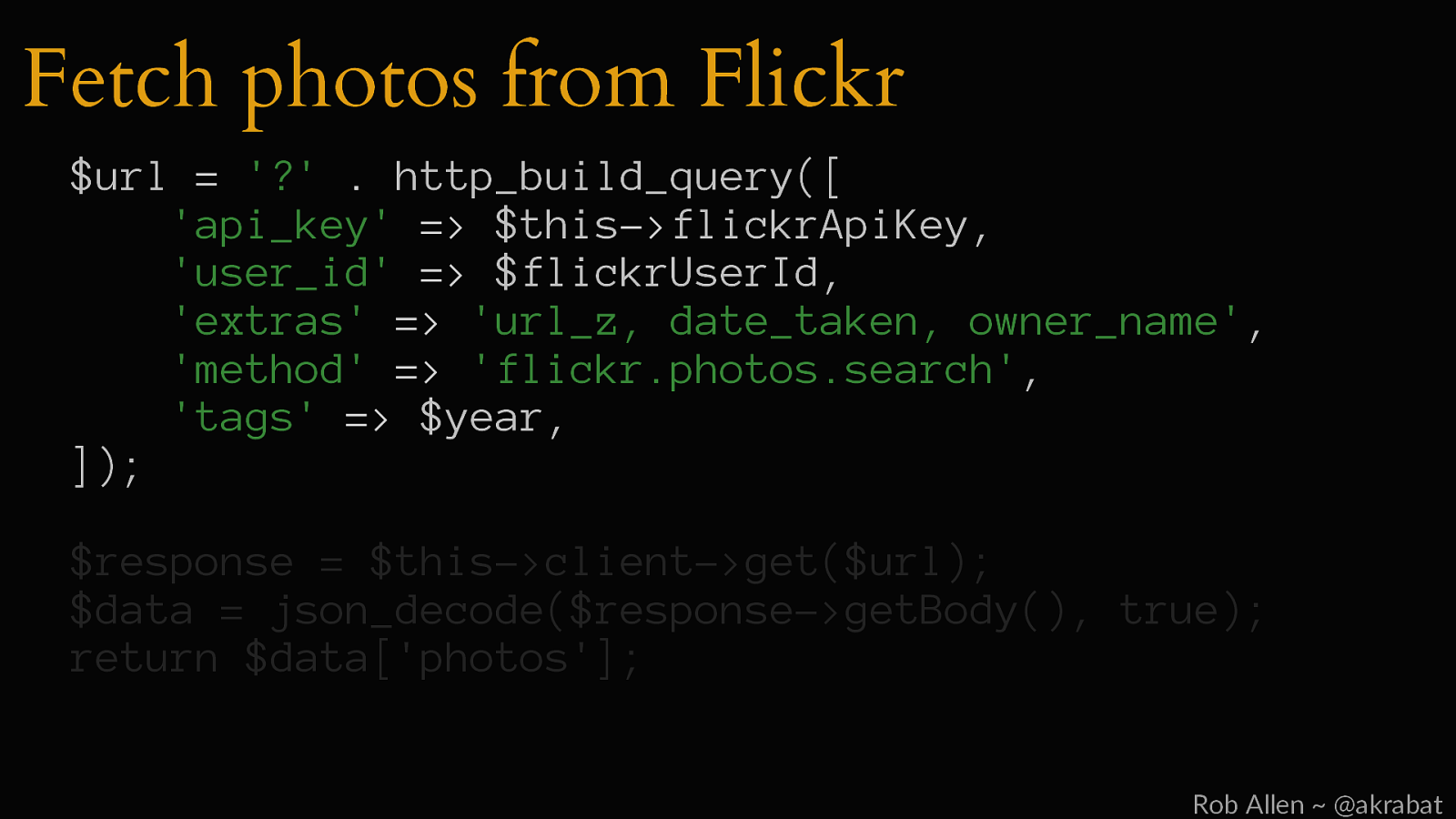
Fetch photos from Flickr $url = ‘?’ . http_build_query([ ‘api_key’ => $this->flickrApiKey, ‘user_id’ => $flickrUserId, ‘extras’ => ‘url_z, date_taken, owner_name’, ‘method’ => ‘flickr.photos.search’, ‘tags’ => $year, ]); $response = $this->client->get($url); $data = json_decode($response->getBody(), true); return $data[‘photos’]; Rob Allen ~ @akrabat
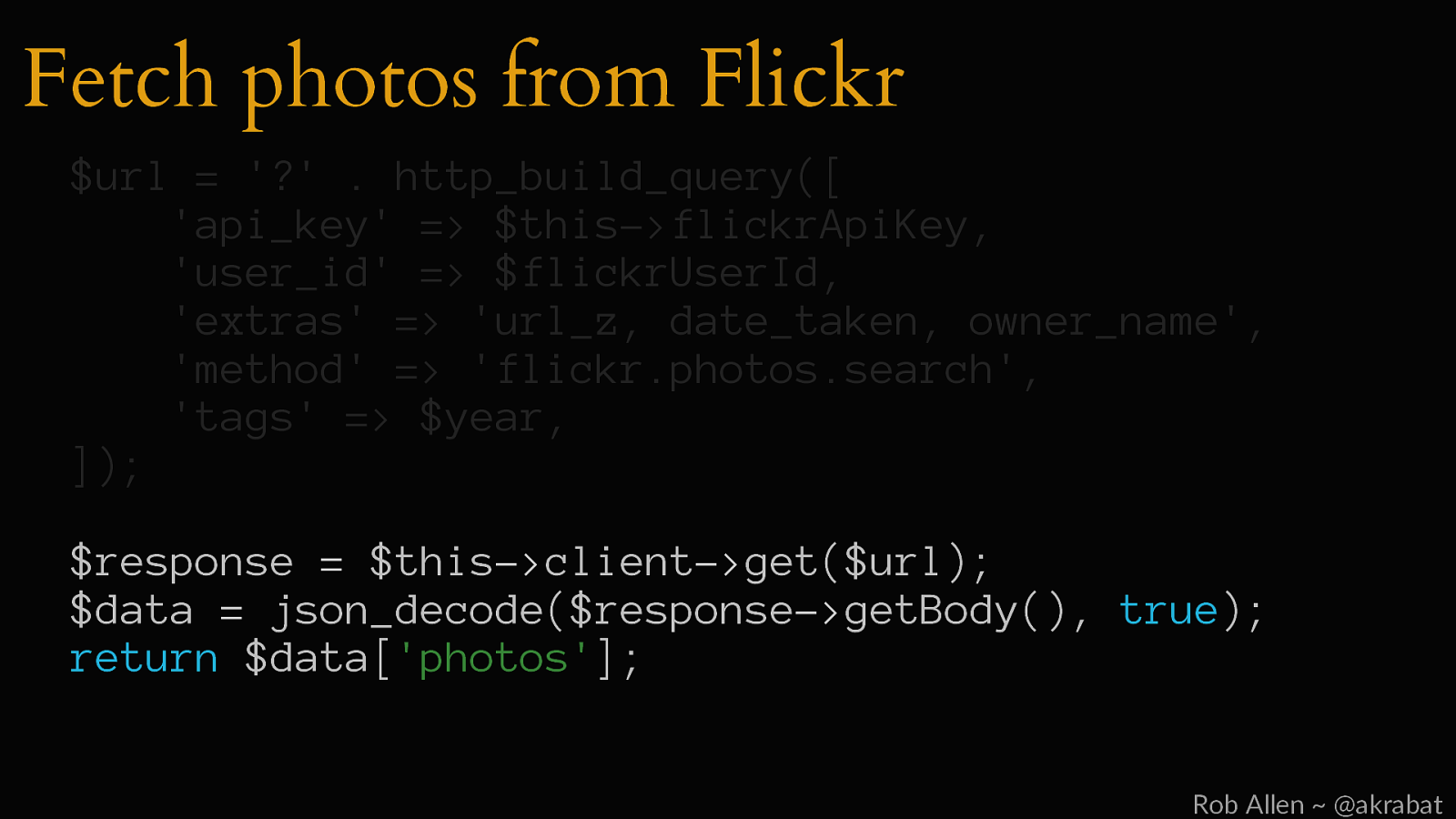
Fetch photos from Flickr $url = ‘?’ . http_build_query([ ‘api_key’ => $this->flickrApiKey, ‘user_id’ => $flickrUserId, ‘extras’ => ‘url_z, date_taken, owner_name’, ‘method’ => ‘flickr.photos.search’, ‘tags’ => $year, ]); $response = $this->client->get($url); $data = json_decode($response->getBody(), true); return $data[‘photos’]; Rob Allen ~ @akrabat
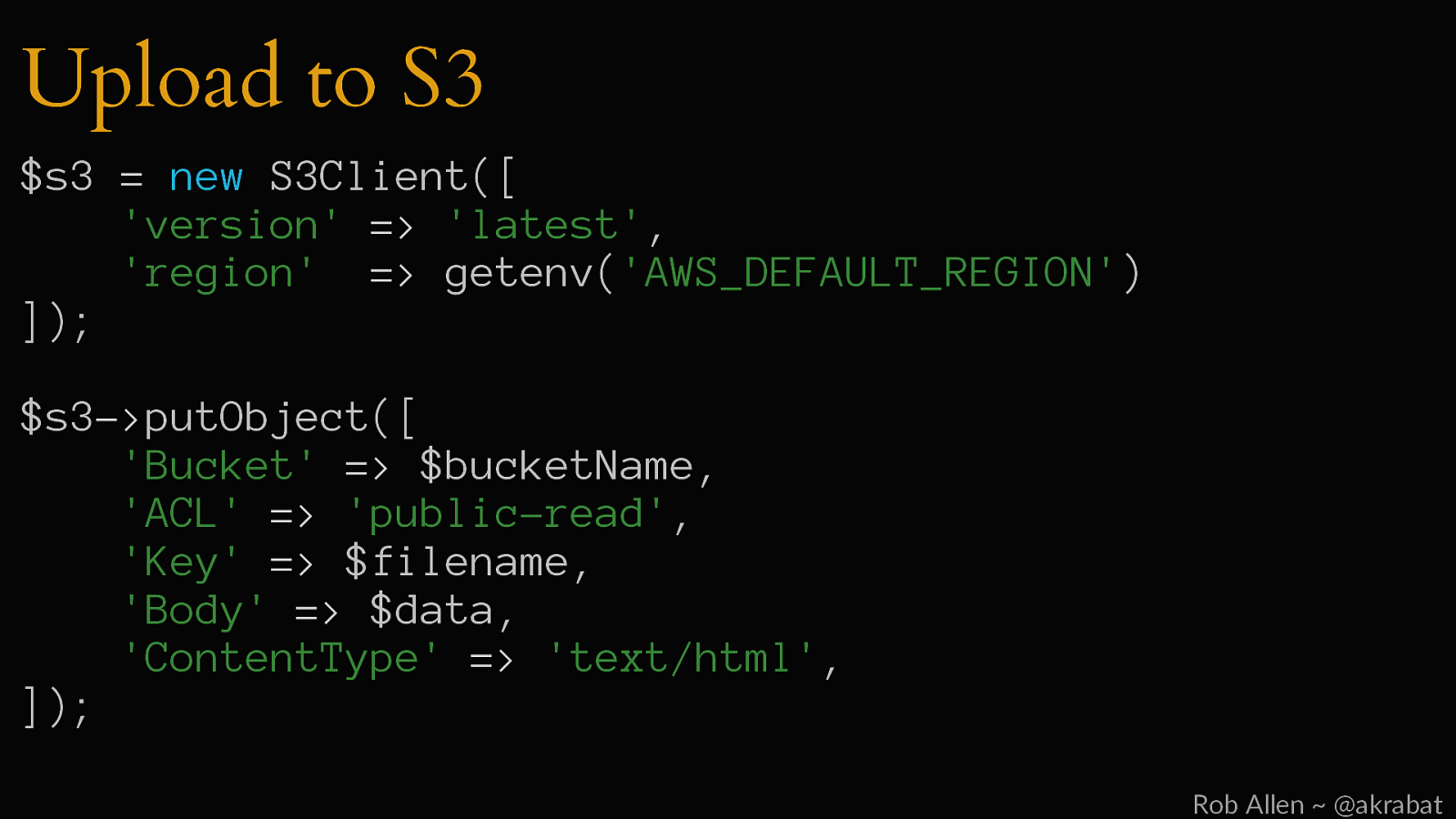
Upload to S3 $s3 = new S3Client([ ‘version’ => ‘latest’, ‘region’ => getenv(‘AWS_DEFAULT_REGION’) ]); $s3->putObject([ ‘Bucket’ => $bucketName, ‘ACL’ => ‘public-read’, ‘Key’ => $filename, ‘Body’ => $data, ‘ContentType’ => ‘text/html’, ]); Rob Allen ~ @akrabat
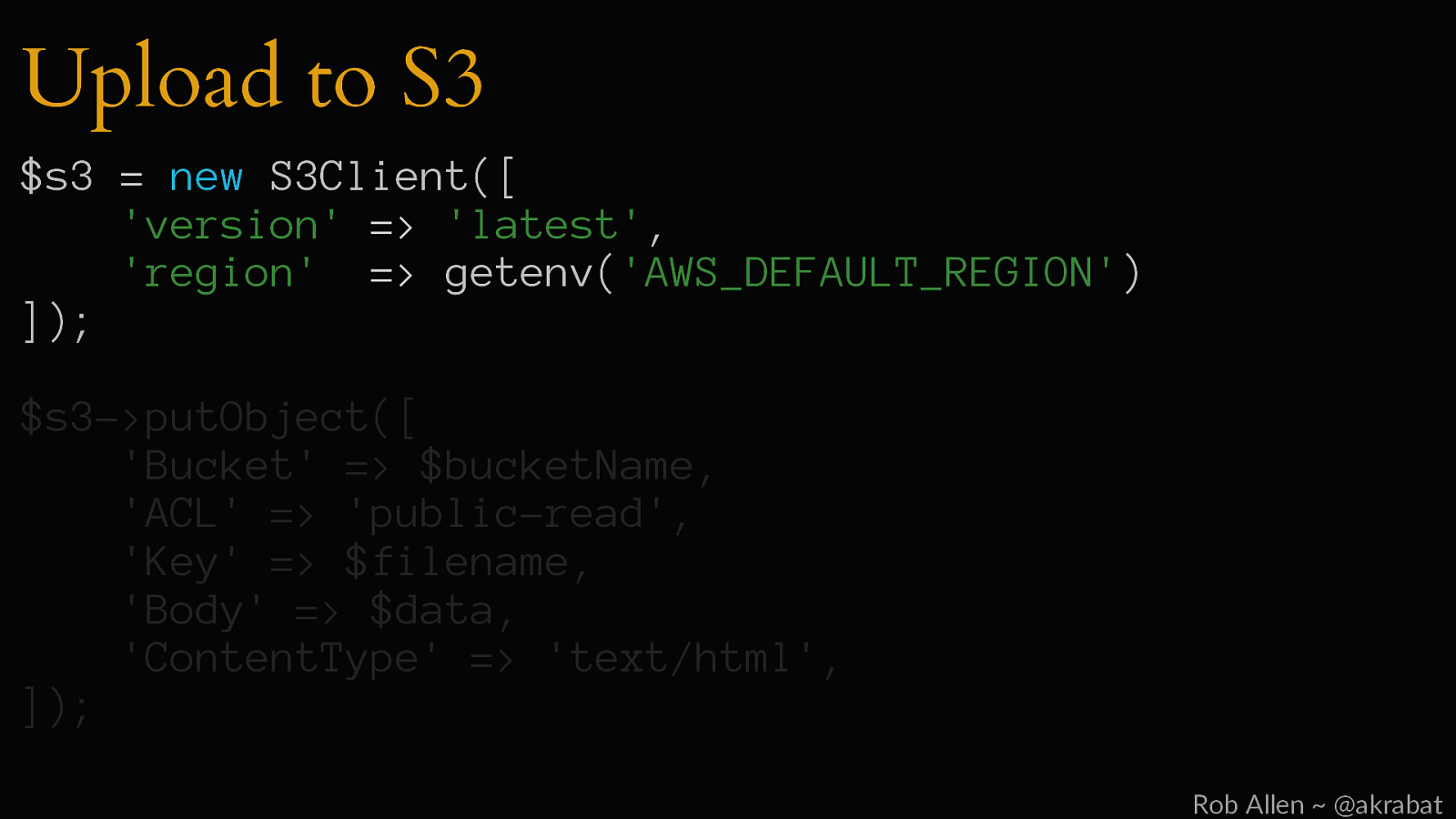
Upload to S3 $s3 = new S3Client([ ‘version’ => ‘latest’, ‘region’ => getenv(‘AWS_DEFAULT_REGION’) ]); $s3->putObject([ ‘Bucket’ => $bucketName, ‘ACL’ => ‘public-read’, ‘Key’ => $filename, ‘Body’ => $data, ‘ContentType’ => ‘text/html’, ]); Rob Allen ~ @akrabat
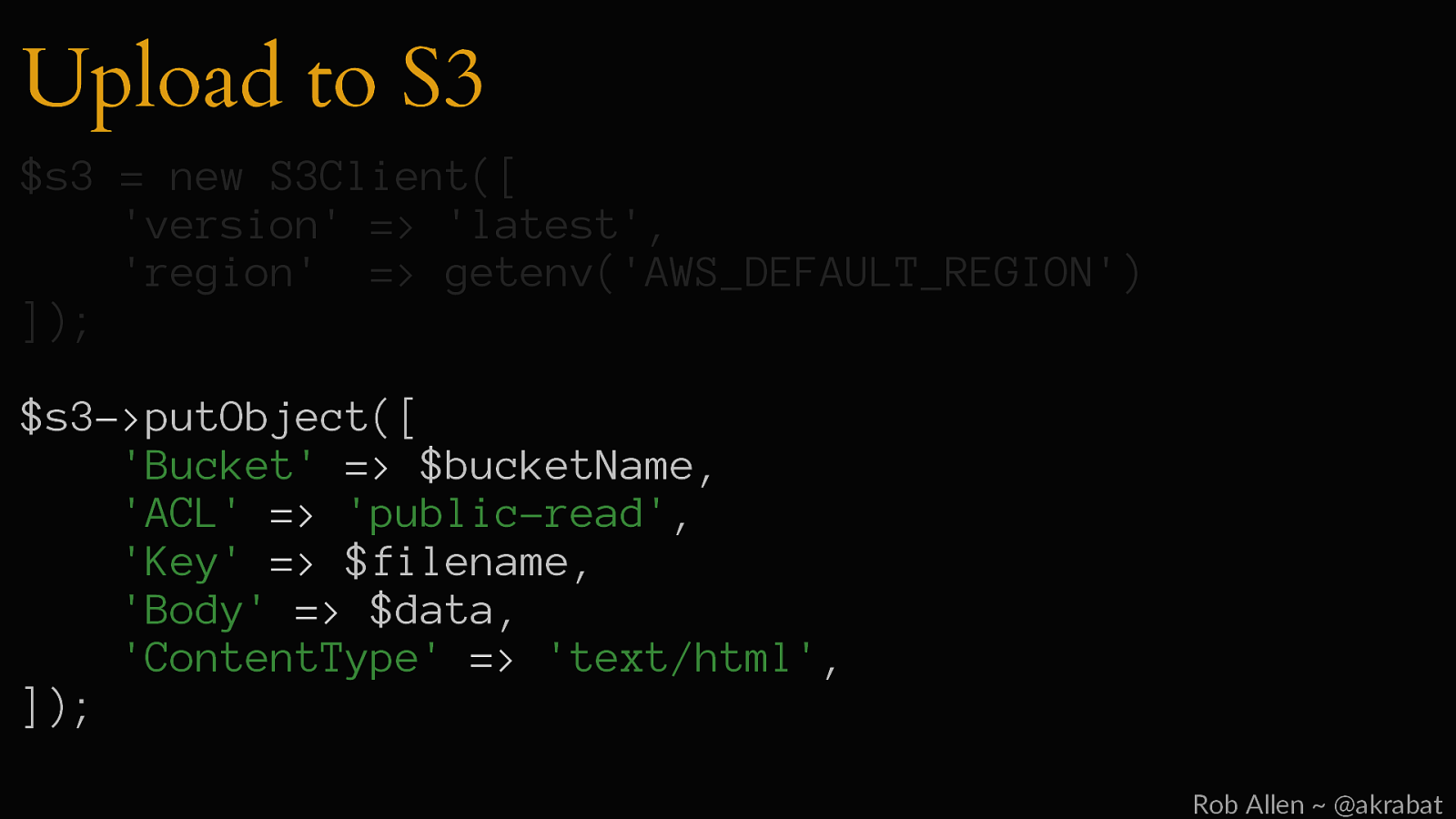
Upload to S3 $s3 = new S3Client([ ‘version’ => ‘latest’, ‘region’ => getenv(‘AWS_DEFAULT_REGION’) ]); $s3->putObject([ ‘Bucket’ => $bucketName, ‘ACL’ => ‘public-read’, ‘Key’ => $filename, ‘Body’ => $data, ‘ContentType’ => ‘text/html’, ]); Rob Allen ~ @akrabat
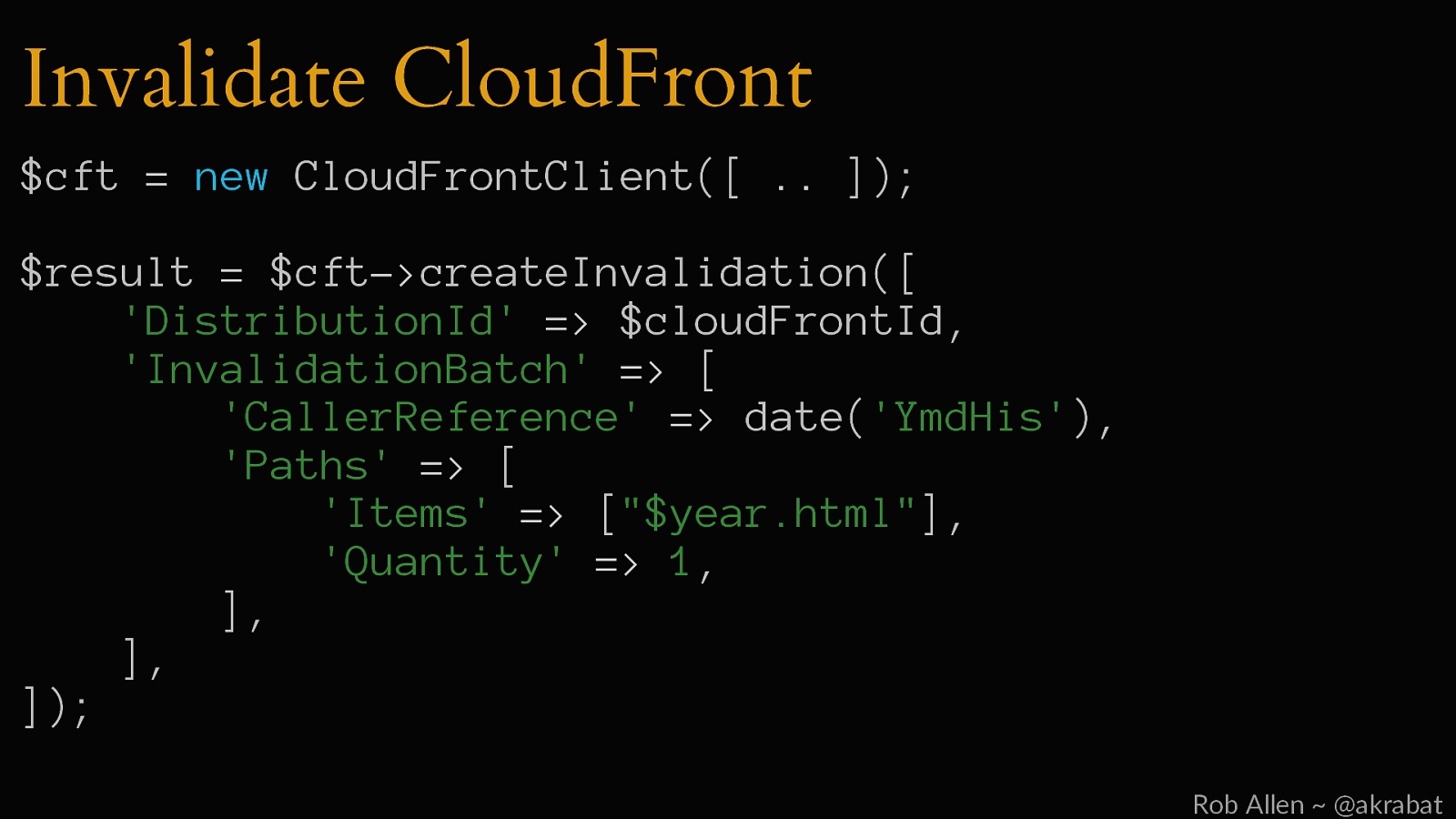
Invalidate CloudFront $cft = new CloudFrontClient([ .. ]); $result = $cft->createInvalidation([ ‘DistributionId’ => $cloudFrontId, ‘InvalidationBatch’ => [ ‘CallerReference’ => date(‘YmdHis’), ‘Paths’ => [ ‘Items’ => [“$year.html”], ‘Quantity’ => 1, ], ], ]); Rob Allen ~ @akrabat
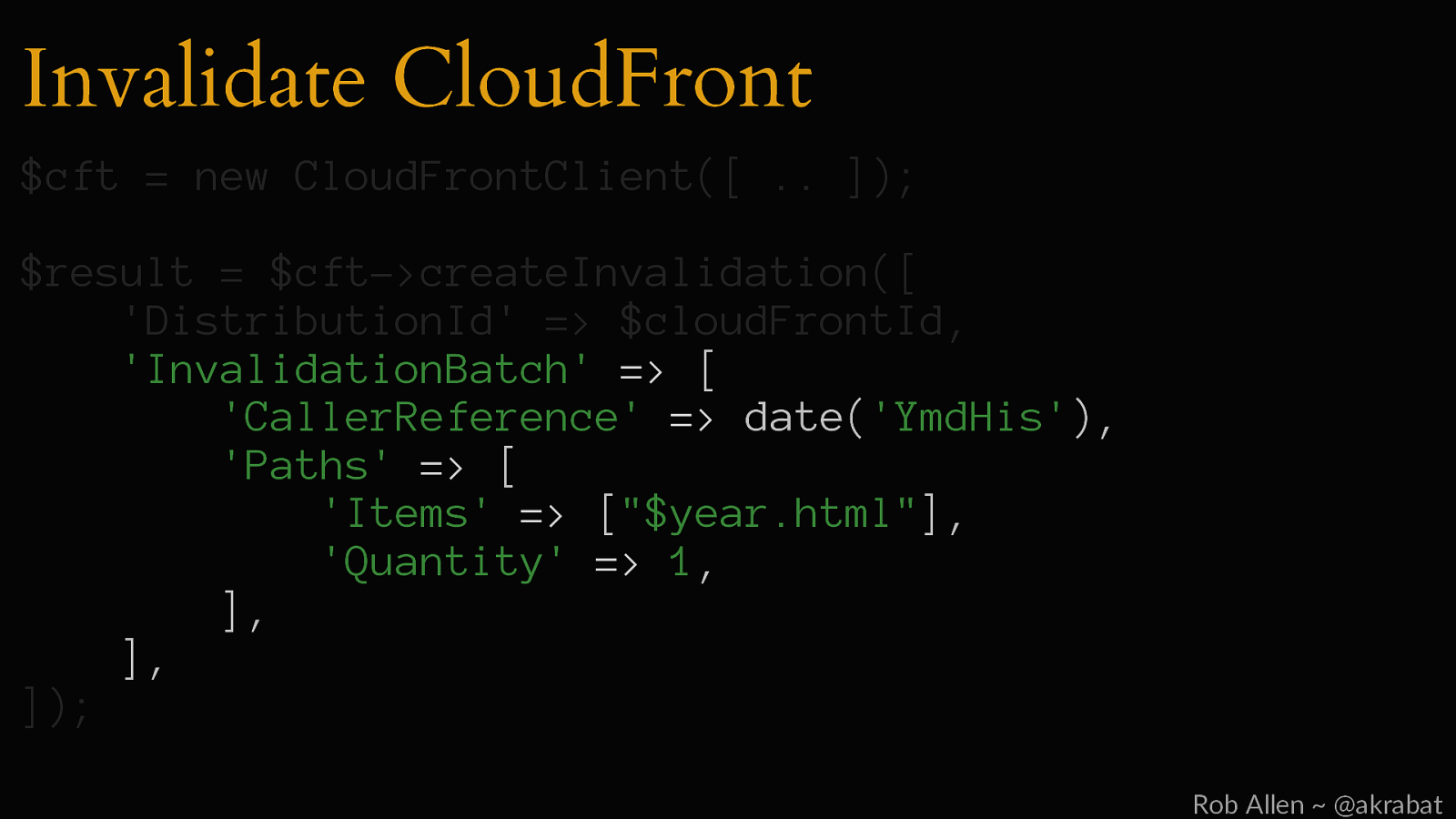
Invalidate CloudFront $cft = new CloudFrontClient([ .. ]); $result = $cft->createInvalidation([ ‘DistributionId’ => $cloudFrontId, ‘InvalidationBatch’ => [ ‘CallerReference’ => date(‘YmdHis’), ‘Paths’ => [ ‘Items’ => [“$year.html”], ‘Quantity’ => 1, ], ], ]); Rob Allen ~ @akrabat
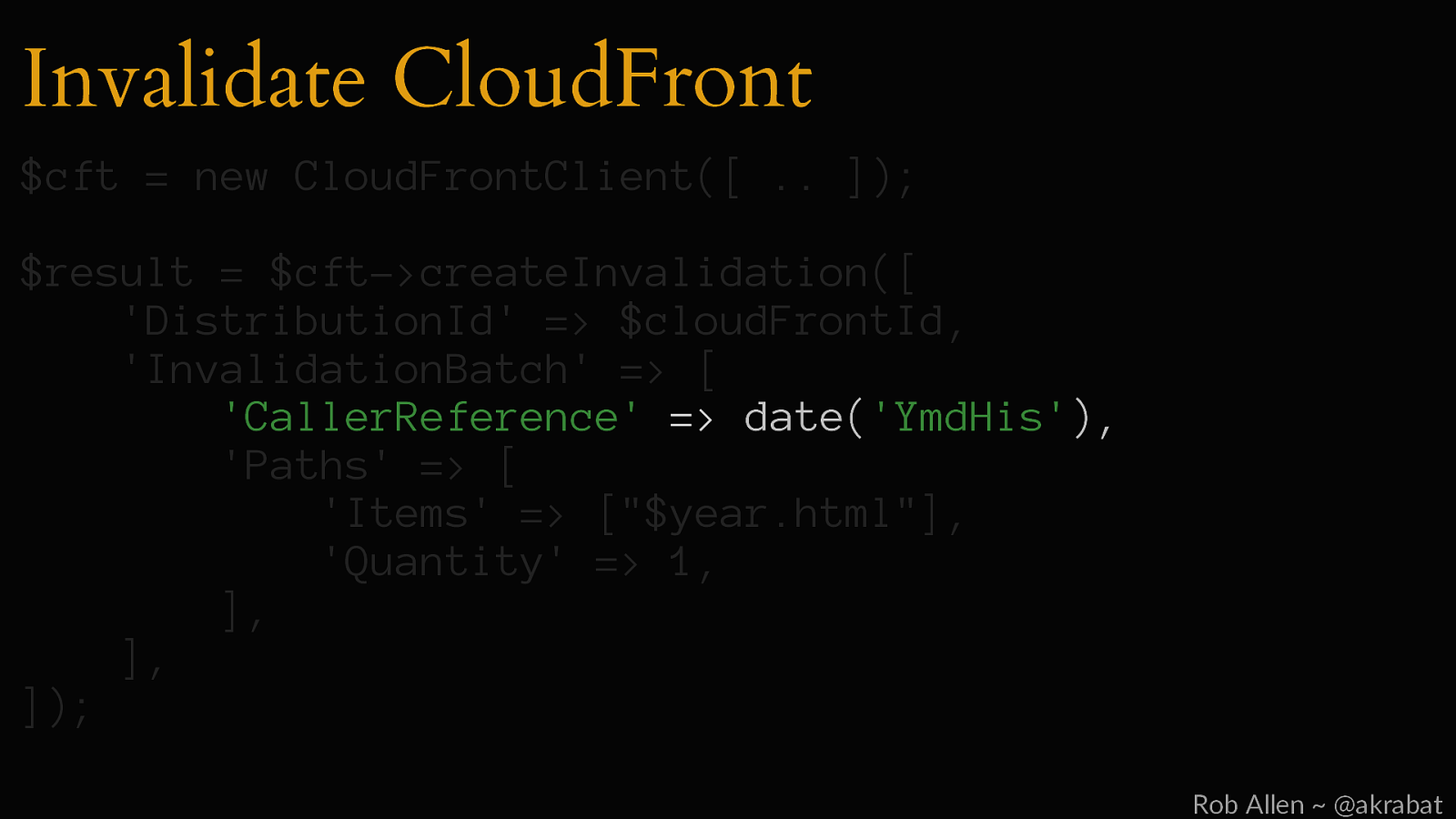
Invalidate CloudFront $cft = new CloudFrontClient([ .. ]); $result = $cft->createInvalidation([ ‘DistributionId’ => $cloudFrontId, ‘InvalidationBatch’ => [ ‘CallerReference’ => date(‘YmdHis’), ‘Paths’ => [ ‘Items’ => [“$year.html”], ‘Quantity’ => 1, ], ], ]); Rob Allen ~ @akrabat
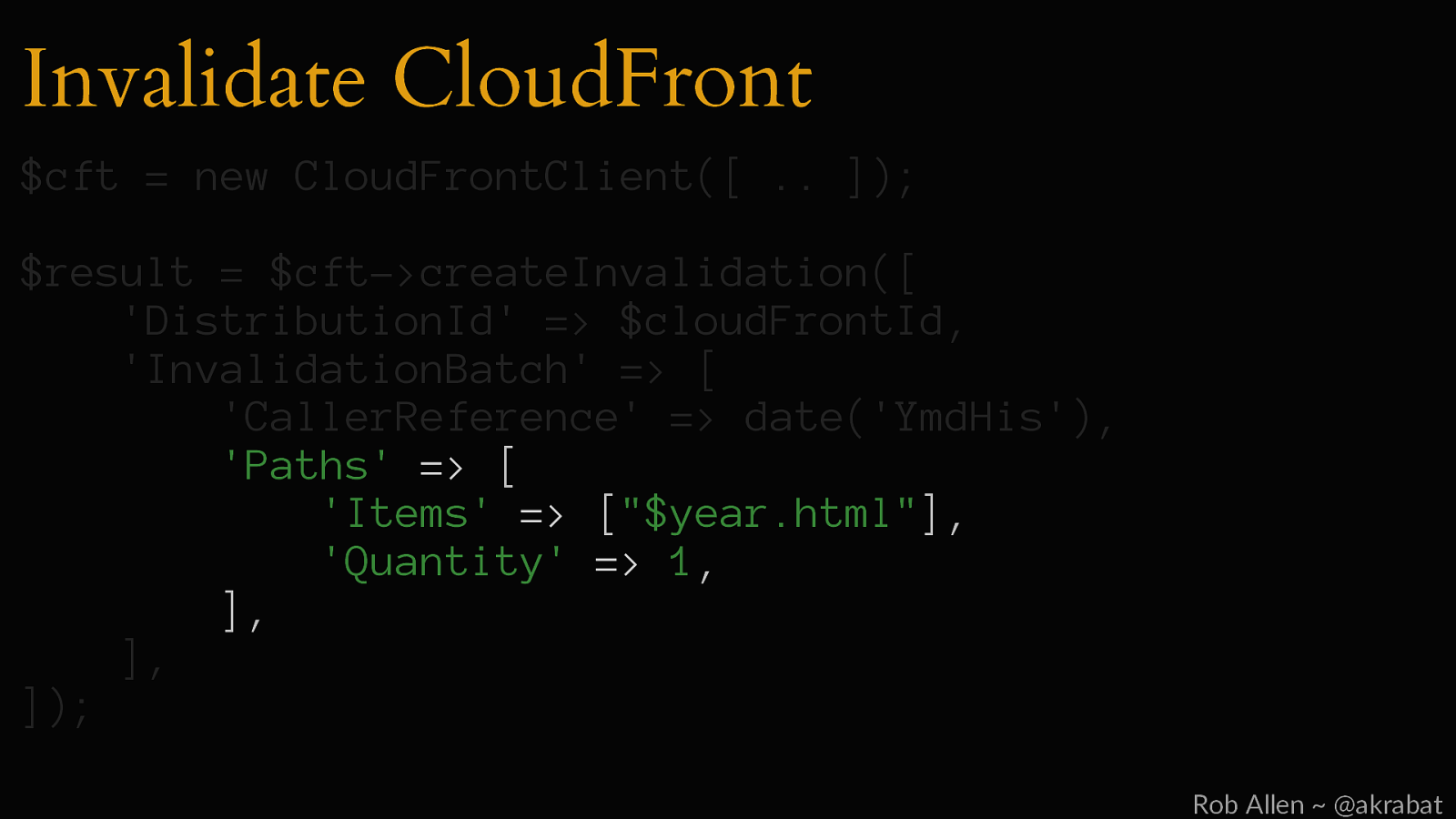
Invalidate CloudFront $cft = new CloudFrontClient([ .. ]); $result = $cft->createInvalidation([ ‘DistributionId’ => $cloudFrontId, ‘InvalidationBatch’ => [ ‘CallerReference’ => date(‘YmdHis’), ‘Paths’ => [ ‘Items’ => [“$year.html”], ‘Quantity’ => 1, ], ], ]); Rob Allen ~ @akrabat
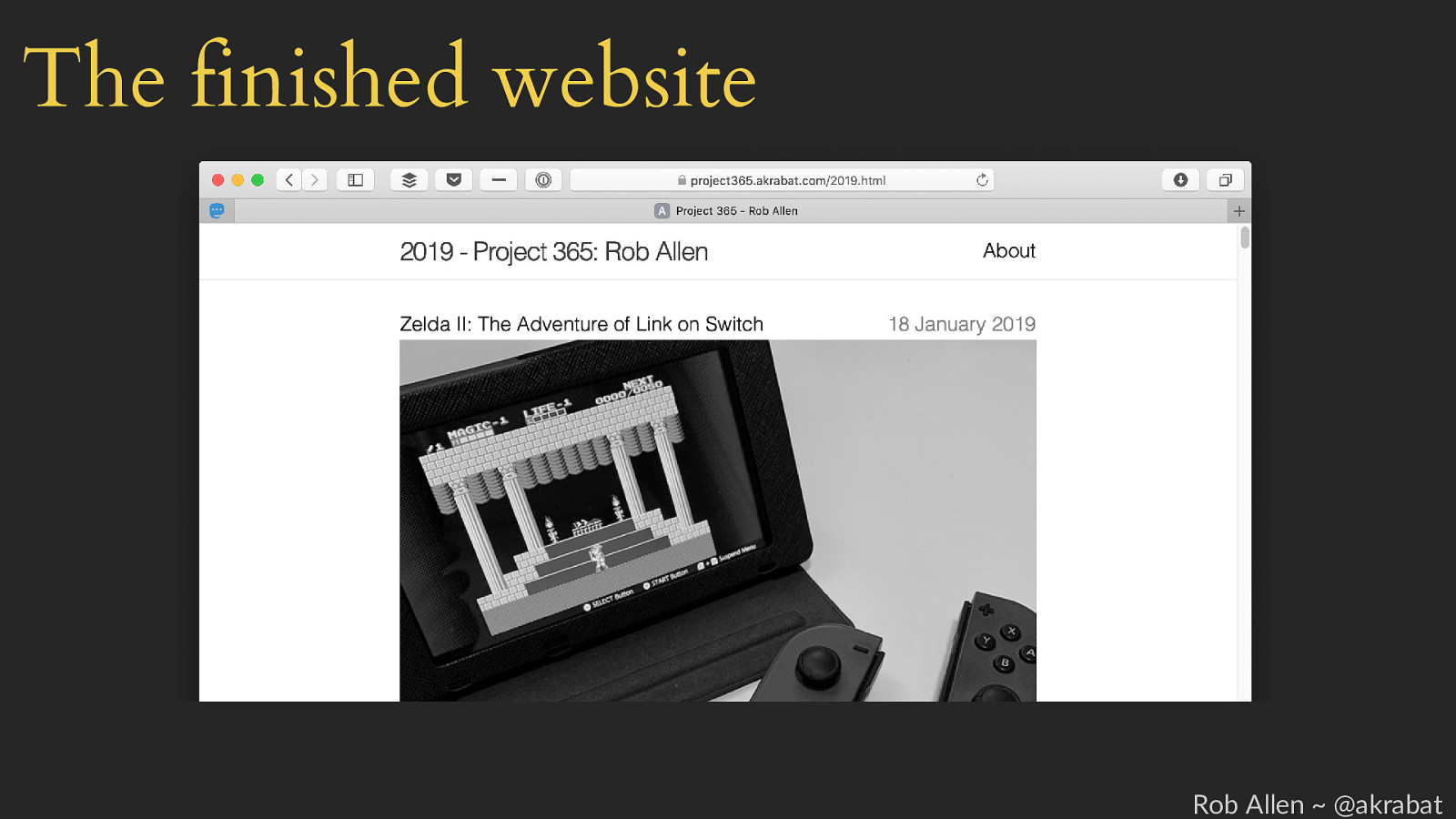
The finished website Rob Allen ~ @akrabat

To sum up Rob Allen ~ @akrabat
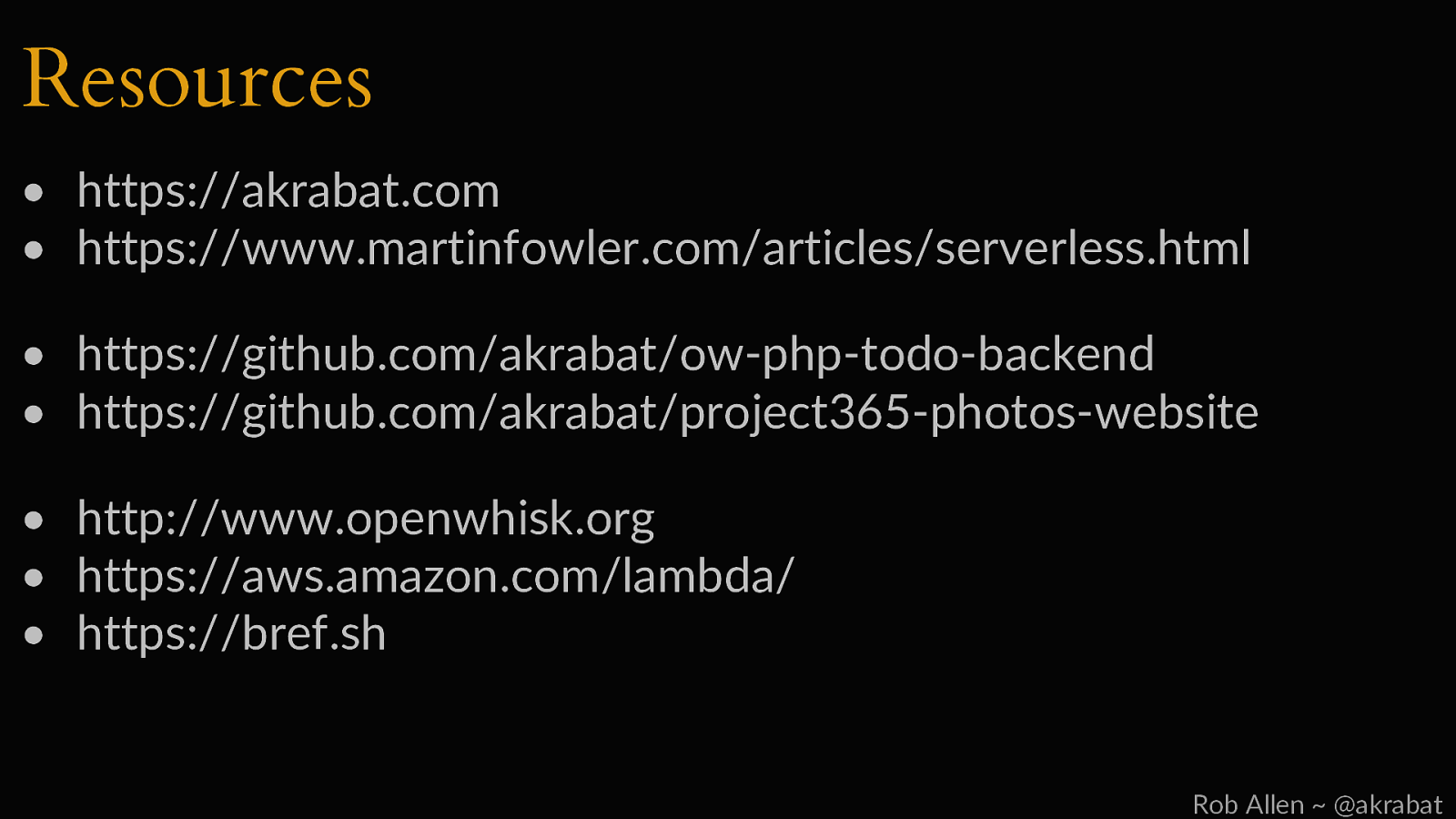
Resources • https://akrabat.com • https://www.martinfowler.com/articles/serverless.html • https://github.com/akrabat/ow-php-todo-backend • https://github.com/akrabat/project365-photos-website • http://www.openwhisk.org • https://aws.amazon.com/lambda/ • https://bref.sh Rob Allen ~ @akrabat
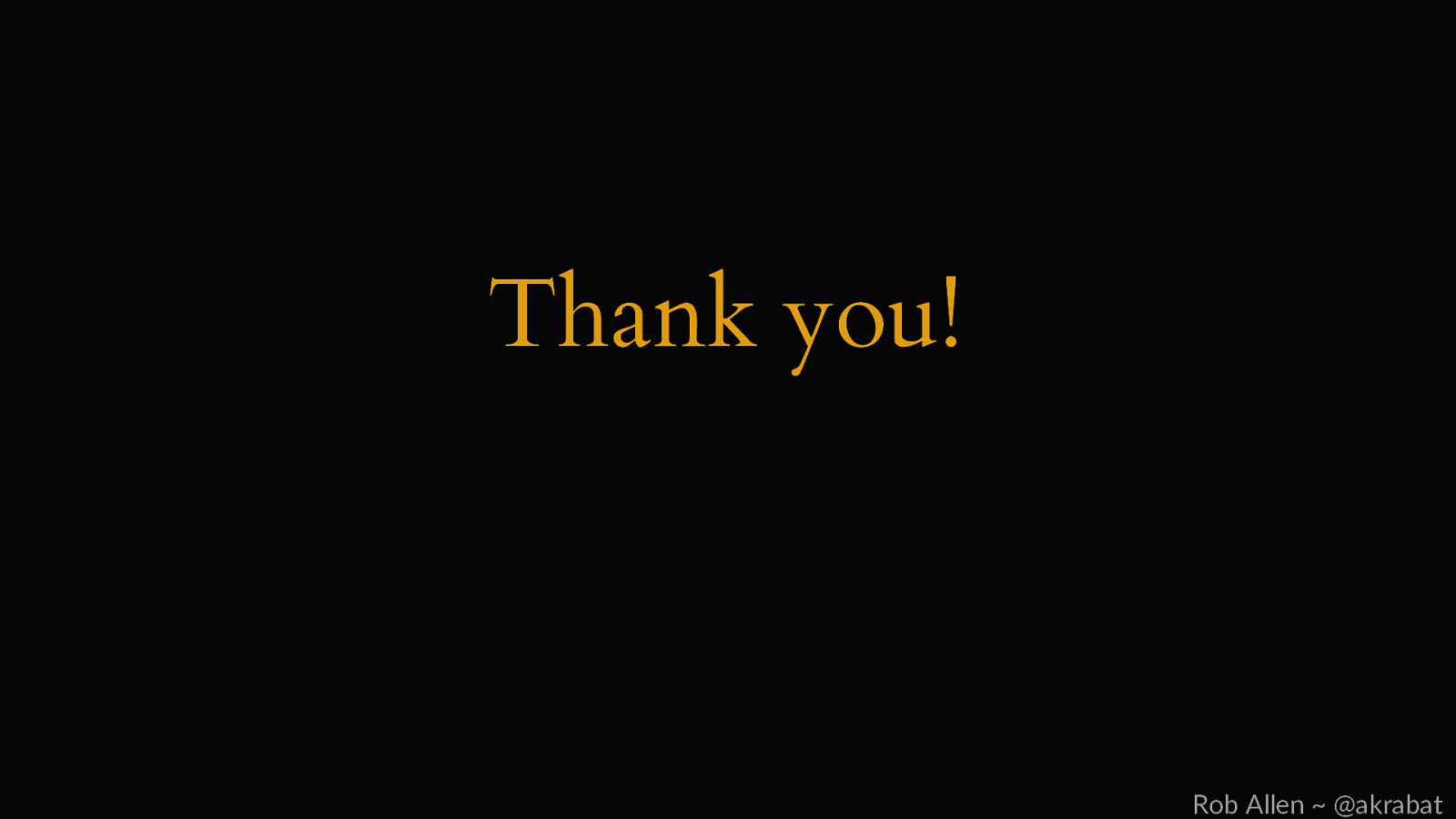
Thank you! Rob Allen ~ @akrabat
APIs and microservices are how we build modern web applications and serverless technologies make this easy. This session will show you how serverless applications are built and how you can leverage your PHP skills to build APIs of all shapes and sizes. We will cover how to use your current knowledge to build applications in PHP within Apache OpenWhisk or AWS Lambda, leveraging the API Gateway to build robust APIs quickly and easily. By the end of the session, you’ll be well placed to design and build your own microservices that take full advantage of the power of serverless technologies.
